Nexus9000v で VxLAN+EVPN (anycast gateway 編) Appendix. IPv6エンドノード通信確認
最初に
やること/サマリ
タイトルの通り、前回記事のオマケ
- 前回の記事 Nexus9000v で VxLAN+EVPN (anycast gateway 編) で除外していた「エンドノードおよび anycast gateway が IPv6」の設定と動作確認
- 結果から言うと IPv4 の場合と何ら変わらず
構成
前回の構成 と一緒で、以下のように IPv6 セグメントを足します。

参考資料
- 前回の参考資料全般
- Cisco 公式 / Cisco Programmable Fabric with VXLAN BGP EVPN Configuration Guide / Chapter: Unicast Forwarding
IPv6 address handling in the VXLAN BGP EVPN fabricの項目
前回までの Nexus9000v 設定
スタート時点の設定として、関係個所のみ show run 結果をペタリ
- torsw101a
version 7.0(3)I6(1)
hostname torsw101a
nv overlay evpn
feature ospf
feature bgp
feature interface-vlan
feature vn-segment-vlan-based
feature lldp
clock timezone JST 9 0
feature nv overlay
vlan 1,100,300,3901
fabric forwarding anycast-gateway-mac 2020.0000.00aa
vlan 100
vn-segment 10100
vlan 300
vn-segment 10300
vlan 3901
vn-segment 50001
vrf context VRF001
vni 50001
rd auto
address-family ipv4 unicast
route-target both auto
route-target both auto evpn
vrf context management
interface Vlan1
interface Vlan100
no shutdown
vrf member VRF001
no ip redirects
ip address 192.168.1.254/24
fabric forwarding mode anycast-gateway
interface Vlan300
no shutdown
vrf member VRF001
no ip redirects
ip address 192.168.3.254/24
fabric forwarding mode anycast-gateway
interface Vlan3901
no shutdown
vrf member VRF001
ip forward
interface nve1
no shutdown
source-interface loopback1
host-reachability protocol bgp
member vni 10001-10300
ingress-replication protocol bgp
member vni 50001 associate-vrf
interface Ethernet1/1
description DEV=node11 IF=ens4
switchport access vlan 100
interface Ethernet1/2
description DEV=node13 IF=ens4
switchport access vlan 300
interface Ethernet1/8
description DEV=spine001 IF=Eth1/1
no switchport
mtu 9216
ip address 192.0.2.1/31
ip ospf network point-to-point
ip router ospf OSPF_UNDERLAY area 0.0.0.0
no shutdown
interface loopback0
ip address 172.16.1.1/32
ip router ospf OSPF_UNDERLAY area 0.0.0.0
interface loopback1
ip address 198.18.1.11/32
ip router ospf OSPF_UNDERLAY area 0.0.0.0
router ospf OSPF_UNDERLAY
router-id 172.16.1.1
router bgp 64512
neighbor 172.31.0.1
remote-as 64512
update-source loopback0
address-family l2vpn evpn
send-community
send-community extended
vrf VRF001
address-family ipv4 unicast
advertise l2vpn evpn
evpn
vni 10100 l2
rd auto
route-target import auto
route-target export auto
vni 10300 l2
rd auto
route-target import auto
route-target export auto
- torsw201a
version 7.0(3)I6(1)
hostname torsw201a
nv overlay evpn
feature ospf
feature bgp
feature interface-vlan
feature vn-segment-vlan-based
feature lldp
clock timezone JST 9 0
feature nv overlay
vlan 1,100,200,3901
fabric forwarding anycast-gateway-mac 2020.0000.00aa
vlan 100
vn-segment 10100
vlan 200
vn-segment 10200
vlan 3901
vn-segment 50001
vrf context VRF001
vni 50001
rd auto
address-family ipv4 unicast
route-target both auto
route-target both auto evpn
vrf context management
interface Vlan1
interface Vlan100
no shutdown
vrf member VRF001
no ip redirects
ip address 192.168.1.254/24
fabric forwarding mode anycast-gateway
interface Vlan200
no shutdown
vrf member VRF001
no ip redirects
ip address 192.168.2.254/24
fabric forwarding mode anycast-gateway
interface Vlan3901
no shutdown
vrf member VRF001
ip forward
interface nve1
no shutdown
source-interface loopback1
host-reachability protocol bgp
member vni 10001-10300
ingress-replication protocol bgp
member vni 50001 associate-vrf
interface Ethernet1/1
description DEV=node21 IF=ens4
switchport access vlan 100
interface Ethernet1/2
description DEV=node22 IF=ens4
switchport access vlan 200
interface Ethernet1/8
description DEV=spine001 IF=Eth1/2
no switchport
mtu 9216
ip address 192.0.2.3/31
ip ospf network point-to-point
ip router ospf OSPF_UNDERLAY area 0.0.0.0
no shutdown
interface loopback0
ip address 172.16.2.1/32
ip router ospf OSPF_UNDERLAY area 0.0.0.0
interface loopback1
ip address 198.18.1.21/32
ip router ospf OSPF_UNDERLAY area 0.0.0.0
router ospf OSPF_UNDERLAY
router-id 172.16.2.1
router bgp 64512
neighbor 172.31.0.1
remote-as 64512
update-source loopback0
address-family l2vpn evpn
send-community
send-community extended
vrf VRF001
address-family ipv4 unicast
advertise l2vpn evpn
evpn
vni 10100 l2
rd auto
route-target import auto
route-target export auto
vni 10200 l2
rd auto
route-target import auto
route-target export auto
- swpine001
version 7.0(3)I6(1)
hostname spine001
nv overlay evpn
feature ospf
feature bgp
feature lldp
clock timezone JST 9 0
interface Ethernet1/1
description DEV=torsw101a IF=Eth1/8
no switchport
mtu 9216
ip address 192.0.2.0/31
ip ospf network point-to-point
ip router ospf OSPF_UNDERLAY area 0.0.0.0
no shutdown
interface Ethernet1/2
description DEV=torsw201a IF=Eth1/8
no switchport
mtu 9216
ip address 192.0.2.2/31
ip ospf network point-to-point
ip router ospf OSPF_UNDERLAY area 0.0.0.0
no shutdown
interface loopback0
ip address 172.31.0.1/32
ip router ospf OSPF_UNDERLAY area 0.0.0.
router ospf OSPF_UNDERLAY
router-id 172.31.0.1
router bgp 64512
neighbor 172.16.1.1
remote-as 64512
update-source loopback0
address-family l2vpn evpn
send-community
send-community extended
route-reflector-client
neighbor 172.16.2.1
remote-as 64512
update-source loopback0
address-family l2vpn evpn
send-community
send-community extended
route-reflector-client
構築
node 群の設定
通信確認用ノード群の関連設定を貼っておきます。
- node11
kotetsu@node11:~$ ip a show dev ens4
3: ens4: <BROADCAST,MULTICAST,UP,LOWER_UP> mtu 1500 qdisc pfifo_fast state UP group default qlen 1000
link/ether 00:21:96:9a:03:01 brd ff:ff:ff:ff:ff:ff
inet 192.168.1.1/24 brd 192.168.1.255 scope global ens4
valid_lft forever preferred_lft forever
inet6 fd00:0:0:1::1/64 scope global
valid_lft forever preferred_lft forever
inet6 fe80::221:96ff:fe9a:301/64 scope link
valid_lft forever preferred_lft forever
kotetsu@node11:~$ ip -6 r show dev ens4
fd00:0:0:1::/64 proto kernel metric 256 pref medium
fe80::/64 proto kernel metric 256 pref medium
default via fd00:0:0:1::fe metric 1024 pref medium
- node13
kotetsu@node13:~$ ip a show dev ens4
3: ens4: <BROADCAST,MULTICAST,UP,LOWER_UP> mtu 1500 qdisc pfifo_fast state UP group default qlen 1000
link/ether 00:21:96:3d:6e:01 brd ff:ff:ff:ff:ff:ff
inet 192.168.3.1/24 brd 192.168.3.255 scope global ens4
valid_lft forever preferred_lft forever
inet6 fd00:0:0:3::1/64 scope global
valid_lft forever preferred_lft forever
inet6 fe80::221:96ff:fe3d:6e01/64 scope link
valid_lft forever preferred_lft forever
kotetsu@node13:~$ ip -6 r show dev ens4
fd00:0:0:3::/64 proto kernel metric 256 pref medium
fe80::/64 proto kernel metric 256 pref medium
default via fd00:0:0:3::fe metric 1024 pref medium
- node21
kotetsu@node21:~$ ip a show dev ens4
3: ens4: <BROADCAST,MULTICAST,UP,LOWER_UP> mtu 1500 qdisc pfifo_fast state UP group default qlen 1000
link/ether 00:21:96:9f:c7:01 brd ff:ff:ff:ff:ff:ff
inet 192.168.1.2/24 brd 192.168.1.255 scope global ens4
valid_lft forever preferred_lft forever
inet6 fd00:0:0:1::2/64 scope global
valid_lft forever preferred_lft forever
inet6 fe80::221:96ff:fe9f:c701/64 scope link
valid_lft forever preferred_lft forever
kotetsu@node21:~$ ip -6 r show dev ens4
fd00:0:0:1::/64 proto kernel metric 256 pref medium
fe80::/64 proto kernel metric 256 pref medium
default via fd00:0:0:1::fe metric 1024 pref medium
- node22
kotetsu@node22:~$ ip a show dev ens4
3: ens4: <BROADCAST,MULTICAST,UP,LOWER_UP> mtu 1500 qdisc pfifo_fast state UP group default qlen 1000
link/ether 00:21:96:42:5f:01 brd ff:ff:ff:ff:ff:ff
inet 192.168.2.1/24 brd 192.168.2.255 scope global ens4
valid_lft forever preferred_lft forever
inet6 fd00:0:0:2::1/64 scope global
valid_lft forever preferred_lft forever
inet6 fe80::221:96ff:fe42:5f01/64 scope link
valid_lft forever preferred_lft forever
kotetsu@node22:~$ ip -6 r show dev ens4
fd00:0:0:2::/64 proto kernel metric 256 pref medium
fe80::/64 proto kernel metric 256 pref medium
default via fd00:0:0:2::fe metric 1024 pref medium
Nexus9000v 追加設定
IPv6 関係の設定追加内容は以下の通り
interface vlan 3901 という L3VNI 用の SVI でも ipv6 forward 設定をしておかないと、受信した VxLAN パケットをノード側に転送してくれないです。
- torsw101a
interface vlan 100
ipv6 address fd00:0:0:1::fe/64
interface vlan 300
ipv6 address fd00:0:0:3::fe/64
interface vlan 3901
ipv6 forward
vrf context VRF001
address-family ipv6 unicast
route-target both auto
route-target both auto evpn
- torsw201a
interface vlan 100
ipv6 address fd00:0:0:1::fe/64
interface vlan 200
ipv6 address fd00:0:0:2::fe/64
interface vlan 3901
ipv6 forward
vrf context VRF001
address-family ipv6 unicast
route-target both auto
route-target both auto evpn
Nexus9000v 各種テーブル確認
ノード間がフルメッシュで IPv6 での通信が可能になったので、通信確認後の Nexus9000v テーブル情報を。
EVPN 学習経路情報
torsw101a# show bgp l2vpn evpn
BGP routing table information for VRF default, address family L2VPN EVPN
BGP table version is 15946, local router ID is 172.16.1.1
Status: s-suppressed, x-deleted, S-stale, d-dampened, h-history, *-valid, >-best
Path type: i-internal, e-external, c-confed, l-local, a-aggregate, r-redist, I-injected
Origin codes: i - IGP, e - EGP, ? - incomplete, | - multipath, & - backup
Network Next Hop Metric LocPrf Weight Path
Route Distinguisher: 172.16.1.1:32867 (L2VNI 10100)
*>l[2]:[0]:[0]:[48]:[0021.969a.0301]:[0]:[0.0.0.0]/216
198.18.1.11 100 32768 i
*>i[2]:[0]:[0]:[48]:[0021.969f.c701]:[0]:[0.0.0.0]/216
198.18.1.21 100 0 i
*>l[2]:[0]:[0]:[48]:[0021.969a.0301]:[32]:[192.168.1.1]/272
198.18.1.11 100 32768 i
*>i[2]:[0]:[0]:[48]:[0021.969f.c701]:[32]:[192.168.1.2]/272
198.18.1.21 100 0 i
*>l[2]:[0]:[0]:[48]:[0021.969a.0301]:[128]:[fd00:0:0:1::1]/368
198.18.1.11 100 32768 i
*>i[2]:[0]:[0]:[48]:[0021.969f.c701]:[128]:[fd00:0:0:1::2]/368
198.18.1.21 100 0 i
*>l[3]:[0]:[32]:[198.18.1.11]/88
198.18.1.11 100 32768 i
*>i[3]:[0]:[32]:[198.18.1.21]/88
198.18.1.21 100 0 i
Route Distinguisher: 172.16.1.1:33067 (L2VNI 10300)
*>l[2]:[0]:[0]:[48]:[0021.963d.6e01]:[0]:[0.0.0.0]/216
198.18.1.11 100 32768 i
*>l[2]:[0]:[0]:[48]:[0021.963d.6e01]:[32]:[192.168.3.1]/272
198.18.1.11 100 32768 i
*>l[2]:[0]:[0]:[48]:[0021.963d.6e01]:[128]:[fd00:0:0:3::1]/368
198.18.1.11 100 32768 i
*>l[3]:[0]:[32]:[198.18.1.11]/88
198.18.1.11 100 32768 i
Route Distinguisher: 172.16.2.1:32867
*>i[2]:[0]:[0]:[48]:[0021.969f.c701]:[0]:[0.0.0.0]/216
198.18.1.21 100 0 i
*>i[2]:[0]:[0]:[48]:[0021.969f.c701]:[32]:[192.168.1.2]/272
198.18.1.21 100 0 i
*>i[2]:[0]:[0]:[48]:[0021.969f.c701]:[128]:[fd00:0:0:1::2]/368
198.18.1.21 100 0 i
*>i[3]:[0]:[32]:[198.18.1.21]/88
198.18.1.21 100 0 i
Route Distinguisher: 172.16.2.1:32967
*>i[2]:[0]:[0]:[48]:[0021.9642.5f01]:[32]:[192.168.2.1]/272
198.18.1.21 100 0 i
*>i[2]:[0]:[0]:[48]:[0021.9642.5f01]:[128]:[fd00:0:0:2::1]/368
198.18.1.21 100 0 i
Route Distinguisher: 172.16.1.1:3 (L3VNI 50001)
*>i[2]:[0]:[0]:[48]:[0021.9642.5f01]:[32]:[192.168.2.1]/272
198.18.1.21 100 0 i
*>i[2]:[0]:[0]:[48]:[0021.969f.c701]:[32]:[192.168.1.2]/272
198.18.1.21 100 0 i
*>i[2]:[0]:[0]:[48]:[0021.9642.5f01]:[128]:[fd00:0:0:2::1]/368
198.18.1.21 100 0 i
*>i[2]:[0]:[0]:[48]:[0021.969f.c701]:[128]:[fd00:0:0:1::2]/368
198.18.1.21 100 0 i
torsw201a# show bgp l2vpn evpn
BGP routing table information for VRF default, address family L2VPN EVPN
BGP table version is 16191, local router ID is 172.16.2.1
Status: s-suppressed, x-deleted, S-stale, d-dampened, h-history, *-valid, >-best
Path type: i-internal, e-external, c-confed, l-local, a-aggregate, r-redist, I-injected
Origin codes: i - IGP, e - EGP, ? - incomplete, | - multipath, & - backup
Network Next Hop Metric LocPrf Weight Path
Route Distinguisher: 172.16.1.1:32867
*>i[2]:[0]:[0]:[48]:[0021.969a.0301]:[0]:[0.0.0.0]/216
198.18.1.11 100 0 i
*>i[2]:[0]:[0]:[48]:[0021.969a.0301]:[32]:[192.168.1.1]/272
198.18.1.11 100 0 i
*>i[2]:[0]:[0]:[48]:[0021.969a.0301]:[128]:[fd00:0:0:1::1]/368
198.18.1.11 100 0 i
*>i[3]:[0]:[32]:[198.18.1.11]/88
198.18.1.11 100 0 i
Route Distinguisher: 172.16.1.1:33067
*>i[2]:[0]:[0]:[48]:[0021.963d.6e01]:[32]:[192.168.3.1]/272
198.18.1.11 100 0 i
*>i[2]:[0]:[0]:[48]:[0021.963d.6e01]:[128]:[fd00:0:0:3::1]/368
198.18.1.11 100 0 i
Route Distinguisher: 172.16.2.1:32867 (L2VNI 10100)
*>i[2]:[0]:[0]:[48]:[0021.969a.0301]:[0]:[0.0.0.0]/216
198.18.1.11 100 0 i
*>l[2]:[0]:[0]:[48]:[0021.969f.c701]:[0]:[0.0.0.0]/216
198.18.1.21 100 32768 i
*>i[2]:[0]:[0]:[48]:[0021.969a.0301]:[32]:[192.168.1.1]/272
198.18.1.11 100 0 i
*>l[2]:[0]:[0]:[48]:[0021.969f.c701]:[32]:[192.168.1.2]/272
198.18.1.21 100 32768 i
*>i[2]:[0]:[0]:[48]:[0021.969a.0301]:[128]:[fd00:0:0:1::1]/368
198.18.1.11 100 0 i
*>l[2]:[0]:[0]:[48]:[0021.969f.c701]:[128]:[fd00:0:0:1::2]/368
198.18.1.21 100 32768 i
*>i[3]:[0]:[32]:[198.18.1.11]/88
198.18.1.11 100 0 i
*>l[3]:[0]:[32]:[198.18.1.21]/88
198.18.1.21 100 32768 i
Route Distinguisher: 172.16.2.1:32967 (L2VNI 10200)
*>l[2]:[0]:[0]:[48]:[0021.9642.5f01]:[0]:[0.0.0.0]/216
198.18.1.21 100 32768 i
*>l[2]:[0]:[0]:[48]:[0021.9642.5f01]:[32]:[192.168.2.1]/272
198.18.1.21 100 32768 i
*>l[2]:[0]:[0]:[48]:[0021.9642.5f01]:[128]:[fd00:0:0:2::1]/368
198.18.1.21 100 32768 i
*>l[3]:[0]:[32]:[198.18.1.21]/88
198.18.1.21 100 32768 i
Route Distinguisher: 172.16.2.1:3 (L3VNI 50001)
*>i[2]:[0]:[0]:[48]:[0021.963d.6e01]:[32]:[192.168.3.1]/272
198.18.1.11 100 0 i
*>i[2]:[0]:[0]:[48]:[0021.969a.0301]:[32]:[192.168.1.1]/272
198.18.1.11 100 0 i
*>i[2]:[0]:[0]:[48]:[0021.963d.6e01]:[128]:[fd00:0:0:3::1]/368
198.18.1.11 100 0 i
*>i[2]:[0]:[0]:[48]:[0021.969a.0301]:[128]:[fd00:0:0:1::1]/368
198.18.1.11 100 0 i
ドリルダウンして、特定経路の詳細を見るとこんな感じ。
出力情報の解説は Cisco 公式 / Cisco Programmable Fabric with VXLAN BGP EVPN Configuration Guide / Chapter: Unicast Forwarding の下の方をご参照くださいませ。
torsw101a で node22 (torsw201a 配下) の情報を見たものです。
torsw101a# show bgp l2vpn evpn fd00:0:0:2::1
BGP routing table information for VRF default, address family L2VPN EVPN
Route Distinguisher: 172.16.2.1:32967
BGP routing table entry for [2]:[0]:[0]:[48]:[0021.9642.5f01]:[128]:[fd00:0:0:2::1]/368, version 15909
Paths: (1 available, best #1)
Flags: (0x000202) on xmit-list, is not in l2rib/evpn, is not in HW, is locked
Advertised path-id 1
Path type: internal, path is valid, is best path, no labeled nexthop
AS-Path: NONE, path sourced internal to AS
198.18.1.21 (metric 81) from 172.31.0.1 (172.31.0.1)
Origin IGP, MED not set, localpref 100, weight 0
Received label 10200 50001
Extcommunity: RT:64512:10200 RT:64512:50001 ENCAP:8 Router MAC:0021.9643.7607
Originator: 172.16.2.1 Cluster list: 172.31.0.1
Path-id 1 not advertised to any peer
Route Distinguisher: 172.16.1.1:3 (L3VNI 50001)
BGP routing table entry for [2]:[0]:[0]:[48]:[0021.9642.5f01]:[128]:[fd00:0:0:2::1]/368, version 15912
Paths: (1 available, best #1)
Flags: (0x000202) on xmit-list, is not in l2rib/evpn, is not in HW
Advertised path-id 1
Path type: internal, path is valid, is best path, no labeled nexthop
Imported from 172.16.2.1:32967:[2]:[0]:[0]:[48]:[0021.9642.5f01]:[128]:[fd00:0:0:2::1]/240
AS-Path: NONE, path sourced internal to AS
198.18.1.21 (metric 81) from 172.31.0.1 (172.31.0.1)
Origin IGP, MED not set, localpref 100, weight 0
Received label 10200 50001
Extcommunity: RT:64512:10200 RT:64512:50001 ENCAP:8 Router MAC:0021.9643.7607
Originator: 172.16.2.1 Cluster list: 172.31.0.1
Path-id 1 not advertised to any peer
VRF のルーティングテーブル(IPv6)
torsw101a# show ipv6 route vrf VRF001
IPv6 Routing Table for VRF "VRF001"
'*' denotes best ucast next-hop
'**' denotes best mcast next-hop
'[x/y]' denotes [preference/metric]
fd00:0:0:1::/64, ubest/mbest: 1/0, attached
*via fd00:0:0:1::fe, Vlan100, [0/0], 01:27:22, direct,
fd00:0:0:1::1/128, ubest/mbest: 1/0, attached
*via fd00:0:0:1::1, Vlan100, [190/0], 01:24:44, hmm
fd00:0:0:1::2/128, ubest/mbest: 1/0
*via ::ffff:198.18.1.21%default:IPv4, [200/0], 01:14:49, bgp-64512, internal, tag 64512 (evpn) segid 50001 tunnel: 0xc6120115 encap: VXLAN
fd00:0:0:1::fe/128, ubest/mbest: 1/0, attached
*via fd00:0:0:1::fe, Vlan100, [0/0], 01:27:22, local
fd00:0:0:2::1/128, ubest/mbest: 1/0
*via ::ffff:198.18.1.21%default:IPv4, [200/0], 01:14:49, bgp-64512, internal, tag 64512 (evpn) segid 50001 tunnel: 0xc6120115 encap: VXLAN
fd00:0:0:3::/64, ubest/mbest: 1/0, attached
*via fd00:0:0:3::fe, Vlan300, [0/0], 01:26:13, direct,
fd00:0:0:3::1/128, ubest/mbest: 1/0, attached
*via fd00:0:0:3::1, Vlan300, [190/0], 01:24:45, hmm
fd00:0:0:3::fe/128, ubest/mbest: 1/0, attached
*via fd00:0:0:3::fe, Vlan300, [0/0], 01:26:13, local
torsw201a# show ipv6 route vrf VRF001
IPv6 Routing Table for VRF "VRF001"
'*' denotes best ucast next-hop
'**' denotes best mcast next-hop
'[x/y]' denotes [preference/metric]
fd00:0:0:1::/64, ubest/mbest: 1/0, attached
*via fd00:0:0:1::fe, Vlan100, [0/0], 01:27:51, direct,
fd00:0:0:1::1/128, ubest/mbest: 1/0
*via ::ffff:198.18.1.11%default:IPv4, [200/0], 01:15:31, bgp-64512, internal, tag 64512 (evpn) segid 50001 tunnel: 0xc612010b encap: VXLAN
fd00:0:0:1::2/128, ubest/mbest: 1/0, attached
*via fd00:0:0:1::2, Vlan100, [190/0], 01:17:26, hmm
fd00:0:0:1::fe/128, ubest/mbest: 1/0, attached
*via fd00:0:0:1::fe, Vlan100, [0/0], 01:27:51, local
fd00:0:0:2::/64, ubest/mbest: 1/0, attached
*via fd00:0:0:2::fe, Vlan200, [0/0], 01:26:04, direct,
fd00:0:0:2::1/128, ubest/mbest: 1/0, attached
*via fd00:0:0:2::1, Vlan200, [190/0], 01:17:27, hmm
fd00:0:0:2::fe/128, ubest/mbest: 1/0, attached
*via fd00:0:0:2::fe, Vlan200, [0/0], 01:26:04, local
fd00:0:0:3::1/128, ubest/mbest: 1/0
*via ::ffff:198.18.1.11%default:IPv4, [200/0], 01:15:31, bgp-64512, internal, tag 64512 (evpn) segid 50001 tunnel: 0xc612010b encap: VXLAN
VRF のND テーブル
torsw101a# show ipv6 neighbor vrf VRF001
Flags: # - Adjacencies Throttled for Glean
G - Adjacencies of vPC peer with G/W bit
R - Adjacencies learnt remotely
CP - Added via L2RIB, Control plane Adjacencies
PS - Added via L2RIB, Peer Sync
RO - Dervied from L2RIB Peer Sync Entry
IPv6 Adjacency Table for VRF VRF001
Total number of entries: 4
Address Age MAC Address Pref Source Interface
fd00:0:0:3::1 07:50:57 0021.963d.6e01 50 icmpv6 Vlan300
fe80::221:96ff:fe3d:6e01
07:50:52 0021.963d.6e01 50 icmpv6 Vlan300
fd00:0:0:1::1 07:50:56 0021.969a.0301 50 icmpv6 Vlan100
fe80::221:96ff:fe9a:301
07:50:57 0021.969a.0301 50 icmpv6 Vlan100
torsw201a# show ipv6 neighbor vrf VRF001
Flags: # - Adjacencies Throttled for Glean
G - Adjacencies of vPC peer with G/W bit
R - Adjacencies learnt remotely
CP - Added via L2RIB, Control plane Adjacencies
PS - Added via L2RIB, Peer Sync
RO - Dervied from L2RIB Peer Sync Entry
IPv6 Adjacency Table for VRF VRF001
Total number of entries: 4
Address Age MAC Address Pref Source Interface
fd00:0:0:1::2 07:43:00 0021.969f.c701 50 icmpv6 Vlan100
fe80::221:96ff:fe9f:c701
07:43:01 0021.969f.c701 50 icmpv6 Vlan100
fd00:0:0:2::1 07:43:01 0021.9642.5f01 50 icmpv6 Vlan200
fe80::221:96ff:fe42:5f01
07:42:56 0021.9642.5f01 50 icmpv6 Vlan200
おしまい
Nexus9000v で VxLAN+EVPN (anycast gateway 編)
最初に
本項でやること / 概要構成図
- Nexus9000v で VxLAN の Control Plane として EVPN を動かす
- EVPN NLRI Type2+3 を使って L2 と L3 統合 (Type5 は登場しない)
- L3 端点では anycast gateway を動かす
- ARP suppression は仮想版Nexus9000vでは現状サポートされないので確認対象外
- L3 で動かすのは IPv4 のみ
- IPv6 は Nexus9000v で VxLAN+EVPN (anycast gateway 編) Appendix. IPv6エンドノード通信確認 としてオマケ記事にしていますが、別に動作に変わりはないです
- L3 端点では anycast gateway を動かす
以前 Juniper vQFX で似たようなことを試した のですが、その Nexus9000v 版です。
実装の違いにより、完全に同じではないですが。
構成としてはこんな感じで
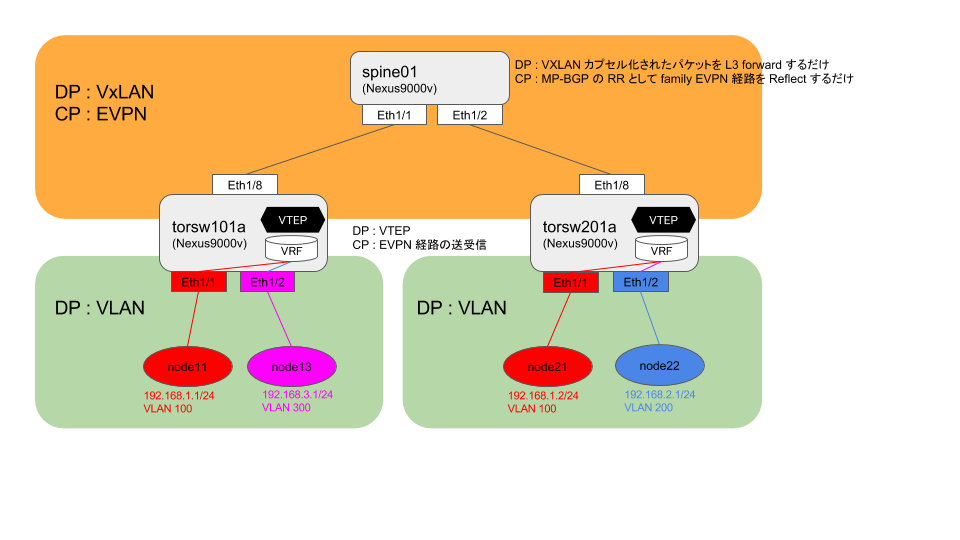
肝になる EVPN 周りの動作はこんな感じで
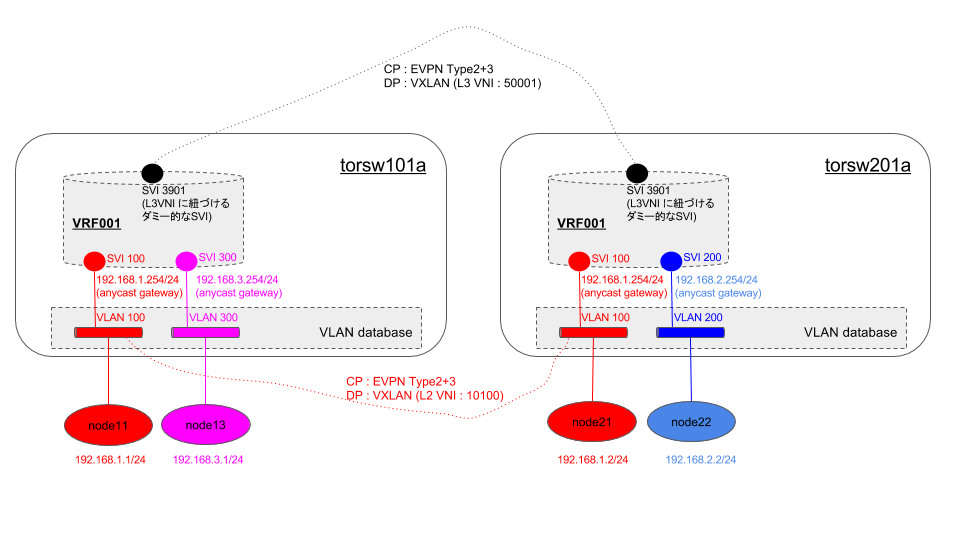
テナントから見るとこんな風かな、という絵
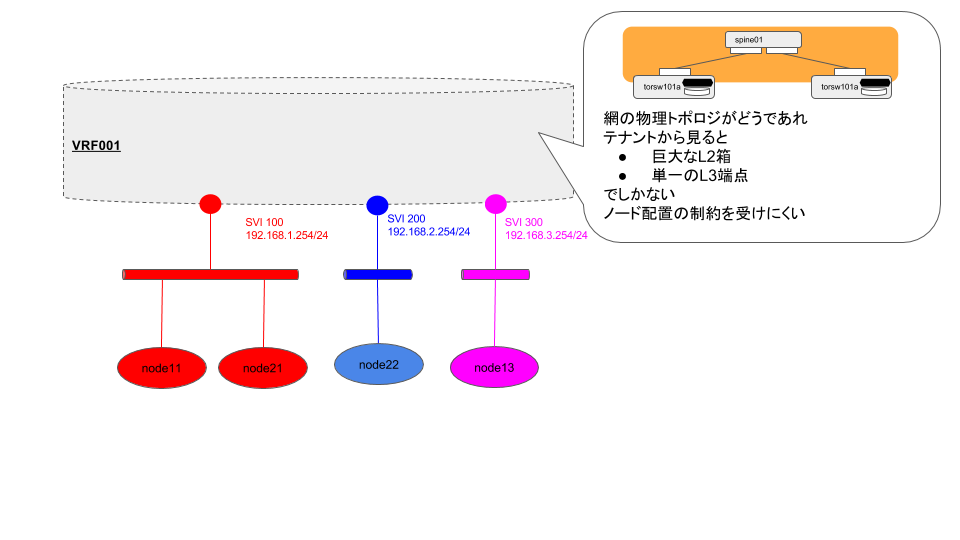
参考資料
- EVPN 標準 関連
- RFC7432 (BGP MPLS-Based Ethernet VPN)
- draft-ietf-bess-evpn-inter-subnet-forwarding-03
- L3回り、Symmetric と Asymmetric の詳細
- draft-snr-bess-evpn-proxy-arp-nd-02
- ARP suppression回り
- 今回は仮想版の機能制約により確認対象外
- Cisco Nexus 9000v 関連
- Cisco 公式 / Cisco Nexus 9000v Switch / Document
- Nexus9000全般のドキュメント
- Cisco 公式 / A Modern, Open, and Scalable Fabric: VXLAN EVPN(pdf)
- 一般的な VxLAN + EVPN の話が書いてあるのと共に、Nexus9000 実装に関しても書かれている(全170P)
- P35-36 に
Asymmetric vs Symmetric Forwardingの話- Nexus は sysmmetric のみサポートと書いてある
- P62-65 に
anycast gateway実装の話
- Cisco 公式 / Cisco Programmable Fabric with VXLAN BGP EVPN Configuration Guide
- 設定ガイド、これをメインの手引書として使う
- Cisco 公式 / Cisco Nexus 9000 Series NX-OS VXLAN Configuration Guide, Release 7.x
- Cisco 公式 / NX-OSv 9000 Guide / NX-OSv 9000 Software Functionality
- VxLAN + EVPN の技術全般を割と詳細に解説しており(メーカに依存しない話)、Cisco Nexus の実装話も盛り込まれている良書 (先の PDF とかのより詳説版的なイメージ)
- Cisco 公式 / Cisco Nexus 9000v Switch / Document

Building Data Centers with VXLAN BGP EVPN: A Cisco NX-OS Perspective (Networking Technology)
- 作者: Lukas Krattiger,Shyam Kapadia,David Jansen
- 出版社/メーカー: Cisco Press
- 発売日: 2017/04/10
- メディア: ペーパーバック
- この商品を含むブログを見る
環境情報
KVM 母艦と GNS3 は以下の感じで(前回 から Ubuntu と GNS3 のバージョンアップしているので一応)
$ uname -a Linux kvm01 4.4.0-93-generic #116-Ubuntu SMP Fri Aug 11 21:17:51 UTC 2017 x86_64 x86_64 x86_64 GNU/Linux $ cat /etc/lsb-release DISTRIB_ID=Ubuntu DISTRIB_RELEASE=16.04 DISTRIB_CODENAME=xenial DISTRIB_DESCRIPTION="Ubuntu 16.04.3 LTS" $ virsh -v 1.3.1 $ qemu-system-x86_64 --version QEMU emulator version 2.5.0 (Debian 1:2.5+dfsg-5ubuntu10.14), Copyright (c) 2003-2008 Fabrice Bellard $ gns3 --version 2.0.3
Nexus9000v は 2017/08/16 現在ダウンロード可能な最新の nxosv-final.7.0.3.I6.1.qcow2 で OVMF は 2016/08/13 時点のビルド版ぽい(MARKETPLACE で降ってきたのを使っただけ)
構築
Nexus9000v デプロイ
前回の記事 の感じで、ポチポチとデプロイしていきます。
今回、メモリは全て最低要件を狙って 4096MB としてあります。(Memory Usage Warning みたいなのは Syslog に出ていたけれど…)
同様に、疎通確認用のノードもいくらか用意しておきます。
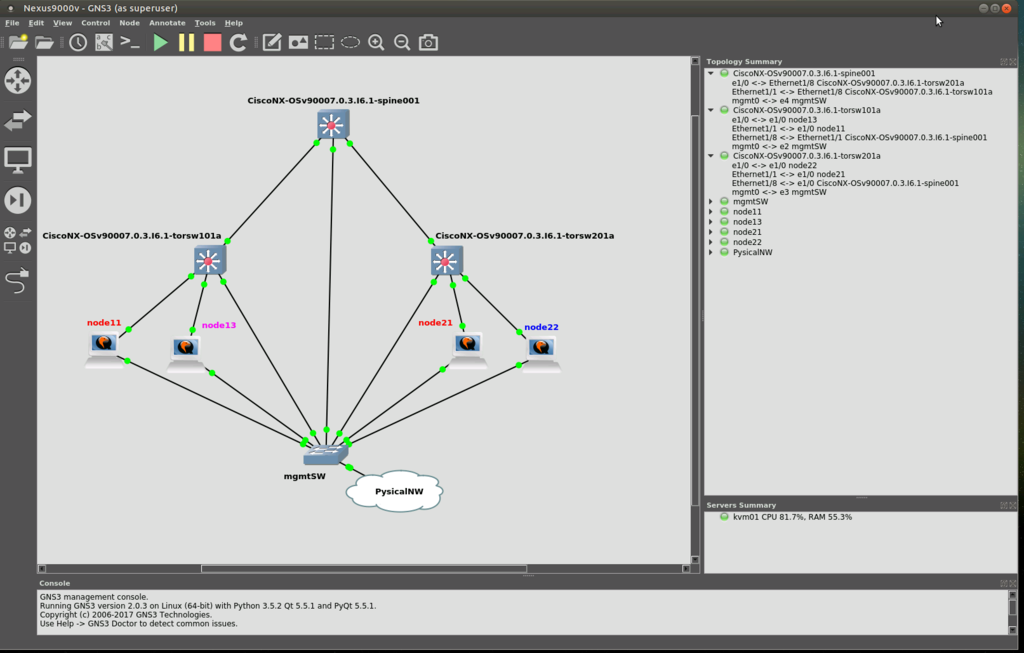
Nexus9000v 物理IF 設定
Nexus 同士の部分をば。VxLAN 渡すので MTU は大きめに。
あと、NXOS の特徴的なところで feature なにがし で有効化しないと設定コマンドの候補も出てこないので、使う機能は feature コマンドでまず有効化する必要ありです。
- spine001
feature lldp interface Ethernet1/1 description DEV=torsw101a IF=Eth1/8 no switchport mtu 9216 ip address 192.0.2.0/31 no shutdown interface Ethernet1/2 description DEV=torsw201a IF=Eth1/8 no switchport mtu 9216 ip address 192.0.2.2/31 no shutdown
- torsw101a
feature lldp interface Ethernet1/8 description DEV=spine001 IF=Eth1/1 no switchport mtu 9216 ip address 192.0.2.1/31 no shutdown
- torsw201a
feature lldp interface Ethernet1/8 description DEV=spine001 IF=Eth1/2 no switchport mtu 9216 ip address 192.0.2.3/31 no shutdown
Nexus9000v Underlay 設定
IP Unnumbered も動くみたいですが ip unnumbered loopback0 は コマンドが通らなかったので、前章の通り普通に IP アドレス降ってます。(何かの feature を有効化する必要あるのか、仮想版の機能制約かは未調査)
プロトコル選択肢としては IS-IS や eBGP なども使えるようですが、「ちゃんとテストしているのは OSPF と IS-IS だ」って書いてあったので、あまり考えずに OSPF 使ってます。
これまでの記事(vQFX や Cumulus Linux)では大体 eBGP 使っていましたが、NXOS の設定体系で BGP に Underlay と Overlay を混ぜ込むと(自分的に)分かりが良くなかったというのもありますが。
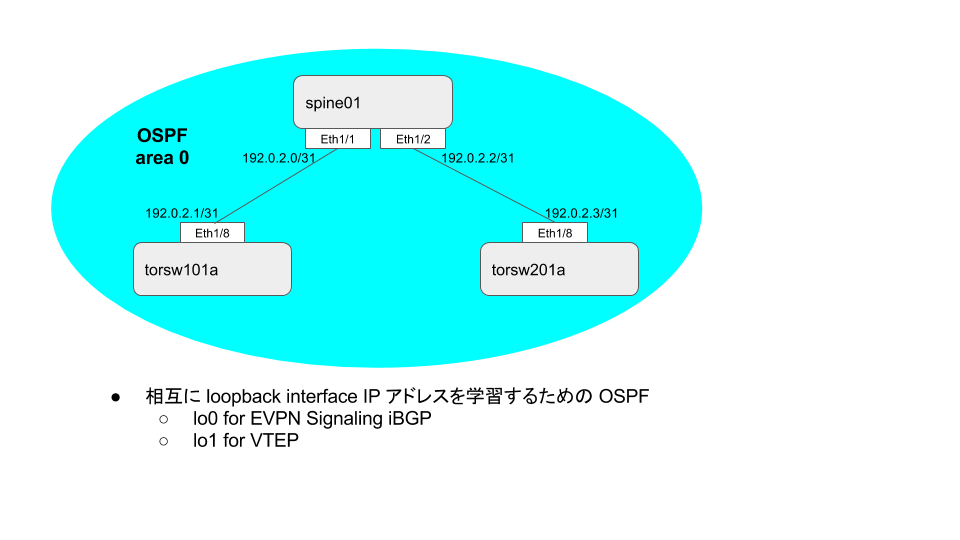
設定
- spine01
feature ospf interface loopback0 ip address 172.31.0.1/32 router ospf OSPF_UNDERLAY router-id 172.31.0.1 interface Ethernet1/1 ip ospf network point-to-point ip router ospf OSPF_UNDERLAY area 0 interface Ethernet1/2 ip ospf network point-to-point ip router ospf OSPF_UNDERLAY area 0 interface loopback0 ip router ospf OSPF_UNDERLAY area 0.0.0.0
- torsw101a
feature ospf interface loopback0 ip address 172.16.1.1/32 router ospf OSPF_UNDERLAY router-id 172.16.1.1 interface Ethernet1/8 ip ospf network point-to-point ip router ospf OSPF_UNDERLAY area 0 interface loopback0 ip router ospf OSPF_UNDERLAY area 0
- torsw201a
feature ospf interface loopback0 ip address 172.16.2.1/32 router ospf OSPF_UNDERLAY router-id 172.16.2.1 interface Ethernet1/8 ip ospf network point-to-point ip router ospf OSPF_UNDERLAY area 0 interface loopback0 ip router ospf OSPF_UNDERLAY area 0
エリア0オンリーでやってますが、大規模環境ではエリア分けも検討するのが良いでしょうかね。
簡易動作確認
1台分をチラ見。
spine001# show ip route
IP Route Table for VRF "default"
'*' denotes best ucast next-hop
'**' denotes best mcast next-hop
'[x/y]' denotes [preference/metric]
'%<string>' in via output denotes VRF <string>
172.16.1.1/32, ubest/mbest: 1/0
*via 192.0.2.1, Eth1/1, [110/41], 00:12:23, ospf-OSPF_UNDERLAY, intra
172.16.2.1/32, ubest/mbest: 1/0
*via 192.0.2.3, Eth1/2, [110/41], 00:03:39, ospf-OSPF_UNDERLAY, intra
172.31.0.1/32, ubest/mbest: 2/0, attached
*via 172.31.0.1, Lo0, [0/0], 00:35:13, local
*via 172.31.0.1, Lo0, [0/0], 00:35:13, direct
192.0.2.0/31, ubest/mbest: 1/0, attached
*via 192.0.2.0, Eth1/1, [0/0], 00:22:47, direct
192.0.2.0/32, ubest/mbest: 1/0, attached
*via 192.0.2.0, Eth1/1, [0/0], 00:22:47, local
192.0.2.2/31, ubest/mbest: 1/0, attached
*via 192.0.2.2, Eth1/2, [0/0], 00:22:37, direct
192.0.2.2/32, ubest/mbest: 1/0, attached
*via 192.0.2.2, Eth1/2, [0/0], 00:22:37, local
spine001# show ip ospf neighbors
OSPF Process ID OSPF_UNDERLAY VRF default
Total number of neighbors: 2
Neighbor ID Pri State Up Time Address Interface
172.16.1.1 1 FULL/ - 00:21:16 192.0.2.1 Eth1/1
172.16.2.1 1 FULL/ - 00:12:01 192.0.2.3 Eth1/2
Nexus9000v Overlay 設定
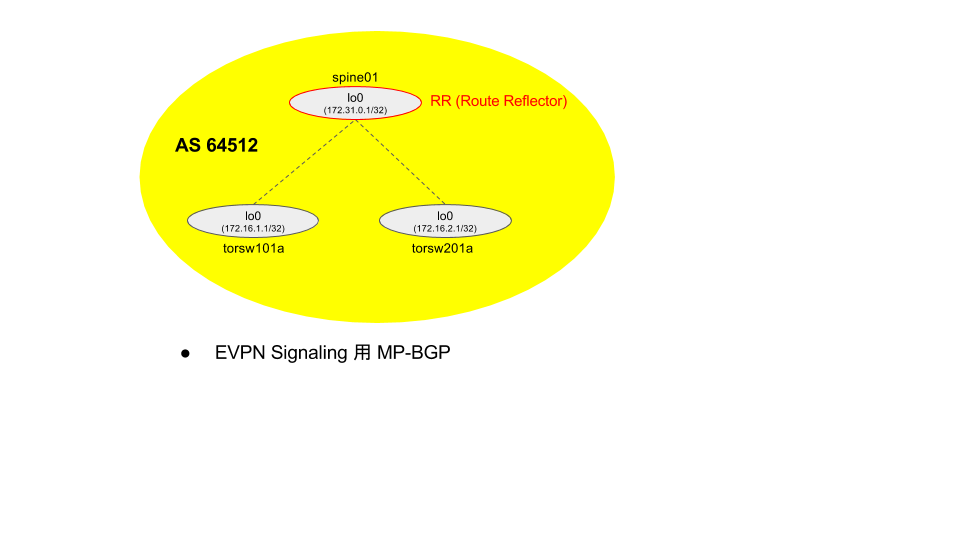
- spine001
feature bgp
nv overlay evpn
router bgp 64512
neighbor 172.16.1.1
remote-as 64512
update-source loopback0
address-family l2vpn evpn
send-community
send-community extended
route-reflector-client
neighbor 172.16.2.1
remote-as 64512
update-source loopback0
address-family l2vpn evpn
send-community
send-community extended
route-reflector-client
- torsw101a
feature bgp
nv overlay evpn
router bgp 64512
neighbor 172.31.0.1
remote-as 64512
update-source loopback0
address-family l2vpn evpn
send-community
send-community extended
- torsw201a
feature bgp
nv overlay evpn
router bgp 64512
neighbor 172.31.0.1
remote-as 64512
update-source loopback0
address-family l2vpn evpn
send-community
send-community extended
Nexus9000v VxLAN + EVPN 設定
設定の羅列を。
! で軽くポイントをコメント入れておきます…(torsw101a と torsw201a はほぼ一緒の設定なので、torsw101a 側のみに)。
なお、spine001 は Control Plane としては MP-BGP の RR 動作しますがその設定は済んでおり、Data Plane としては VxLAN 通信 の土管にしかならないので、本項では何も追加設定なしです。
- torsw101a
! anycast gateway の仮想 MAC アドレス
! fabric forwarding mode anycast-gateway 設定した SVI 全てで使われる Global 設定
fabric forwarding anycast-gateway-mac 20:20:00:00:00:AA
feature vn-segment-vlan-based
! L2 VNI と VLAN ID の mapping
vlan 100
vn-segment 10100
vlan 300
vn-segment 10300
! VTEP 間 VxLAN 通信の Src/Dst IP アドレスとなる loopback (先に設定した loopback0 は EVPN Signaling 用 iBGP 用)
interface loopback1
ip address 198.18.1.11/32
ip router ospf OSPF_UNDERLAY area 0.0.0.0
feature nv overlay
! Network Virtualization Endpoint (VTEP 用デバイス?インターフェース? 適切な言葉が...)
interface nve1
source-interface loopback1
host-reachability protocol bgp
! テナント向け VRF
! ちなみにデフォルトで mgmt は management VRF に所属している
vrf context VRF001
! 本 VRF 専用の L3VNI
vni 50001
rd auto
address-family ipv4 unicast
route-target both auto
route-target both auto evpn
interface nve1
! - や , で指定可能
! ただし上限数があって 10001-14094 とVLAN 4094 分やろうとしたらエラーになった
member vni 10001-10300
! BUM トラフィック処理方法(VTEP 間) は Ingress Replication でユニキャスト通信させる
! マルチキャストも選択可能だが、そもそもこんな調査・検証している理由のひとつに「マルチキャストルーティング使いたくない」もあるので
ingress-replication protocol bgp
member vni 50001 associate-vrf
no shutdown
router bgp 64512
vrf VRF001
address-family ipv4 unicast
advertise l2vpn evpn
! テナント用 SVI 群
! SVI 200 は torsw201a 側のみ、SVI 300 は torsw101a 側のみで OK
feature interface-vlan
interface Vlan100
no shutdown
vrf member VRF001
no ip redirects
ip address 192.168.1.254/24
! 本セグメントで anycast gateway を使う
fabric forwarding mode anycast-gateway
interface Vlan300
no shutdown
vrf member VRF001
no ip redirects
ip address 192.168.3.254/24
fabric forwarding mode anycast-gateway
! テナント エンドノード収容物理 IF 設定
! trunk VLAN でも OK
interface Ethernet1/1
switchport access vlan 100
description DEV=node11 IF=ens4
interface Ethernet1/2
switchport access vlan 300
description DEV=node13 IF=ens4
evpn
vni 10100 l2
rd auto
route-target import auto
route-target export auto
vni 10300 l2
rd auto
route-target import auto
route-target export auto
! テナント VRF の L3 VNI につきひとつ、VLAN と SVI が必要...
! なお、VLAN は 4094 全て使えるわけでなく 39XX までしかいけない
vlan 3901
vn-segment 50001
interface Vlan3901
no shutdown
vrf member VRF001
ip forward
- torsw201a
fabric forwarding anycast-gateway-mac 20:20:00:00:00:AA
feature vn-segment-vlan-based
vlan 100
vn-segment 10100
vlan 200
vn-segment 10200
interface loopback1
ip address 198.18.1.21/32
ip router ospf OSPF_UNDERLAY area 0.0.0.0
feature nv overlay
interface nve1
source-interface loopback1
host-reachability protocol bgp
vrf context VRF001
vni 50001
rd auto
address-family ipv4 unicast
route-target both auto
route-target both auto evpn
interface nve1
member vni 10001-10300
ingress-replication protocol bgp
member vni 50001 associate-vrf
no shutdown
router bgp 64512
vrf VRF001
address-family ipv4 unicast
advertise l2vpn evpn
feature interface-vlan
interface Vlan100
no shutdown
vrf member VRF001
no ip redirects
ip address 192.168.1.254/24
fabric forwarding mode anycast-gateway
interface Vlan200
no shutdown
vrf member VRF001
no ip redirects
ip address 192.168.2.254/24
fabric forwarding mode anycast-gateway
interface Ethernet1/1
switchport access vlan 100
description DEV=node21 IF=ens4
interface Ethernet1/2
switchport access vlan 200
description DEV=node22 IF=ens4
evpn
vni 10100 l2
rd auto
route-target import auto
route-target export auto
vni 10200 l2
rd auto
route-target import auto
route-target export auto
vlan 3901
vn-segment 50001
interface Vlan3901
no shutdown
vrf member VRF001
ip forward
動作確認
Nexus9000v 各種テーブル確認
これで 4 つの node が相互通信可能になったわけですが、その通信確認後の Nexus9000v のテーブルを見ていきます。
VTEP 同士の peer 状態 / 自身の NVE 状態
torsw101a# show nve peers detail
Details of nve Peers:
----------------------------------------
Peer-Ip: 198.18.1.21
NVE Interface : nve1
Peer State : Up
Peer Uptime : 05:40:49
Router-Mac : 0021.9643.7607
Peer First VNI : 50001
Time since Create : 05:40:50
Configured VNIs : 10001-10300,50001
Provision State : add-complete
Route-Update : Yes
Peer Flags : RmacL2Rib, TunnelPD, DisableLearn
Learnt CP VNIs : 10100,50001
Peer-ifindex-resp : Yes
----------------------------------------
torsw101a# show nve internal platform interface nve 1 detail
Printing Interface ifindex 0x49000001 detail
|======|=========================|===============|===============|=====|=====|
|Intf |State |PriIP |SecIP |Vnis |Peers|
|======|=========================|===============|===============|=====|=====|
|nve1 |UP |198.18.1.11 |0.0.0.0 |3 |1 |
|======|=========================|===============|===============|=====|=====|
SW_BD/VNIs of interface nve1:
================================================
|======|======|=========================|======|====|======|========
|Sw BD |Vni |State |Intf |Type|Vrf-ID|Notified
|======|======|=========================|======|====|======|========
|100 |10100 |UP |nve1 |CP |0 |Yes
|300 |10300 |UP |nve1 |CP |0 |Yes
|3901 |50001 |UP |nve1 |CP |3 |Yes
|======|======|=========================|======|====|======|========
Peers of interface nve1:
============================================
Peer_ip: 198.18.1.21
Peer-ID : 1
State : UP
Learning : Disabled
TunnelID : 0xc6120115
MAC : 0021.9643.7607
Table-ID : 0x1
Encap : 0x1
torsw201a# show nve peers detail
Details of nve Peers:
----------------------------------------
Peer-Ip: 198.18.1.11
NVE Interface : nve1
Peer State : Up
Peer Uptime : 05:40:33
Router-Mac : 0021.960f.f307
Peer First VNI : 10100
Time since Create : 05:40:33
Configured VNIs : 10001-10300,50001
Provision State : add-complete
Route-Update : Yes
Peer Flags : RmacL2Rib, TunnelPD, DisableLearn
Learnt CP VNIs : 10100,50001
Peer-ifindex-resp : Yes
----------------------------------------
torsw201a# show nve internal platform interface nve 1 detail
Printing Interface ifindex 0x49000001 detail
|======|=========================|===============|===============|=====|=====|
|Intf |State |PriIP |SecIP |Vnis |Peers|
|======|=========================|===============|===============|=====|=====|
|nve1 |UP |198.18.1.21 |0.0.0.0 |3 |1 |
|======|=========================|===============|===============|=====|=====|
SW_BD/VNIs of interface nve1:
================================================
|======|======|=========================|======|====|======|========
|Sw BD |Vni |State |Intf |Type|Vrf-ID|Notified
|======|======|=========================|======|====|======|========
|100 |10100 |UP |nve1 |CP |0 |Yes
|200 |10200 |UP |nve1 |CP |0 |Yes
|3901 |50001 |UP |nve1 |CP |3 |Yes
|======|======|=========================|======|====|======|========
Peers of interface nve1:
============================================
Peer_ip: 198.18.1.11
Peer-ID : 1
State : UP
Learning : Disabled
TunnelID : 0xc612010b
MAC : 0021.960f.f307
Table-ID : 0x1
Encap : 0x1
あと、設定終わったと思いきや何か想定通り動かない…って時に、以下のコマンドを使いました。
以下出力例は「L3 VNI 用の SVI と VLAN が不正(前記設定の 3901 を設定していなかった)」ものですが、他にも mcast-group-or-ingress-rep-not-cfg みたいな割と分かりやすい出力もあります。
torsw101a# show nve internal vni 50001 VNI 50001 Ready-State : Not Ready [invalid sw-bd]
MP-BGP for EVPN Signaling Neighbor 情報
torsw101a# show bgp l2vpn evpn neighbors
BGP neighbor is 172.31.0.1, remote AS 64512, ibgp link, Peer index 3
BGP version 4, remote router ID 172.31.0.1
BGP state = Established, up for 1d06h
Using loopback0 as update source for this peer
Last read 00:00:14, hold time = 180, keepalive interval is 60 seconds
Last written 00:00:48, keepalive timer expiry due 00:00:11
Received 2911 messages, 0 notifications, 0 bytes in queue
Sent 3216 messages, 0 notifications, 0 bytes in queue
Connections established 1, dropped 0
Last reset by us never, due to No error
Last reset by peer never, due to No error
Neighbor capabilities:
Dynamic capability: advertised (mp, refresh, gr) received (mp, refresh, gr)
Dynamic capability (old): advertised received
Route refresh capability (new): advertised received
Route refresh capability (old): advertised received
4-Byte AS capability: advertised received
Address family L2VPN EVPN: advertised received
Graceful Restart capability: advertised received
Graceful Restart Parameters:
Address families advertised to peer:
L2VPN EVPN
Address families received from peer:
L2VPN EVPN
Forwarding state preserved by peer for:
Restart time advertised to peer: 120 seconds
Stale time for routes advertised by peer: 300 seconds
Restart time advertised by peer: 120 seconds
Extended Next Hop Encoding Capability: advertised received
Receive IPv6 next hop encoding Capability for AF:
IPv4 Unicast
Message statistics:
Sent Rcvd
Opens: 1 1
Notifications: 0 0
Updates: 1443 1449
Keepalives: 1771 1460
Route Refresh: 0 0
Capability: 1 1
Total: 3216 2911
Total bytes: 155694 160466
Bytes in queue: 0 0
For address family: L2VPN EVPN
BGP table version 2897, neighbor version 2897
4 accepted paths consume 512 bytes of memory
6 sent paths
Community attribute sent to this neighbor
Extended community attribute sent to this neighbor
Third-party Nexthop will not be computed.
Last End-of-RIB received 00:00:01 after session start
Local host: 172.16.1.1, Local port: 19618
Foreign host: 172.31.0.1, Foreign port: 179
fd = 76
EVPN 学習経路情報
Cumulus Linux と似た出力フォーマットですね。
torsw101a# show bgp l2vpn evpn
BGP routing table information for VRF default, address family L2VPN EVPN
BGP table version is 2893, local router ID is 172.16.1.1
Status: s-suppressed, x-deleted, S-stale, d-dampened, h-history, *-valid, >-best
Path type: i-internal, e-external, c-confed, l-local, a-aggregate, r-redist, I-injected
Origin codes: i - IGP, e - EGP, ? - incomplete, | - multipath, & - backup
Network Next Hop Metric LocPrf Weight Path
Route Distinguisher: 172.16.1.1:32867 (L2VNI 10100)
*>l[2]:[0]:[0]:[48]:[0021.969a.0301]:[0]:[0.0.0.0]/216
198.18.1.11 100 32768 i
*>i[2]:[0]:[0]:[48]:[0021.969f.c701]:[0]:[0.0.0.0]/216
198.18.1.21 100 0 i
*>l[2]:[0]:[0]:[48]:[0021.969a.0301]:[32]:[192.168.1.1]/272
198.18.1.11 100 32768 i
*>i[2]:[0]:[0]:[48]:[0021.969f.c701]:[32]:[192.168.1.2]/272
198.18.1.21 100 0 i
*>l[3]:[0]:[32]:[198.18.1.11]/88
198.18.1.11 100 32768 i
*>i[3]:[0]:[32]:[198.18.1.21]/88
198.18.1.21 100 0 i
Route Distinguisher: 172.16.1.1:33067 (L2VNI 10300)
*>l[2]:[0]:[0]:[48]:[0021.963d.6e01]:[0]:[0.0.0.0]/216
198.18.1.11 100 32768 i
*>l[2]:[0]:[0]:[48]:[0021.963d.6e01]:[32]:[192.168.3.1]/272
198.18.1.11 100 32768 i
*>l[3]:[0]:[32]:[198.18.1.11]/88
198.18.1.11 100 32768 i
Route Distinguisher: 172.16.2.1:32867
*>i[2]:[0]:[0]:[48]:[0021.969f.c701]:[0]:[0.0.0.0]/216
198.18.1.21 100 0 i
*>i[2]:[0]:[0]:[48]:[0021.969f.c701]:[32]:[192.168.1.2]/272
198.18.1.21 100 0 i
*>i[3]:[0]:[32]:[198.18.1.21]/88
198.18.1.21 100 0 i
Route Distinguisher: 172.16.2.1:32967
*>i[2]:[0]:[0]:[48]:[0021.9642.5f01]:[32]:[192.168.2.1]/272
198.18.1.21 100 0 i
Route Distinguisher: 172.16.1.1:3 (L3VNI 50001)
*>i[2]:[0]:[0]:[48]:[0021.9642.5f01]:[32]:[192.168.2.1]/272
198.18.1.21 100 0 i
*>i[2]:[0]:[0]:[48]:[0021.969f.c701]:[32]:[192.168.1.2]/272
198.18.1.21 100 0 i
MAC アドレステーブル
Cisco 公式 / NX-OSv 9000 Guide / NX-OSv 9000 Software Functionality の下の方に NX-OSv 9000 Feature UI/CLI Difference From Hardware Platform ってのがあって、show mac addr とかその辺は代わりにこのコマンドを使え、とあったので仮想版ではこれで。
anycast gateway(20:20:00:00:00:aa) のエントリ表示がおかしいのはご愛敬ということで。
torsw101a# show system internal l2fwder mac
Legend:
* - primary entry, G - Gateway MAC, (R) - Routed MAC, O - Overlay MAC
age - seconds since last seen,+ - primary entry using vPC Peer-Link,
(T) - True, (F) - False, C - ControlPlane MAC
VLAN MAC Address Type age Secure NTFY Ports
---------+-----------------+--------+---------+------+----+------------------
G 3901 0021.960f.f307 static - F F sup-eth1(R)
G 100 0021.960f.f307 static - F F sup-eth1(R)
* 100 0021.969f.c701 static - F F (0x47000001) nve-peer1 198.18.
G 300 0021.960f.f307 static - F F sup-eth1(R)
* 100 0021.969a.0301 dynamic 00:02:55 F F Eth1/1
* 300 0021.963d.6e01 dynamic 00:03:06 F F Eth1/2
1 1 -20:20:00:00:00:aa - 1
torsw201a# show system internal l2fwder mac
Legend:
* - primary entry, G - Gateway MAC, (R) - Routed MAC, O - Overlay MAC
age - seconds since last seen,+ - primary entry using vPC Peer-Link,
(T) - True, (F) - False, C - ControlPlane MAC
VLAN MAC Address Type age Secure NTFY Ports
---------+-----------------+--------+---------+------+----+------------------
G 100 0021.9643.7607 static - F F sup-eth1(R)
* 200 0021.9642.5f01 dynamic 00:01:03 F F Eth1/2
* 100 0021.969f.c701 dynamic 00:03:40 F F Eth1/1
G 200 0021.9643.7607 static - F F sup-eth1(R)
* 100 0021.969a.0301 static - F F (0x47000001) nve-peer1 198.18.
1 1 -20:20:00:00:00:aa - 1
MAC アドレステーブル(EVPN 学習観点)
Seq No があるってことは MAC Mobility Extended Community が使えるんじゃないのか!?(説明放棄)
torsw101a# show l2route evpn mac all Flags -(Rmac):Router MAC (Stt):Static (L):Local (R):Remote (V):vPC link (Dup):Duplicate (Spl):Split (Rcv):Recv (AD):Auto-Delete(D):Del Pending (S):Stale (C):Clear (Ps):Peer Sync (O):Re-Originated Topology Mac Address Prod Flags Seq No Next-Hops ----------- -------------- ------ ------------- ---------- ---------------- 100 0021.969a.0301 Local L, 0 Eth1/1 100 0021.969f.c701 BGP SplRcv 0 198.18.1.21 300 0021.963d.6e01 Local L, 0 Eth1/2 3901 0021.9643.7607 VXLAN Rmac 0 198.18.1.21
torsw201a# show l2route evpn mac all Flags -(Rmac):Router MAC (Stt):Static (L):Local (R):Remote (V):vPC link (Dup):Duplicate (Spl):Split (Rcv):Recv (AD):Auto-Delete(D):Del Pending (S):Stale (C):Clear (Ps):Peer Sync (O):Re-Originated Topology Mac Address Prod Flags Seq No Next-Hops ----------- -------------- ------ ------------- ---------- ---------------- 100 0021.969a.0301 BGP SplRcv 0 198.18.1.11 100 0021.969f.c701 Local L, 0 Eth1/1 200 0021.9642.5f01 Local L, 0 Eth1/2 3901 0021.960f.f307 VXLAN Rmac 0 198.18.1.11
VRF の ARP テーブル
VxLAN や EVPN は関係ないですが。
なお AgeOut しそうになると、自発的に Nexus9000v が ARP request をノードに投げて、reply があったら AgeOut させないという(割とよくある)動きをしていました。
また、自身の配下にあるノードの分しか見えません。
torsw101a# show ip arp vrf VRF001
Flags: * - Adjacencies learnt on non-active FHRP router
+ - Adjacencies synced via CFSoE
# - Adjacencies Throttled for Glean
CP - Added via L2RIB, Control plane Adjacencies
PS - Added via L2RIB, Peer Sync
RO - Dervied from L2RIB Peer Sync Entry
D - Static Adjacencies attached to down interface
IP ARP Table for context VRF001
Total number of entries: 2
Address Age MAC Address Interface Flags
192.168.3.1 00:02:36 0021.963d.6e01 Vlan300
192.168.1.1 00:02:24 0021.969a.0301 Vlan100
torsw201a# show ip arp vrf VRF001
Flags: * - Adjacencies learnt on non-active FHRP router
+ - Adjacencies synced via CFSoE
# - Adjacencies Throttled for Glean
CP - Added via L2RIB, Control plane Adjacencies
PS - Added via L2RIB, Peer Sync
RO - Dervied from L2RIB Peer Sync Entry
D - Static Adjacencies attached to down interface
IP ARP Table for context VRF001
Total number of entries: 2
Address Age MAC Address Interface Flags
192.168.1.2 00:00:07 0021.969f.c701 Vlan100
192.168.2.1 00:02:31 0021.9642.5f01 Vlan200
VRF のルーティングテーブル(IPv4)
EVPN の MAC-IP を NLRI Type 2 でやりとりしているので、ホスト単位の経路情報になってます。
torsw101a# show ip route vrf VRF001
IP Route Table for VRF "VRF001"
'*' denotes best ucast next-hop
'**' denotes best mcast next-hop
'[x/y]' denotes [preference/metric]
'%<string>' in via output denotes VRF <string>
192.168.1.0/24, ubest/mbest: 1/0, attached
*via 192.168.1.254, Vlan100, [0/0], 1d06h, direct
192.168.1.1/32, ubest/mbest: 1/0, attached
*via 192.168.1.1, Vlan100, [190/0], 1d06h, hmm
192.168.1.2/32, ubest/mbest: 1/0
*via 198.18.1.21%default, [200/0], 1d06h, bgp-64512, internal, tag 64512 (evpn) segid: 50001 tunnelid: 0xc6
120115 encap: VXLAN
192.168.1.254/32, ubest/mbest: 1/0, attached
*via 192.168.1.254, Vlan100, [0/0], 1d06h, local
192.168.2.1/32, ubest/mbest: 1/0
*via 198.18.1.21%default, [200/0], 1d06h, bgp-64512, internal, tag 64512 (evpn) segid: 50001 tunnelid: 0xc6
120115 encap: VXLAN
192.168.3.0/24, ubest/mbest: 1/0, attached
*via 192.168.3.254, Vlan300, [0/0], 1d06h, direct
192.168.3.1/32, ubest/mbest: 1/0, attached
*via 192.168.3.1, Vlan300, [190/0], 1d06h, hmm
192.168.3.254/32, ubest/mbest: 1/0, attached
*via 192.168.3.254, Vlan300, [0/0], 1d06h, local
torsw201a# show ip route vrf VRF001
IP Route Table for VRF "VRF001"
'*' denotes best ucast next-hop
'**' denotes best mcast next-hop
'[x/y]' denotes [preference/metric]
'%<string>' in via output denotes VRF <string>
192.168.1.0/24, ubest/mbest: 1/0, attached
*via 192.168.1.254, Vlan100, [0/0], 1d21h, direct
192.168.1.1/32, ubest/mbest: 1/0
*via 198.18.1.11%default, [200/0], 1d06h, bgp-64512, internal, tag 64512 (evpn) segid: 50001 tunnelid
: 0xc612010b encap: VXLAN
192.168.1.2/32, ubest/mbest: 1/0, attached
*via 192.168.1.2, Vlan100, [190/0], 1d11h, hmm
192.168.1.254/32, ubest/mbest: 1/0, attached
*via 192.168.1.254, Vlan100, [0/0], 1d21h, local
192.168.2.0/24, ubest/mbest: 1/0, attached
*via 192.168.2.254, Vlan200, [0/0], 1d09h, direct
192.168.2.1/32, ubest/mbest: 1/0, attached
*via 192.168.2.1, Vlan200, [190/0], 1d06h, hmm
192.168.2.254/32, ubest/mbest: 1/0, attached
*via 192.168.2.254, Vlan200, [0/0], 1d09h, local
192.168.3.1/32, ubest/mbest: 1/0
*via 198.18.1.11%default, [200/0], 1d06h, bgp-64512, internal, tag 64512 (evpn) segid: 50001 tunnelid
: 0xc612010b encap: VXLAN
通信・パケット確認
Cisco 公式 / Cisco Programmable Fabric with VXLAN BGP EVPN Configuration Guide / Chapter: Unicast Forwarding に色々なパターンのフォワーディング動作が書いてあるので、それと見比べながら。
node11(VLAN 100) node21(VLAN 100) 通信 (via L2VNI)
各ノードで $ sudo ip n flush dev ens4 で ARP テーブル flush した上で
kotetsu@node11:~$ ping 192.168.1.2 PING 192.168.1.2 (192.168.1.2) 56(84) bytes of data. 64 bytes from 192.168.1.2: icmp_seq=1 ttl=64 time=24.5 ms 64 bytes from 192.168.1.2: icmp_seq=2 ttl=64 time=7.11 ms 64 bytes from 192.168.1.2: icmp_seq=3 ttl=64 time=7.05 ms
kotetsu@node11:~$ ip n show dev ens4 192.168.1.2 lladdr 00:21:96:9f:c7:01 STALE 192.168.1.254 lladdr 20:20:00:00:00:aa STALE
kotetsu@node21:~$ ip n show dev ens4 192.168.1.1 lladdr 00:21:96:9a:03:01 STALE 192.168.1.254 lladdr 20:20:00:00:00:aa STALE
node11 からの ARP request は torsw101a が L2 VNI 10100 で VxLAN カプセル化して Ingress Replication (外側の IP src/dst は torsw[12]01a の loopback1)
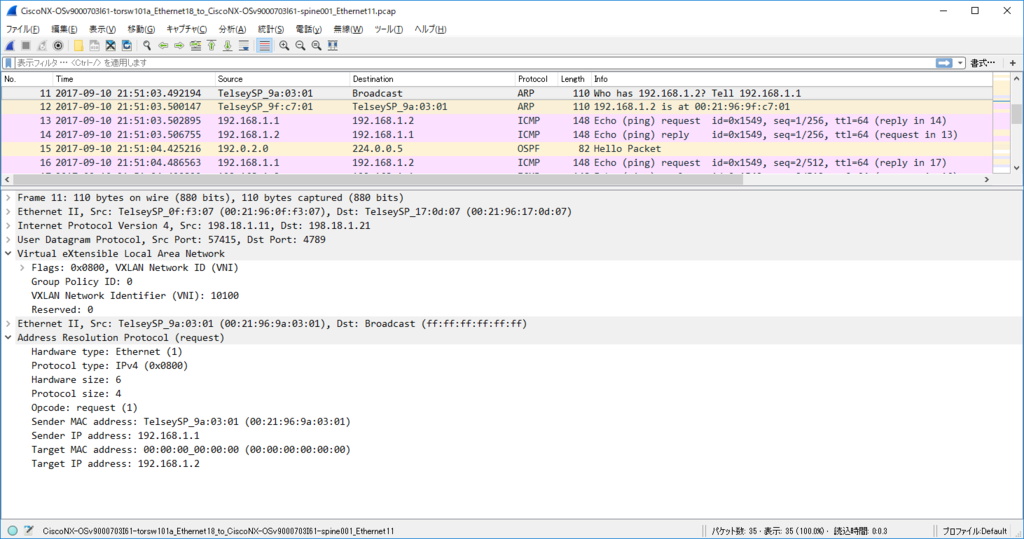
node11 からの ICMP Echo Request は単に L2 VNI 10100 で VxLAN カプセル化されたやつ
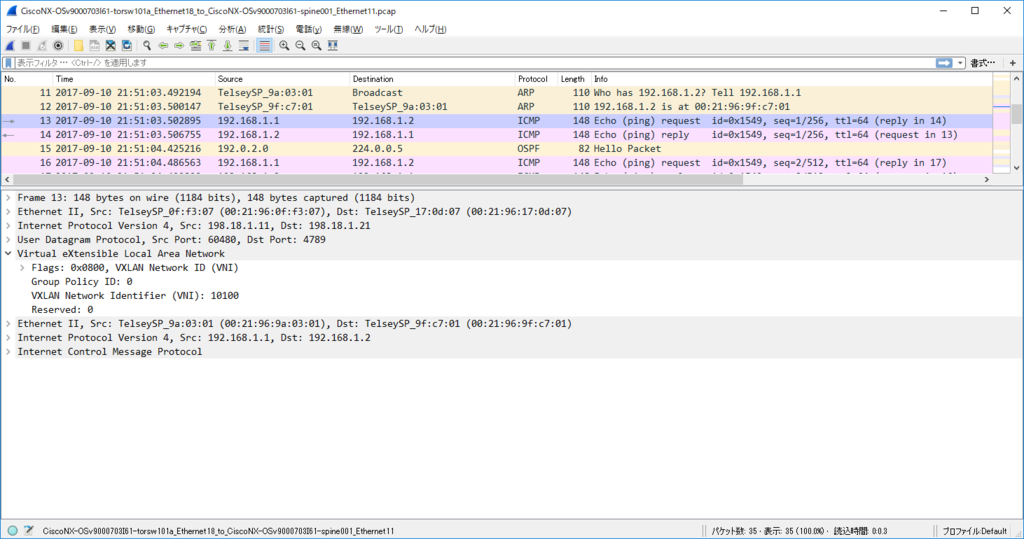
node11(VLAN 100) node22(VLAN 200) 通信 (via L3VNI)
各ノードで $ sudo ip n flush dev ens4 で ARP テーブル flush した上で
kotetsu@node11:~$ ping 192.168.2.1 PING 192.168.2.1 (192.168.2.1) 56(84) bytes of data. 64 bytes from 192.168.2.1: icmp_seq=1 ttl=62 time=22.1 ms 64 bytes from 192.168.2.1: icmp_seq=2 ttl=62 time=9.69 ms 64 bytes from 192.168.2.1: icmp_seq=3 ttl=62 time=12.3 ms 64 bytes from 192.168.2.1: icmp_seq=4 ttl=62 time=8.81 ms
kotetsu@node11:~$ ip n show dev ens4 192.168.1.2 FAILED 192.168.1.254 lladdr 20:20:00:00:00:aa STALE
kotetsu@node22:~$ ip n show dev ens4 192.168.2.254 lladdr 20:20:00:00:00:aa STALE
ARP Req は torsw101a から torsw201a に VNI 10100 で転送されるが、torsw201a 側が ARP Reply はしないでくれるので Dup った ARP Reply が node11 に戻ることはないです。(結果的には良いのですが、torsw201a はどうやって巧く判断しているんだろう…)
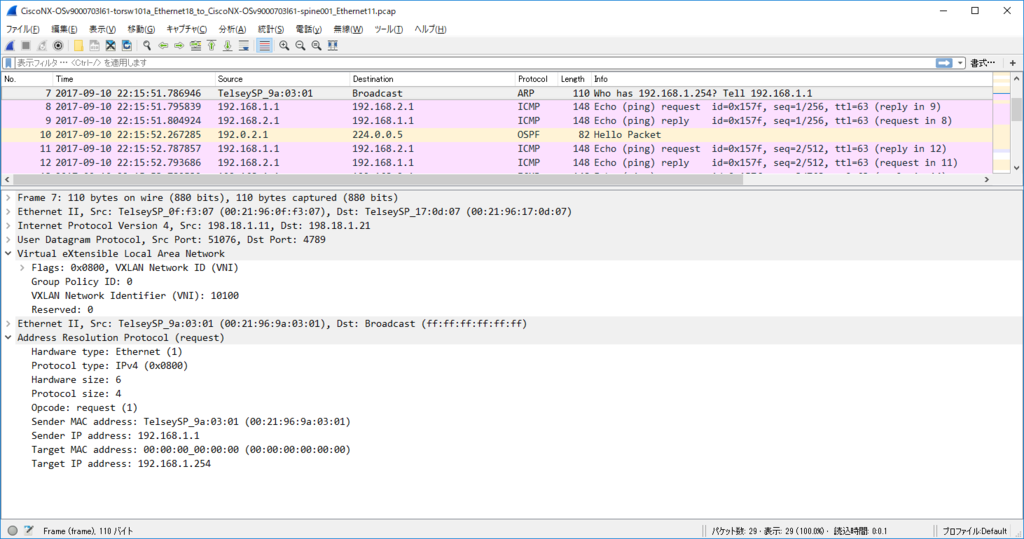
node11 からの ICMP Echo Request は torsw101a が VRF 間の L3 VNI 50001 でカプセル化して転送
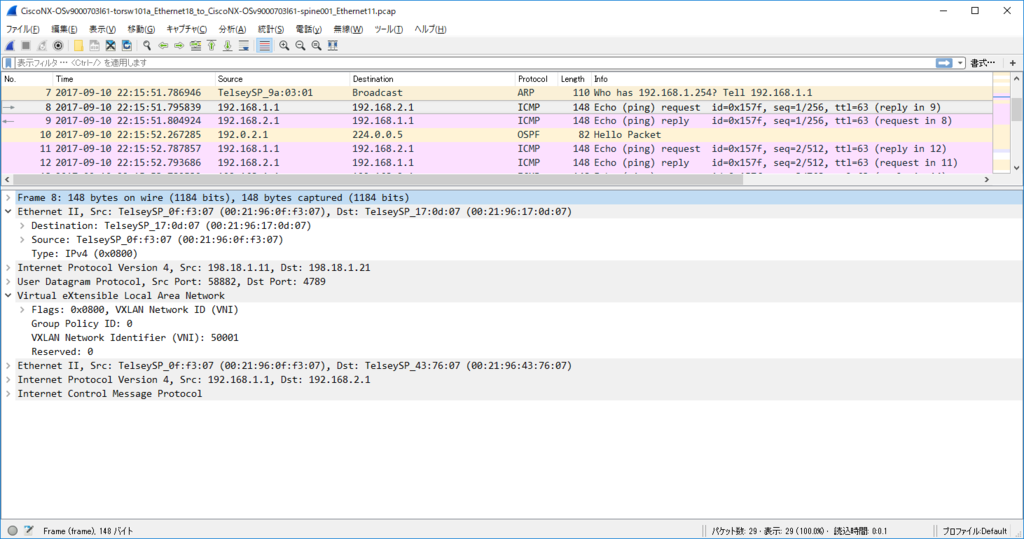
Control Plane パケット
かなり見飽きてきた感はありますが EVPN NLRI Type2 MAC/IP Advertisement route) Update を一つ見てみます。
今回、inter subnet 通信のために SVI を作っていますので、MAC アドレスだけでなくだけでなく IP アドレスもアドバタイズされています。
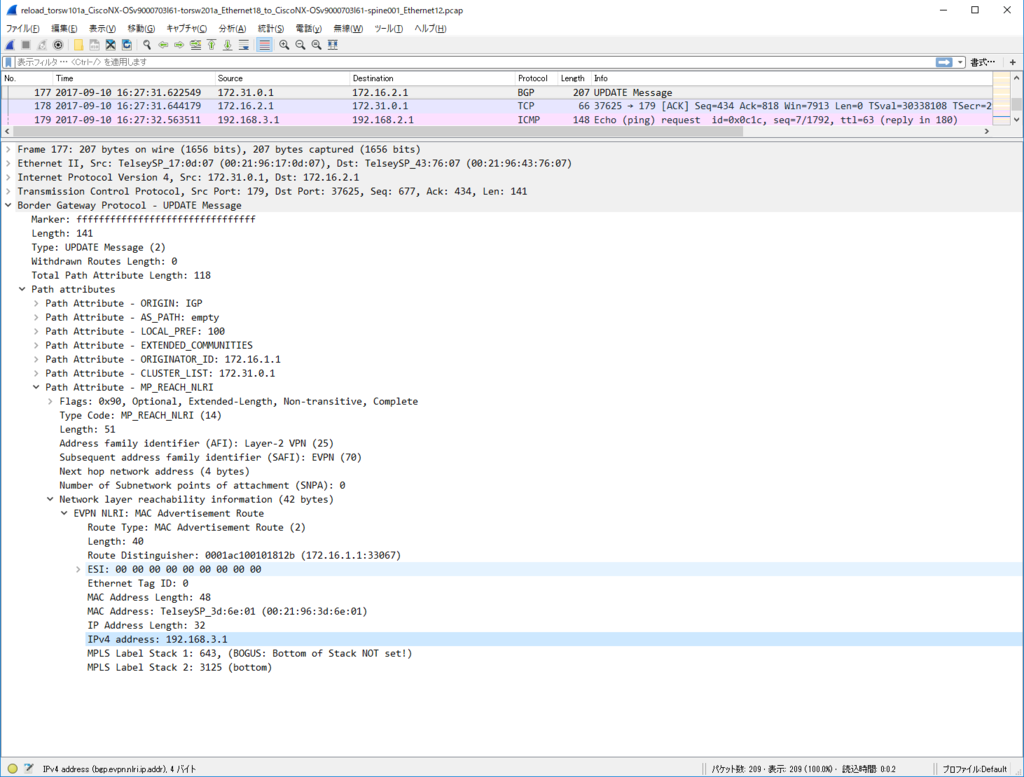
おしまい
Cisco Nexus9000v を KVM+GNS3 で動かす
最初に
やること/サマリ
本項では以下の話をします。
KVM+GNS3環境でNexus9000vを動かすところまで
話のポイントはこんなところ
GNS3のMARKETPLACEを使ったアプライアンスデプロイが楽Cisco Nexus 9000シリーズの仮想版であるところのNexus9000vは2017/08/16現在、誰でもダウンロード可能なのでNX-OS素振りが出来る- SW 版固有の機能制約はもちろんあり
- メモリ要件は Minimum 4GB, Recommended 8GB といういつも通りなやつ
まー Nexus9000v のデプロイで UEFI 必須でタルかったので MARKETPLACE に逃げた、というのが正直なところですが。
参考資料
思うに、こんなページをわざわざ見に来る人は、このリンクを見れば自分で問題なく出来そうだよね。
- Cisco Nexus 9000v 関連
- Cisco 公式 / Cisco Nexus 9000v Switch / Document
- Nexus9000全般のドキュメント
- Cisco だけあって、かなり豊富でしっかりしている
- Cisco 公式 / Cisco Nexus 9000v Switch / Download
- image ファイルダウンロードページ
- qcow2 など各種形式
2017/08/16現在は個人アカウントでもダウンロード可能Download Optionsをポチッて後は流れで
- Cisco 公式 / NX-OSv 9000 Guide
- Nexus9000v にフォーカスしたドキュメント
- HW版と比較した機能制限やリソース要件や各種Hypervisor向けのデプロイパラメータも書いてある
- Cisco 公式 / Cisco Nexus 9000v Switch / Document
- GNS3 関連
- GNS3 公式 / Cisco NX-OSv 9000 appliance
- GNS3 公式 / MARKETPLACE
- GNS3 公式 / Import GNS3 appliance
gns3a形式のやつをインポートする、ESXi でいうところの ovf import 的な詳細手順- 画面キャプチャ満載で分かりやすい
環境情報
KVM 母艦と GNS3 は以下の感じで
$ uname -a Linux kvm01 4.4.0-79-generic #100-Ubuntu SMP Wed May 17 19:58:14 UTC 2017 x86_64 x86_64 x86_64 GNU/Linux $ cat /etc/lsb-release DISTRIB_ID=Ubuntu DISTRIB_RELEASE=16.04 DISTRIB_CODENAME=xenial DISTRIB_DESCRIPTION="Ubuntu 16.04.2 LTS" $ virsh -v 1.3.1 $ qemu-system-x86_64 --version QEMU emulator version 2.5.0 (Debian 1:2.5+dfsg-5ubuntu10.14), Copyright (c) 2003-2008 Fabrice Bellard $ gns3 --version 2.0.2
Nexus9000v は 2017/08/16 現在ダウンロード可能な最新の nxosv-final.7.0.3.I6.1.qcow2 で OVMF は 2016/08/13 時点のビルド版ぽい(MARKETPLACE で降ってきたのを使っただけ)
Nexus9000v デプロイ
Cisco サイトで OS ファイル取得
まあこの後のデプロイ手順は、ここで取得したファイルは使わないのですが…「俺は正当にこのファイルをダウンロードして使える権限を持っているんだな」って確認はしておきたいじゃないですか。
上記から qcow2 ファイルを取得(紐付いているのはハンペンAP1台だけの個人アカウントでも問題なく)して、チェックサムを確認
$ ll nxosv-final.7.0.3.I6.1.qcow2 -rw-r--r-- 1 kotetsu kotetsu 780402688 Aug 16 23:07 nxosv-final.7.0.3.I6.1.qcow2 $ sha512sum nxosv-final.7.0.3.I6.1.qcow2 93f2ffdcb230b3a0bcba4a120db4fcc752a1f91adfd911c9d11d3a725f0bbba7df40509ce896dcea45d33cbeacfa9fad9054678f91169ea1d684db8aadaa04cb nxosv-final.7.0.3.I6.1.qcow2
以下は 2017/08/16 時点でのダウンロード時画面キャプチャ
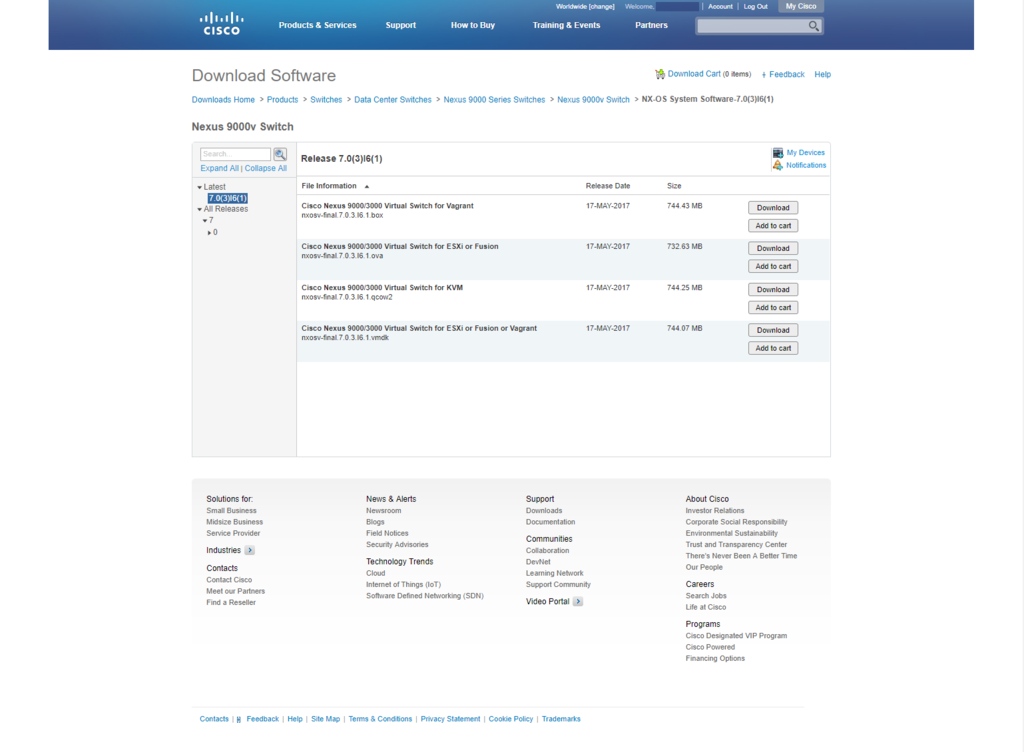

GNS3 の MARKETPLACE から Nexus9000v 用の テンプレートファイル取得
以下のリンクから DOWNLOAD TEMPLATE をポチッて cisco-nxosv9k.gns3a を取得します(完)
テンプレートファイルをインポート
いつも通り GNS3 の適当なプロジェクトを開いたら、先ほど取得した cisco-nxosv9k.gns3a をインポートします。
GNS3 の File -> Import appliance を押して後は流れで…って感じですが、必要に応じて GNS3 公式 / Import GNS3 appliance に画面キャプチャ付の公式手順もございますので、そちらも合わせてご参照くださいませ。





これで GNS3 のテンプレートとして All devices に Cisco NX-OSv 9000 7.0.3.I6.1 ができあがります。
手動でやる時には、以下あたりと睨めっこしながら試行錯誤して…というのがお決まりの流れだと思うんですが、そこをサボッたのがこの手順です。
- Cisco 公式 / NX-OSv 9000 Resource Requirements
- requirement 的なやつ
- Cisco 公式 / NX-OSv 9000 KVM-QEMU Support Information
- Cisco 公式 / NX-OSv 9000 NX-OSv 9000 Installation/Deployment
- 各種Hypervisor向けインストール時パラメータ詳説
KVM版だとqemu-system-x86_64に必要なパラメータが懇切丁寧に記載されている
ちゃんと動くお手本パラメータとして使う、ってのもありかもですね。
テンプレートからデプロイ~起動
いつも通りにテンプレート(all devices)からD&Dでデプロイします。
なお、GNS3 MARKETPLACE から取得したテンプレートは前述の公式パラメータに完全に沿ったものになっていますので、メモリを 4GB に減らすなり用途に応じたチューニングはお好きなように。
$ ps aux | grep [N]X-OS root 17924 12.7 1.1 9240844 367620 pts/12 Sl+ 02:26 0:05 /usr/bin/qemu-system-x86_64 -name CiscoNX-OSv90007.0.3.I6.1-1 -m 8096M -smp cpus=2 -enable-kvm -machine smm=off -boot order=c -bios /home/kotetsu/GNS3/images/QEMU/OVMF-20160813.fd -device ahci,id=ahci0,bus=pci.0 -drive file=/home/kotetsu/GNS3/projects/700/project-files/qemu/f8111e6a-9fd1-4f1b-9fd6-a3c9a42b0ff3/hda_disk.qcow2,if=none,id=drive-sata-disk0,index=0,media=disk -device ide-drive,drive=drive-sata-disk0,bus=ahci0.0,id=drive-sata-disk0 -uuid f8111e6a-9fd1-4f1b-9fd6-a3c9a42b0ff3 -serial telnet:127.0.0.1:5004,server,nowait -monitor tcp:127.0.0.1:54313,server,nowait -net none -device e1000,mac=00:21:96:0f:f3:00,netdev=gns3-0 -netdev socket,id=gns3-0,udp=127.0.0.1:10019,localaddr=0.0.0.0:10018 -device e1000,mac=00:21:96:0f:f3:01,netdev=gns3-1 -netdev socket,id=gns3-1,udp=127.0.0.1:10021,localaddr=0.0.0.0:10020 -device e1000,mac=00:21:96:0f:f3:02,netdev=gns3-2 -netdev socket,id=gns3-2,udp=127.0.0.1:10023,localaddr=0.0.0.0:10022 -device e1000,mac=00:21:96:0f:f3:03,netdev=gns3-3 -netdev socket,id=gns3-3,udp=127.0.0.1:10025,localaddr=0.0.0.0:10024 -device e1000,mac=00:21:96:0f:f3:04,netdev=gns3-4 -netdev socket,id=gns3-4,udp=127.0.0.1:10027,localaddr=0.0.0.0:10026 -device e1000,mac=00:21:96:0f:f3:05,netdev=gns3-5 -netdev socket,id=gns3-5,udp=127.0.0.1:10029,localaddr=0.0.0.0:10028 -device e1000,mac=00:21:96:0f:f3:06,netdev=gns3-6 -netdev socket,id=gns3-6,udp=127.0.0.1:10031,localaddr=0.0.0.0:10030 -device e1000,mac=00:21:96:0f:f3:07,netdev=gns3-7 -netdev socket,id=gns3-7,udp=127.0.0.1:10033,localaddr=0.0.0.0:10032 -device e1000,mac=00:21:96:0f:f3:08,netdev=gns3-8 -netdev socket,id=gns3-8,udp=127.0.0.1:10035,localaddr=0.0.0.0:10034 -device e1000,mac=00:21:96:0f:f3:09,netdev=gns3-9 -netdev socket,id=gns3-9,udp=127.0.0.1:10037,localaddr=0.0.0.0:10036 -nographic




んで、起動してコンソールを見守ると、以下のように ZTP ライクなものが走りだします
2017 Aug 16 17:29:15 switch %$ VDC-1 %$ %POAP-2-POAP_INFO: [90SNLUQJ25I-00:21:96:0F:F3:07] - USB Initializing Success 2017 Aug 16 17:29:15 switch %$ VDC-1 %$ %POAP-2-POAP_INFO: [90SNLUQJ25I-00:21:96:0F:F3:07] - USB disk not detected 2017 Aug 16 17:29:15 switch %$ VDC-1 %$ last message repeated 1 time 2017 Aug 16 17:29:15 switch %$ VDC-1 %$ %POAP-2-POAP_DHCP_DISCOVER_START: [90SNLUQJ25I-00:21:96:0F:F3:07] - POAP DHCP Discover phase started 2017 Aug 16 17:29:16 switch %$ VDC-1 %$ %POAP-2-POAP_INFO: [90SNLUQJ25I-00:21:96:0F:F3:07] - Invalid DHCP OFFER from 0.0.0.0: Missing Script Server information 2017 Aug 16 17:29:16 switch %$ VDC-1 %$ %POAP-2-POAP_INFO: [90SNLUQJ25I-00:21:96:0F:F3:07] - Invalid DHCP OFFER from 0.0.0.0: Missing Script Name 2017 Aug 16 17:29:20 switch %$ VDC-1 %$ %ASCII-CFG-2-CONF_CONTROL: System ready 2017 Aug 16 17:29:20 switch %$ VDC-1 %$ %POAP-2-POAP_INFO: [90SNLUQJ25I-00:21:96:0F:F3:07] - Invalid DHCP OFFER from 0.0.0.0: Missing Script Server information 2017 Aug 16 17:29:20 switch %$ VDC-1 %$ %POAP-2-POAP_INFO: [90SNLUQJ25I-00:21:96:0F:F3:07] - Invalid DHCP OFFER from 0.0.0.0: Missing Script Name 2017 Aug 16 17:29:26 switch %$ VDC-1 %$ %POAP-2-POAP_FAILURE: [90SNLUQJ25I-00:21:96:0F:F3:07] - POAP DHCP discover phase failed 2017 Aug 16 17:29:38 switch %$ VDC-1 %$ %POAP-2-POAP_INFO: [90SNLUQJ25I-00:21:96:0F:F3:07] - USB Initializing Success 2017 Aug 16 17:29:38 switch %$ VDC-1 %$ %POAP-2-POAP_INFO: [90SNLUQJ25I-00:21:96:0F:F3:07] - USB disk not detected
ひたすらループするので、以下の出力で y して止めて
Abort Auto Provisioning and continue with normal setup ?(yes/no)[n]: y Disabling POAP
admin ユーザ用のパスワード設定とかを対話でやると、初期ログイン可能になります。
Abort Auto Provisioning and continue with normal setup ?(yes/no)[n]: y
Disabling POAP
---- System Admin Account Setup ----
Do you want to enforce secure password standard (yes/no) [y]:
Enter the password for "admin":
Wrong Password, Reason:
[Length should be at least 8 characters]
Invalid admin password.
Enter the password for "admin":
Confirm the password for "admin":
---- Basic System Configuration Dialog VDC: 1 ----
This setup utility will guide you through the basic configuration of
the system. Setup configures only enough connectivity for management
of the system.
Please register Cisco Nexus9000 Family devices promptly with your
supplier. Failure to register may affect response times for initial
service calls. Nexus9000 devices must be registered to receive
entitled support services.
Press Enter at anytime to skip a dialog. Use ctrl-c at anytime
to skip the remaining dialogs.
Would you like to enter the basic configuration dialog (yes/no):
2017 Aug 16 17:33:45 switch %$ VDC-1 %$ %ACLQOS-SLOT1-2-ACLQOS_FAILED: ACLQOS failure: TCAM region is not configured for feature QoS class IPv4 direction ingress. Please configure TCAM region Ingress COPP [copp] and retry the command.
Error: There was an error executing atleast one of the command
Please verify the following log for the command execution errors.
TCAM region is not configured. Please configure TCAM region and retry the command
User Access Verification
User Access Verification
login: admin
Password:
Cisco NX-OS Software
Copyright (c) 2002-2017, Cisco Systems, Inc. All rights reserved.
NX-OSv9K software ("NX-OSv9K Software") and related documentation,
files or other reference materials ("Documentation") are
the proprietary property and confidential information of Cisco
Systems, Inc. ("Cisco") and are protected, without limitation,
pursuant to United States and International copyright and trademark
laws in the applicable jurisdiction which provide civil and criminal
penalties for copying or distribution without Cisco's authorization.
Any use or disclosure, in whole or in part, of the NX-OSv9K Software
or Documentation to any third party for any purposes is expressly
prohibited except as otherwise authorized by Cisco in writing.
The copyrights to certain works contained herein are owned by other
third parties and are used and distributed under license. Some parts
of this software may be covered under the GNU Public License or the
GNU Lesser General Public License. A copy of each such license is
available at
http://www.gnu.org/licenses/gpl.html and
http://www.gnu.org/licenses/lgpl.html
***************************************************************************
* NX-OSv9K is strictly limited to use for evaluation, demonstration *
* and NX-OS education. Any use or disclosure, in whole or in part of *
* the NX-OSv9K Software or Documentation to any third party for any *
* purposes is expressly prohibited except as otherwise authorized by *
* Cisco in writing. *
***************************************************************************
switch#
switch# show ver
Cisco Nexus Operating System (NX-OS) Software
TAC support: http://www.cisco.com/tac
Documents: http://www.cisco.com/en/US/products/ps9372/tsd_products_support_serie
s_home.html
Copyright (c) 2002-2017, Cisco Systems, Inc. All rights reserved.
The copyrights to certain works contained herein are owned by
other third parties and are used and distributed under license.
Some parts of this software are covered under the GNU Public
License. A copy of the license is available at
http://www.gnu.org/licenses/gpl.html.
NX-OSv9K is a demo version of the Nexus Operating System
Software
BIOS: version
NXOS: version 7.0(3)I6(1)
BIOS compile time:
NXOS image file is: bootflash:///nxos.7.0.3.I6.1.bin
NXOS compile time: 5/16/2017 22:00:00 [05/17/2017 06:21:28]
Hardware
cisco NX-OSv Chassis
with 8062148 kB of memory.
Processor Board ID 90SNLUQJ25I
Device name: switch
bootflash: 3509454 kB
Kernel uptime is 0 day(s), 19 hour(s), 48 minute(s), 5 second(s)
Last reset
Reason: Unknown
System version:
Service:
plugin
Core Plugin, Ethernet Plugin
Active Package(s):
ほい、お疲れ様でしたー。
bootイメージ設定
Cisco 公式 / Troubleshooting the NX-OSv 9000 / How to prevent VM from dropping into “loader >” prompt にあるように、起動イメージを忘れずに設定しないと次回起動時に loader で止まってしまいますよ、って話
初期状態は以下なので
switch# show boot
Current Boot Variables:
sup-1
NXOS variable not set
No module boot variable set
Boot Variables on next reload:
sup-1
NXOS variable not set
No module boot variable set
switch# dir bootflash:
4096 Aug 16 17:27:42 2017 .rpmstore/
4096 Aug 16 17:27:53 2017 .swtam/
38575 Aug 16 17:32:16 2017 20170816_172847_poap_26000_init.log
759941120 May 17 06:46:25 2017 nxos.7.0.3.I6.1.bin
0 Aug 16 17:35:04 2017 platform-sdk.cmd
4096 Aug 16 17:28:44 2017 scripts/
4096 Aug 16 17:28:45 2017 virt_strg_pool_bf_vdc_1/
4096 Aug 16 17:28:06 2017 virtual-instance/
59 Aug 16 17:27:57 2017 virtual-instance.conf
Usage for bootflash://sup-local
1158098944 bytes used
2379120640 bytes free
3537219584 bytes total
以下のように boot イメージを指定しておきましょう。
switch# configure terminal Enter configuration commands, one per line. End with CNTL/Z. switch(config)# switch(config)# boot nxos nxos.7.0.3.I6.1.bin Performing image verification and compatibility check, please wait.... switch(config)# switch(config)# end switch# switch# copy running-config startup-config [########################################] 100% Copy complete.
そーいや copy run start はその内なくなる、みたいな話を IOS 時代に見たような気もするんですが、どうなんでしたっけ…。
ともかく、これで再起動してもちゃんと OS が読み込まれます。reload でも実行して、動作確認しておきましょう。
switch# show boot Current Boot Variables: sup-1 NXOS variable = bootflash:/nxos.7.0.3.I6.1.bin No module boot variable set Boot Variables on next reload: sup-1 NXOS variable = bootflash:/nxos.7.0.3.I6.1.bin No module boot variable set
完
お手軽手順に逃げてインストールしただけなので、別に…
仮想版をユーザ制限なくダウンロードさせてもらったから言うわけじゃないですが、Nexus9000 はデータセンタスイッチとしてはなかなか良さげですよ!!
ブログサービス移行
はてなブログに引っ越してきました。
「インフラ屋さんなら自前鯖でWebサービスくらい公開せーや、ブログサービスなんて甘え」ってのはごもっともですが…。
移行元はプログラミング情報共有サービス的な感じだったんですが、僕のプログラミング要素が薄すぎて…。
2014/11-2017/03 の期間に公開した記事で、今となっては内容が古すぎる記事も多いのですが、その旨の注記を添えてこちらに移行しておきました。
移行元も先も Markdown 形式でコピペするだけだったので、とっても楽でした。(図だけはこちらにアップしなおしましたが)
ちなみに、プログラミング要素が大変うっすいアカウントの投稿内訳はこちら↓


Cumulus VX で VXLAN+EVPN (original : 2017/03/22)
この記事は某所で 2017/03/22 に書いた記事のコピーです。
そのため 2017/05/11 時点ではやや古い情報も含まれています。(2017/05 に GNS3 v2.0.0 stable や Cumulus Linux v3.3 がリリースされた)
- 最初に
- 構築
- 動作確認
- おしまい
最初に
本項でやること
以下をやります。
- Cumulus Linux の Early Access 版(
2017/03/21時点)で限定的に VXLAN+EVPN 機能を試行できるので、仮想版である Cumulus VX でも動くか見る- 将来的に本実装された際には、設定方法や挙動は変わる筈
- 現在取得できる EA 版は Quagga daemon のみなので、EVPN機能周りの設定や参照は Quagga にて
- EVPN Multihoming を実装していない代わりに、MLAGでVTEPを冗長化する仕組みがあるようなので、その設定と挙動を見る
環境情報
Cumulus VX
Cumulus公式 / Download Cumulus VX で 2017/03/13 時点でダウンロード可能な最新版(Cumulus VX 3.2.1)の KVM 版
アカウントを作れば、個人でも特に問題なくダウンロードできました。
kotetsu@kvm01:~/vm_images/qemu$ ls -al cumulus-linux-3.2.1-vx-amd64-1486153138.ac46c24zd00d13e.qcow2 -rw-r--r-- 1 kotetsu kotetsu 1232601088 Mar 7 22:11 cumulus-linux-3.2.1-vx-amd64-1486153138.ac46c24zd00d13e.qcow2 kotetsu@kvm01:~/vm_images/qemu$ sha1sum cumulus-linux-3.2.1-vx-amd64-1486153138.ac46c24zd00d13e.qcow2 3d782f2c450683b4da5ea2324c88f3dccb89b6c2 cumulus-linux-3.2.1-vx-amd64-1486153138.ac46c24zd00d13e.qcow2
kotetsu@bb03:~$ cat /etc/lsb-release DISTRIB_ID="Cumulus Linux" DISTRIB_RELEASE=3.2.1 DISTRIB_DESCRIPTION="Cumulus Linux 3.2.1" kotetsu@bb03:~$ uname -a Linux bb03 4.1.0-cl-4-amd64 #1 SMP Debian 4.1.33-1+cl3u7 (2017-01-26) x86_64 GNU/Linux
その他
$ uname -a Linux kvm01 4.4.0-57-generic #78-Ubuntu SMP Fri Dec 9 23:50:32 UTC 2016 x86_64 x86_64 x86_64 GNU/Linux $ cat /etc/lsb-release DISTRIB_ID=Ubuntu DISTRIB_RELEASE=16.04 DISTRIB_CODENAME=xenial DISTRIB_DESCRIPTION="Ubuntu 16.04.1 LTS" $ virsh -v 1.3.1 $ qemu-system-x86_64 --version QEMU emulator version 2.5.0 (Debian 1:2.5+dfsg-5ubuntu10.6), Copyright (c) 2003-2008 Fabrice Bellard $ gns3 --version 1.5.2
参考資料
- Cumulus公式 / Using GNS3 with QEMU and KVM Virtual Machines
- これを見れば KVM + GNS3 で Cumulus VX を動かすところまでは問題ない筈
- Cumulus公式 / Download Cumulus VX
- イメージのダウンロードリンク
- Cumulus公式 / Cumulus Linux 3.2.1 Release Notes
- Early Access Features として EVPN が載っている
- Cumulus公式 / Ethernet Virtual Private Network - EVPN
- EVPN requires Cumulus Linux version 3.2.1 or newer.
- 現時点のEVPN回りのマニュアル
- 例示環境では BGP unnumbered を使っている
- Cumulus公式 / EVPN for controller-less VXLAN
- white paper
構築
以下のような環境を作ります。
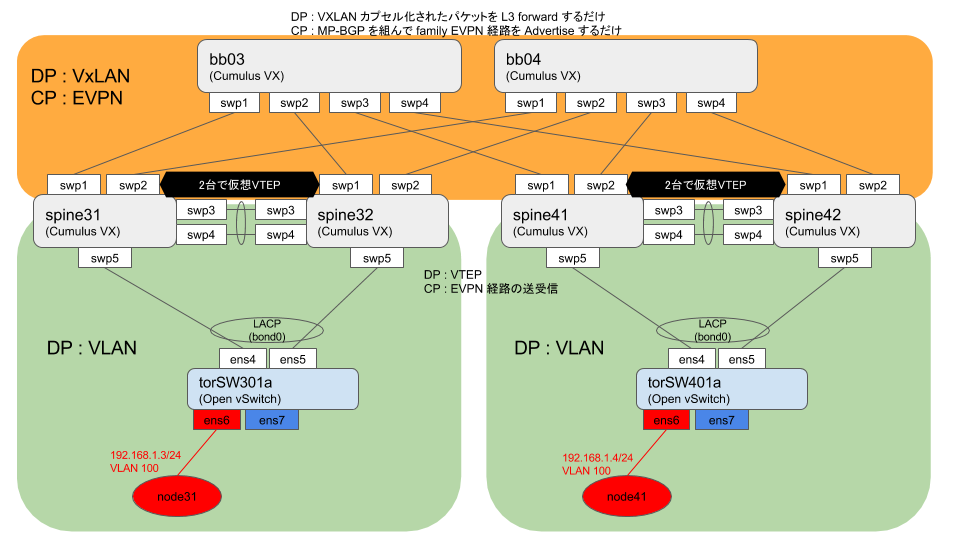
GNS3 でデプロイ
以下の感じでデプロイしていきます。(陰っているところは、相互接続実験するための既存環境なので無視)
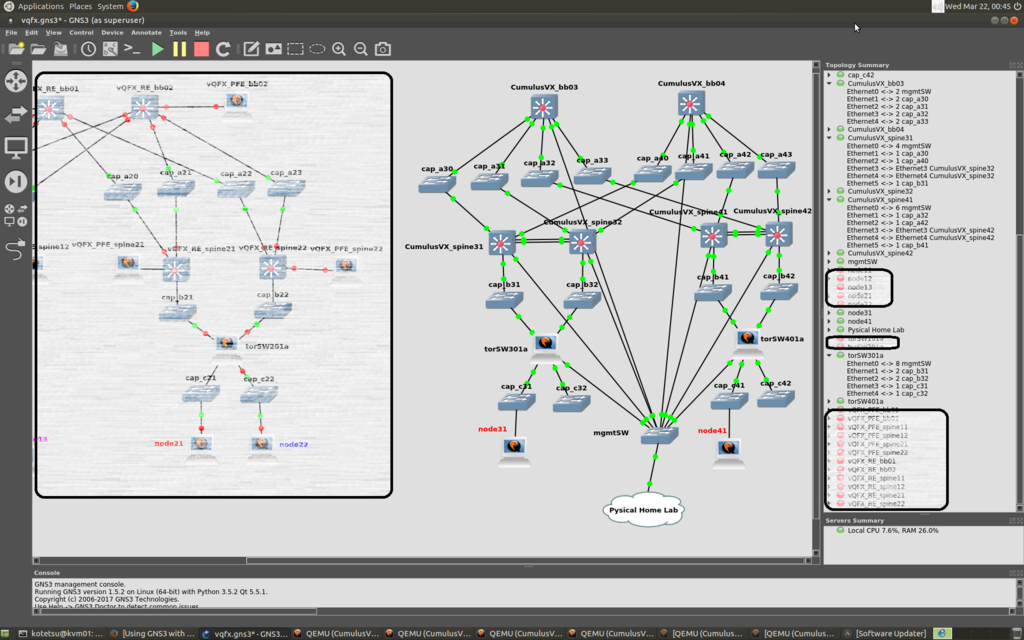
Cumulus VX に関しては、以下の公式docに従ってポチポチしとけばよいでしょー。
自分の環境では以下程度で十分でした。
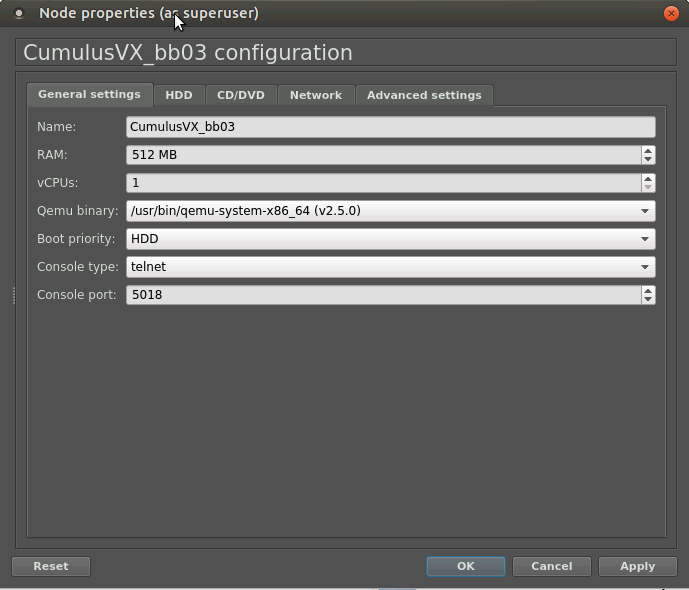
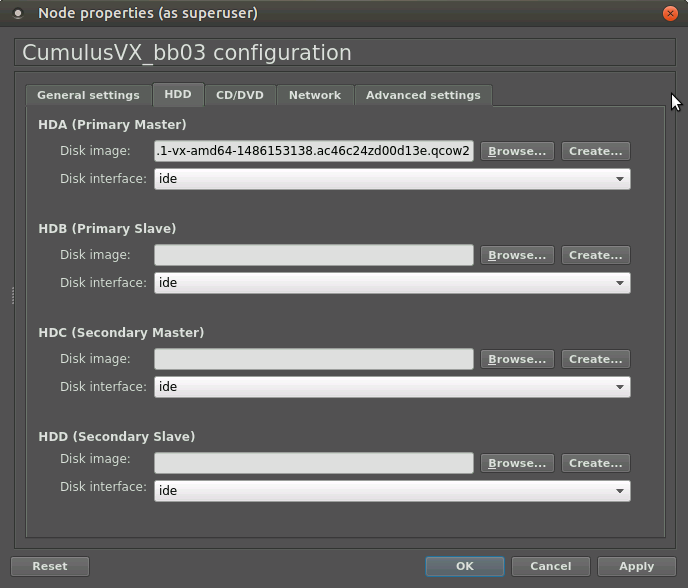
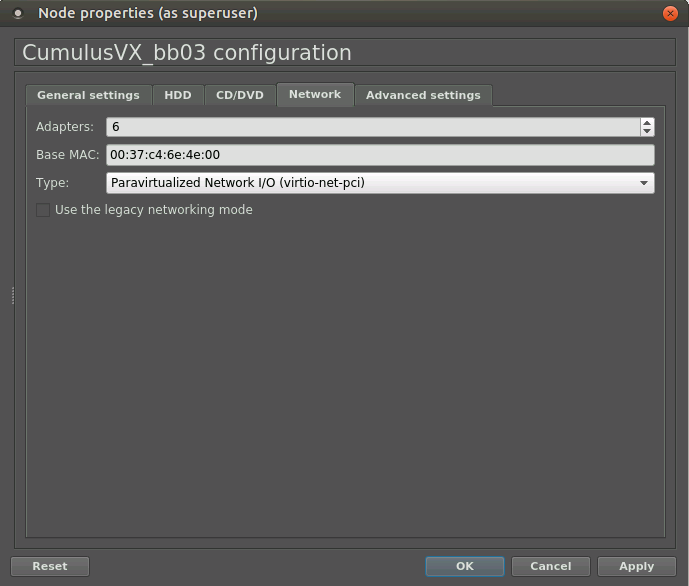
kotetsu@kvm01:~$ ps aux | grep [C]umulus root 28241 2.5 1.3 1417576 445408 pts/12 Sl+ 20:32 0:20 /usr/bin/qemu-system-x86_64 -name CumulusVX_bb03 -m 512M -smp cpus=1 -enable-kvm -boot order=c -drive file=/home/kotetsu/GNS3/projects/vqfx/project-files/qemu/25f56fdc-48e7-4622-be73-bf98d5686e4e/hda_disk.qcow2,if=ide,index=0,media=disk -serial telnet:127.0.0.1:5018,server,nowait -monitor tcp:127.0.0.1:37529,server,nowait -net none -device virtio-net-pci,mac=00:37:c4:6e:4e:00,netdev=gns3-0 -netdev socket,id=gns3-0,udp=127.0.0.1:10102,localaddr=127.0.0.1:10103 -device virtio-net-pci,mac=00:37:c4:6e:4e:01,netdev=gns3-1 -netdev socket,id=gns3-1,udp=127.0.0.1:10125,localaddr=127.0.0.1:10124 -device virtio-net-pci,mac=00:37:c4:6e:4e:02,netdev=gns3-2 -netdev socket,id=gns3-2,udp=127.0.0.1:10129,localaddr=127.0.0.1:10128 -device virtio-net-pci,mac=00:37:c4:6e:4e:03,netdev=gns3-3 -netdev socket,id=gns3-3,udp=127.0.0.1:10133,localaddr=127.0.0.1:10132 -device virtio-net-pci,mac=00:37:c4:6e:4e:04,netdev=gns3-4 -netdev socket,id=gns3-4,udp=127.0.0.1:10137,localaddr=127.0.0.1:10136 -device virtio-net-pci,mac=00:37:c4:6e:4e:05
周辺機器設定
torSW[34]01a (Open vSwitch) 設定
Open vSwitch の導入なんかは、適当に公式ドキュメントを見て進めて頂くとして。(雑)
以下のような設定をしておけば良いですよ。今回は Open vSwitch を使っていますが、ここに置くのは LACP と VLAN が動けばなんでもよいので、適当に各々が使いやすいやつを入れればよいかと。(勿論Cumulus VXでもok)
torSW[12]01a共通
# ovs-vsctl --no-wait init # ovs-vsctl add-br br0 # ovs-vsctl set bridge br0 datapath_type=netdev # ovs-vsctl add-bond br0 bond0 ens4 ens5 lacp=active bond_mode=balance-slb other_config:lacp-time=fast # ovs-vsctl add-port br0 ens6 tag=100 # ovs-vsctl add-port br0 ens7 tag=200 # ip link set dev br0 up # ip link set dev ens4 up # ip link set dev ens5 up # ip link set dev ens6 up # ip link set dev ens7 up
通信確認用 node[34]1 設定
通信できりゃー何でもよいです。(雑)
kotetsu@node31:~$ ip a show dev ens4
3: ens4: <BROADCAST,MULTICAST,UP,LOWER_UP> mtu 1500 qdisc pfifo_fast state UP group default qlen 1000
link/ether 00:37:c4:55:09:01 brd ff:ff:ff:ff:ff:ff
inet 192.168.1.3/24 brd 192.168.1.255 scope global ens4
valid_lft forever preferred_lft forever
inet6 fe80::237:c4ff:fe55:901/64 scope link
valid_lft forever preferred_lft forever
kotetsu@node41:~$ ip a show dev ens4
3: ens4: <BROADCAST,MULTICAST,UP,LOWER_UP> mtu 1500 qdisc pfifo_fast state UP group default qlen 1000
link/ether 00:37:c4:56:b4:01 brd ff:ff:ff:ff:ff:ff
inet 192.168.1.4/24 brd 192.168.1.255 scope global ens4
valid_lft forever preferred_lft forever
inet6 fe80::237:c4ff:fe56:b401/64 scope link
valid_lft forever preferred_lft forever
Cumulus VX 初期設定
ログインアカウント/パスワードは Cumulus公式 / Using Cumulus VX with KVM に書いてある通り、ユーザ cumulus パスワード CumulusLinux! で
あとは
らへんを見ながら適当に...hostname、操作用ユーザ作成とssh鍵登録、syslog、timezone, ntp などの設定を環境に合わせた感じでどうぞ。
追加したユーザで net コマンド各種を使いたい場合は /etc/netd.conf で許可するユーザ、グループ設定を適宜編集して反映 (Cumulus公式 / Network Command Line Utility / Adding More NCLU Users or Groups)
Cumulus VX 物理IF/BGP設定
以下のような感じのを作っていきます。
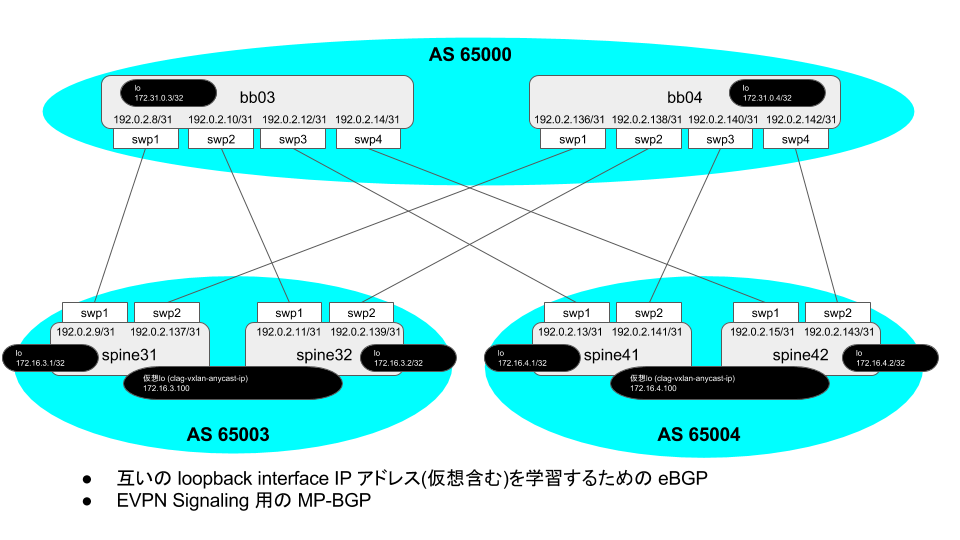
物理IF
Cumulus公式 / Interface Configuration and Management あたりを参考に、まずはBGP構成をとるための物理IF設定を。
- bb03
net add interface swp1 alias DEV=spine31 IF=swp1 net add interface swp1 mtu 9216 net add interface swp1 ip address 192.0.2.8/31 net add interface swp2 alias DEV=spine32 IF=swp1 net add interface swp2 mtu 9216 net add interface swp2 ip address 192.0.2.10/31 net add interface swp3 alias DEV=spine41 IF=swp1 net add interface swp3 mtu 9216 net add interface swp3 ip address 192.0.2.12/31 net add interface swp4 alias DEV=spine42 IF=swp1 net add interface swp4 mtu 9216 net add interface swp4 ip address 192.0.2.14/31 net commit
kotetsu@bb03:~$ net show interface all
Name Speed MTU Mode Summary
----- -------------------------- ------- ----- ------------- ------------------------
UP lo N/A 65536 Loopback IP: 127.0.0.1/8, ::1/128
UP eth0 1G 1500 Mgmt IP: 10.0.0.193/24
UP swp1 (DEV=spine31 IF=swp1) 1G 9216 Interface/L3 IP: 192.0.2.8/31
UP swp2 (DEV=spine32 IF=swp1) 1G 9216 Interface/L3 IP: 192.0.2.10/31
UP swp3 (DEV=spine41 IF=swp1) 1G 9216 Interface/L3 IP: 192.0.2.12/31
UP swp4 (DEV=spine42 IF=swp1) 1G 9216 Interface/L3 IP: 192.0.2.14/31
ADMDN swp5 0M 1500 NotConfigured
kotetsu@bb03:~$ cat /etc/network/interfaces
# This file describes the network interfaces available on your system
# and how to activate them. For more information, see interfaces(5).
source /etc/network/interfaces.d/*.intf
# The loopback network interface
auto lo
iface lo inet loopback
# The primary network interface
auto eth0
iface eth0
address 10.0.0.193/24
gateway 10.0.0.254
auto swp1
iface swp1
address 192.0.2.8/31
alias DEV=spine31 IF=swp1
mtu 9216
auto swp2
iface swp2
address 192.0.2.10/31
alias DEV=spine32 IF=swp1
mtu 9216
auto swp3
iface swp3
address 192.0.2.12/31
alias DEV=spine41 IF=swp1
mtu 9216
auto swp4
iface swp4
address 192.0.2.14/31
alias DEV=spine42 IF=swp1
mtu 9216
- bb04
net add interface swp1 alias DEV=spine31 IF=swp2 net add interface swp1 mtu 9216 net add interface swp1 ip address 192.0.2.136/31 net add interface swp2 alias DEV=spine32 IF=swp2 net add interface swp2 mtu 9216 net add interface swp2 ip address 192.0.2.138/31 net add interface swp3 alias DEV=spine41 IF=swp2 net add interface swp3 mtu 9216 net add interface swp3 ip address 192.0.2.140/31 net add interface swp4 alias DEV=spine42 IF=swp2 net add interface swp4 mtu 9216 net add interface swp4 ip address 192.0.2.142/31 net commit
- spine31
net add interface swp1 alias DEV=bb03 IF=swp1 net add interface swp1 mtu 9216 net add interface swp1 ip address 192.0.2.9/31 net add interface swp2 alias DEV=bb04 IF=swp1 net add interface swp2 mtu 9216 net add interface swp2 ip address 192.0.2.137/31 net commit
- spine32
net add interface swp1 alias DEV=bb03 IF=swp2 net add interface swp1 mtu 9216 net add interface swp1 ip address 192.0.2.11/31 net add interface swp2 alias DEV=bb04 IF=swp2 net add interface swp2 mtu 9216 net add interface swp2 ip address 192.0.2.139/31 net commit
- spine41
net add interface swp1 alias DEV=bb03 IF=swp3 net add interface swp1 mtu 9216 net add interface swp1 ip address 192.0.2.13/31 net add interface swp2 alias DEV=bb04 IF=swp3 net add interface swp2 mtu 9216 net add interface swp2 ip address 192.0.2.141/31 net commit
- spine42
net add interface swp1 alias DEV=bb03 IF=swp4 net add interface swp1 mtu 9216 net add interface swp1 ip address 192.0.2.15/31 net add interface swp2 alias DEV=bb04 IF=swp4 net add interface swp2 mtu 9216 net add interface swp2 ip address 192.0.2.143/31 net commit
Early Access版Quagga導入
デフォルトは以下の感じなので Cumulus公式 / Ethernet Virtual Private Network - EVPN / Installing the EVPN Package に従い、Early Access版の Quagga を入れる。
kotetsu@bb03:~$ dpkg -l quagga Desired=Unknown/Install/Remove/Purge/Hold | Status=Not/Inst/Conf-files/Unpacked/halF-conf/Half-inst/trig-aWait/Trig-pend |/ Err?=(none)/Reinst-required (Status,Err: uppercase=bad) ||/ Name Version Architecture Description +++-=======================-================-================-==================================================== ii quagga 1.0.0+cl3u7 amd64 BGP/OSPF/RIP routing daemon
kotetsu@bb03:~$ grep -E "CumulusLinux-3-early-access" /etc/apt/sources.list #deb http://repo3.cumulusnetworks.com/repo CumulusLinux-3-early-access cumulus #deb-src http://repo3.cumulusnetworks.com/repo CumulusLinux-3-early-access cumulus
kotetsu@bb03:~$ sudo sed -i -e '/CumulusLinux-3-early-access/ s/^#//g' /etc/apt/sources.list
kotetsu@bb03:~$ sudo apt update kotetsu@bb03:~$ sudo apt install -y cumulus-evpn kotetsu@bb03:~$ sudo apt upgrade
kotetsu@bb03:~$ dpkg -l quagga Desired=Unknown/Install/Remove/Purge/Hold | Status=Not/Inst/Conf-files/Unpacked/halF-conf/Half-inst/trig-aWait/Trig-pend |/ Err?=(none)/Reinst-required (Status,Err: uppercase=bad) ||/ Name Version Architecture Description +++-=======================-================-================-==================================================== ii quagga 1.0.0+cl3eau8 amd64 BGP/OSPF/RIP routing daemon
Quagga起動設定
デフォルトは以下の感じなので Cumulus公式 / Configuring Cumulus Quagga あたりを参考に、全台で起動設定を。
kotetsu@bb03:~$ grep -Ev "^#" /etc/quagga/daemons zebra=no bgpd=no ospfd=no ospf6d=no ripd=no ripngd=no isisd=n
起動デーモン設定で zebra と bgpd を yes に変えて
kotetsu@bb03:~$ sudo sed -r -i -e 's/(zebra|bgpd)=no/\1=yes/g' /etc/quagga/daemons
自動起動設定して起動
kotetsu@bb03:~$ sudo systemctl enable quagga.service kotetsu@bb03:~$ sudo systemctl start quagga.service
kotetsu@bb03:~$ sudo systemctl status quagga.service ... Active: active (running) since Mon 2017-03-20 10:52:25 JST; 4s ago Mar 20 10:52:24 spine41 quagga[30608]: Starting Quagga daemons (prio:10):. zebra. bgpd. Mar 20 10:52:24 spine41 bgpd[30631]: BGPd 1.0.0+cl3eau8 starting: vty@2605, bgp@<all>:179 Mar 20 10:52:24 spine41 zebra[30624]: client 12 says hello and bids fair to announce only bgp routes Mar 20 10:52:24 spine41 watchquagga[30638]: watchquagga 1.0.0+cl3eau8 watching [zebra bgpd], mode [phased zebra restart] Mar 20 10:52:24 spine41 watchquagga[30638]: bgpd state -> up : connect succeeded Mar 20 10:52:25 spine41 watchquagga[30638]: zebra state -> up : connect succeeded Mar 20 10:52:25 spine41 watchquagga[30638]: Watchquagga: Notifying Systemd we are up and running Mar 20 10:52:25 spine41 quagga[30608]: Starting Quagga monitor daemon: watchquagga. Mar 20 10:52:25 spine41 quagga[30608]: Exiting from the script Mar 20 10:52:25 spine41 systemd[1]: Started Cumulus Linux Quagga.
eBGP設定
bb03
net add loopback lo ip address 172.31.0.3/32 net add bgp autonomous-system 65000 net add bgp router-id 172.31.0.3 net add routing prefix-list ipv4 PL_LO_CLOS seq 10 permit 172.16.0.0/12 ge 32 le 32 net add routing prefix-list ipv4 PL_LO_CLOS seq 20 permit 192.0.2.0/24 ge 31 le 31 net add bgp redistribute connected net add bgp neighbor PEER_SPINE peer-group net add bgp neighbor PEER_SPINE prefix-list PL_LO_CLOS out net add bgp neighbor PEER_SPINE next-hop-self net add bgp neighbor 192.0.2.9 remote-as 65003 net add bgp neighbor 192.0.2.9 description spine31 net add bgp neighbor 192.0.2.9 peer-group PEER_SPINE net add bgp neighbor 192.0.2.11 remote-as 65003 net add bgp neighbor 192.0.2.11 description spine32 net add bgp neighbor 192.0.2.11 peer-group PEER_SPINE net add bgp neighbor 192.0.2.13 remote-as 65004 net add bgp neighbor 192.0.2.13 description spine41 net add bgp neighbor 192.0.2.13 peer-group PEER_SPINE net add bgp neighbor 192.0.2.15 remote-as 65004 net add bgp neighbor 192.0.2.15 description spine42 net add bgp neighbor 192.0.2.15 peer-group PEER_SPINE
bb04
net add loopback lo ip address 172.31.0.4/32 net add bgp autonomous-system 65000 net add bgp router-id 172.31.0.4 net add routing prefix-list ipv4 PL_LO_CLOS seq 10 permit 172.16.0.0/12 ge 32 le 32 net add routing prefix-list ipv4 PL_LO_CLOS seq 20 permit 192.0.2.0/24 ge 31 le 31 net add bgp redistribute connected net add bgp neighbor PEER_SPINE peer-group net add bgp neighbor PEER_SPINE prefix-list PL_LO_CLOS out net add bgp neighbor 192.0.2.137 remote-as 65003 net add bgp neighbor 192.0.2.137 description spine31 net add bgp neighbor 192.0.2.137 peer-group PEER_SPINE net add bgp neighbor 192.0.2.139 remote-as 65003 net add bgp neighbor 192.0.2.139 description spine32 net add bgp neighbor 192.0.2.139 peer-group PEER_SPINE net add bgp neighbor 192.0.2.141 remote-as 65004 net add bgp neighbor 192.0.2.141 description spine41 net add bgp neighbor 192.0.2.141 peer-group PEER_SPINE net add bgp neighbor 192.0.2.143 remote-as 65004 net add bgp neighbor 192.0.2.143 description spine42 net add bgp neighbor 192.0.2.143 peer-group PEER_SPINE
spine31
net add loopback lo ip address 172.16.3.1/32 net add bgp autonomous-system 65003 net add bgp router-id 172.16.3.1 net add routing prefix-list ipv4 PL_LO_CLOS seq 10 permit 172.16.0.0/12 ge 32 le 32 net add routing prefix-list ipv4 PL_LO_CLOS seq 20 permit 192.0.2.0/24 ge 31 le 31 net add bgp redistribute connected net add bgp neighbor PEER_BB peer-group net add bgp neighbor PEER_BB prefix-list PL_LO_CLOS out net add bgp neighbor 192.0.2.8 remote-as 65000 net add bgp neighbor 192.0.2.8 description bb03 net add bgp neighbor 192.0.2.8 peer-group PEER_BB net add bgp neighbor 192.0.2.136 remote-as 65000 net add bgp neighbor 192.0.2.136 description bb04 net add bgp neighbor 192.0.2.136 peer-group PEER_BB
spine32
net add loopback lo ip address 172.16.3.2/32 net add bgp autonomous-system 65003 net add bgp router-id 172.16.3.2 net add routing prefix-list ipv4 PL_LO_CLOS seq 10 permit 172.16.0.0/12 ge 32 le 32 net add routing prefix-list ipv4 PL_LO_CLOS seq 20 permit 192.0.2.0/24 ge 31 le 31 net add bgp redistribute connected net add bgp neighbor PEER_BB peer-group net add bgp neighbor PEER_BB prefix-list PL_LO_CLOS out net add bgp neighbor 192.0.2.10 remote-as 65000 net add bgp neighbor 192.0.2.10 description bb03 net add bgp neighbor 192.0.2.10 peer-group PEER_BB net add bgp neighbor 192.0.2.138 remote-as 65000 net add bgp neighbor 192.0.2.138 description bb04 net add bgp neighbor 192.0.2.138 peer-group PEER_BB
spine41
net add loopback lo ip address 172.16.4.1/32 net add bgp autonomous-system 65004 net add bgp router-id 172.16.4.1 net add routing prefix-list ipv4 PL_LO_CLOS seq 10 permit 172.16.0.0/12 ge 32 le 32 net add routing prefix-list ipv4 PL_LO_CLOS seq 20 permit 192.0.2.0/24 ge 31 le 31 net add bgp redistribute connected net add bgp neighbor PEER_BB peer-group net add bgp neighbor PEER_BB prefix-list PL_LO_CLOS out net add bgp neighbor 192.0.2.12 remote-as 65000 net add bgp neighbor 192.0.2.12 description bb03 net add bgp neighbor 192.0.2.12 peer-group PEER_BB net add bgp neighbor 192.0.2.140 remote-as 65000 net add bgp neighbor 192.0.2.140 description bb04 net add bgp neighbor 192.0.2.140 peer-group PEER_BB
spine42
net add loopback lo ip address 172.16.4.2/32 net add bgp autonomous-system 65004 net add bgp router-id 172.16.4.2 net add routing prefix-list ipv4 PL_LO_CLOS seq 10 permit 172.16.0.0/12 ge 32 le 32 net add routing prefix-list ipv4 PL_LO_CLOS seq 20 permit 192.0.2.0/24 ge 31 le 31 net add bgp redistribute connected net add bgp neighbor PEER_BB peer-group net add bgp neighbor PEER_BB prefix-list PL_LO_CLOS out net add bgp neighbor 192.0.2.14 remote-as 65000 net add bgp neighbor 192.0.2.14 description bb03 net add bgp neighbor 192.0.2.14 peer-group PEER_BB net add bgp neighbor 192.0.2.142 remote-as 65000 net add bgp neighbor 192.0.2.142 description bb04 net add bgp neighbor 192.0.2.142 peer-group PEER_BB
ちなみに...neighbor 設定をしようと何となく tab を押したら、LLDPで得た隣接機器の情報と物理IFのマッピングが表示された...しゅごい...。
kotetsu@bb03:~$ net add bgp neighbor
<bgppeer> : BGP neighbor or peer-group
<interface> : An interface name "swp1" or glob "swp1-4,6,10-12"
<ip> : An IPv4 or IPv6 Address
<text-peer-group> : A BGP peer-group name
eth0 : LLDP peer spine41
lo : interface
swp1 : LLDP peer spine31
swp2 : LLDP peer spine32
swp3 : LLDP peer spine41
swp4 : LLDP peer spine42
swp5 : interface
Cumulus VX MLAG 設定
Cumulus公式 / Multi-Chassis Link Aggregation - MLAG あたりを参考に
MLAG Interlink 設定
まずは MLAG 用の LAG 設定を Cumulus公式 / Bonding - Link Aggregation あたりを参考に設定していきます。 組める最低限の設定だけ...。
spine31
net add bond bond0 bond slaves swp3-4 net add bond bond0 alias DEV=spine32 IF=bond0 net add interface bond0.4094 alias MLAG DEDICATED net add interface bond0.4094 ip address 198.51.100.1/30 net add interface bond0.4094 clag peer-ip 198.51.100.2 net add interface bond0.4094 clag sys-mac 44:38:39:FF:40:94
spine32
net add bond bond0 bond slaves swp3-4 net add bond bond0 alias DEV=spine31 IF=bond0 net add interface bond0.4094 alias MLAG DEDICATED net add interface bond0.4094 ip address 198.51.100.2/30 net add interface bond0.4094 clag peer-ip 198.51.100.1 net add interface bond0.4094 clag sys-mac 44:38:39:FF:40:94
spine41
net add bond bond0 bond slaves swp3-4 net add bond bond0 alias DEV=spine42 IF=bond0 net add interface bond0.4094 alias MLAG DEDICATED net add interface bond0.4094 ip address 198.51.100.1/30 net add interface bond0.4094 clag peer-ip 198.51.100.2 net add interface bond0.4094 clag sys-mac 44:38:39:FF:40:94
spine42
net add bond bond0 bond slaves swp3-4 net add bond bond0 alias DEV=spine41 IF=bond0 net add interface bond0.4094 alias MLAG DEDICATED net add interface bond0.4094 ip address 198.51.100.2/30 net add interface bond0.4094 clag peer-ip 198.51.100.1 net add interface bond0.4094 clag sys-mac 44:38:39:FF:40:94
こんな感じで MLAG が組めている筈。
kotetsu@spine31:~$ net show clag status
The peer is alive
Peer Priority, ID, and Role: 32768 00:37:c4:a9:0f:03 primary
Our Priority, ID, and Role: 32768 00:37:c4:f8:17:03 secondary
Peer Interface and IP: bond0.4094 198.51.100.2
Backup IP: (inactive)
System MAC: 44:38:39:ff:40:94
kotetsu@spine32:~$ net show clag status
The peer is alive
Our Priority, ID, and Role: 32768 00:37:c4:a9:0f:03 primary
Peer Priority, ID, and Role: 32768 00:37:c4:f8:17:03 secondary
Peer Interface and IP: bond0.4094 198.51.100.1
Backup IP: (inactive)
System MAC: 44:38:39:ff:40:94
MLAG DownLink 設定
spine3[12]
net add bond bond1 bond slaves swp5 net add bond bond1 alias DEV=torSW301a IF=bond0 net add bond bond1 mtu 9000 net add bond bond1 clag id 1
spine4[12]
net add bond bond1 bond slaves swp5 net add bond bond1 alias DEV=torSW401a IF=bond0 net add bond bond1 mtu 9000 net add bond bond1 clag id 1
bridge 設定
spine[34][12] 全台で
例によって Cumulus公式 / VLAN-aware Bridge Mode for Large-scale Layer 2 Environments を参考にして
net add bridge bridge ports bond0 net add bridge bridge ports bond1 net add bridge bridge vids 2-4093
torSW での LACP 状態確認
root@torSW301a:~# ovs-appctl lacp/show bond0
---- bond0 ----
status: active negotiated
sys_id: 00:37:c4:7e:e0:01
sys_priority: 65534
aggregation key: 1
lacp_time: fast
slave: ens4: current attached
port_id: 2
port_priority: 65535
may_enable: true
actor sys_id: 00:37:c4:7e:e0:01
actor sys_priority: 65534
actor port_id: 2
actor port_priority: 65535
actor key: 1
actor state: activity timeout aggregation synchronized collecting distributing
partner sys_id: 44:38:39:ff:40:94
partner sys_priority: 65535
partner port_id: 1
partner port_priority: 255
partner key: 9
partner state: activity timeout aggregation synchronized collecting distributing
slave: ens5: current attached
port_id: 1
port_priority: 65535
may_enable: true
actor sys_id: 00:37:c4:7e:e0:01
actor sys_priority: 65534
actor port_id: 1
actor port_priority: 65535
actor key: 1
actor state: activity timeout aggregation synchronized collecting distributing
partner sys_id: 44:38:39:ff:40:94
partner sys_priority: 65535
partner port_id: 1
partner port_priority: 255
partner key: 9
partner state: activity timeout aggregation synchronized collecting distributing
root@torSW401a:~# ovs-appctl lacp/show bond0
---- bond0 ----
status: active negotiated
sys_id: 00:37:c4:2c:e5:01
sys_priority: 65534
aggregation key: 1
lacp_time: fast
slave: ens4: current attached
port_id: 1
port_priority: 65535
may_enable: true
actor sys_id: 00:37:c4:2c:e5:01
actor sys_priority: 65534
actor port_id: 1
actor port_priority: 65535
actor key: 1
actor state: activity timeout aggregation synchronized collecting distributing
partner sys_id: 44:38:39:ff:40:94
partner sys_priority: 65535
partner port_id: 1
partner port_priority: 255
partner key: 9
partner state: activity timeout aggregation synchronized collecting distributing
slave: ens5: current attached
port_id: 2
port_priority: 65535
may_enable: true
actor sys_id: 00:37:c4:2c:e5:01
actor sys_priority: 65534
actor port_id: 2
actor port_priority: 65535
actor key: 1
actor state: activity timeout aggregation synchronized collecting distributing
partner sys_id: 44:38:39:ff:40:94
partner sys_priority: 65535
partner port_id: 1
partner port_priority: 255
partner key: 9
partner state: activity timeout aggregation synchronized collecting distributing
Cumulus VX VXLAN+EVPN 設定
仮想VTEPごとの仮想IPアドレス設定
spine3[12]
net add loopback lo clag vxlan-anycast-ip 172.16.3.100
spine4[12]
net add loopback lo clag vxlan-anycast-ip 172.16.4.100
本環境では redistribute connected で BGP ipv4 に流していて out でかけている prefix-list にもマッチする設定にしたので、これでこの仮想IPアドレスも広告される筈
kotetsu@bb03:~$ net show route
show ip route
=============
Codes: K - kernel route, C - connected, S - static, R - RIP,
O - OSPF, I - IS-IS, B - BGP, P - PIM, T - Table, v - VNC,
V - VPN,
> - selected route, * - FIB route
K>* 0.0.0.0/0 via 10.0.0.254, eth0
C>* 10.0.0.0/24 is directly connected, eth0
B>* 172.16.3.1/32 [20/0] via 192.0.2.9, swp1, 08:58:27
B>* 172.16.3.2/32 [20/0] via 192.0.2.11, swp2, 08:57:25
B>* 172.16.3.100/32 [20/0] via 192.0.2.9, swp1, 00:28:29
* via 192.0.2.11, swp2, 00:28:29
B>* 172.16.4.1/32 [20/0] via 192.0.2.13, swp3, 08:56:25
B>* 172.16.4.2/32 [20/0] via 192.0.2.15, swp4, 08:56:10
B>* 172.16.4.100/32 [20/0] via 192.0.2.15, swp4, 00:27:45
* via 192.0.2.13, swp3, 00:27:45
C>* 172.31.0.3/32 is directly connected, lo
C>* 192.0.2.8/31 is directly connected, swp1
C>* 192.0.2.10/31 is directly connected, swp2
C>* 192.0.2.12/31 is directly connected, swp3
C>* 192.0.2.14/31 is directly connected, swp4
B>* 192.0.2.136/31 [20/0] via 192.0.2.9, swp1, 08:58:27
B>* 192.0.2.138/31 [20/0] via 192.0.2.11, swp2, 08:57:25
B>* 192.0.2.140/31 [20/0] via 192.0.2.13, swp3, 08:56:25
B>* 192.0.2.142/31 [20/0] via 192.0.2.15, swp4, 08:56:10
spine全台にVXLAN VNI設定
spine[34][12]
net add vxlan vxlan010100 vxlan id 10100 net add vxlan vxlan010100 bridge access 100 net add vxlan vxlan010200 vxlan id 10200 net add vxlan vxlan010200 bridge access 200
これで net commit すると、この vxlan インターフェース群は自動的に bridge にくっついてくる
kotetsu@spine42:~$ net commit --- /etc/network/interfaces 2017-03-20 22:07:22.297455993 +0900 +++ /var/run/nclu/iface/interfaces.tmp 2017-03-20 22:17:54.341064283 +0900 ... iface bridge - bridge-ports bond0 bond1 + bridge-ports bond0 bond1 vxlan010100 vxlan010200 ...
全台にVXLAN Tunnel IPアドレスを付与
spine31
net add vxlan vxlan010100 vxlan local-tunnelip 172.16.3.1 net add vxlan vxlan010200 vxlan local-tunnelip 172.16.3.1
spine32
net add vxlan vxlan010100 vxlan local-tunnelip 172.16.3.2 net add vxlan vxlan010200 vxlan local-tunnelip 172.16.3.2
spine41
net add vxlan vxlan010100 vxlan local-tunnelip 172.16.4.1 net add vxlan vxlan010200 vxlan local-tunnelip 172.16.4.1
spine42
net add vxlan vxlan010100 vxlan local-tunnelip 172.16.4.2 net add vxlan vxlan010200 vxlan local-tunnelip 172.16.4.2
EVPN 有効化~設定
Cumulus公式 / Ethernet Virtual Private Network - EVPN / Configuring EVPN に従って設定していきます。
Early Access 版の機能(quagga限定でCLIまでは)どうも探した感じでは net コマンドはまだ用意されていないようなので、従来の Quagga 設定で
kotetsu@spine41:~$ sudo vtysh Hello, this is Quagga (version 1.0.0+cl3eau8). Copyright 1996-2005 Kunihiro Ishiguro, et al. spine41# spine41# configure terminal spine41(config)# router bgp 65004 spine41(config-router)# address-family evpn spine41(config-router-af)# neighbor PEER_BB activate spine41(config-router-af)# advertise-all-vni spine41(config-router-af)# end spine41# write memory Note: this version of vtysh never writes vtysh.conf Building Configuration... Integrated configuration saved to /etc/quagga/Quagga.conf [OK] spine41# spine41# exit kotetsu@spine41:~$
以下のような設定を
bb0[34]
router bgp 65000 address-family evpn neighbor PEER_SPINE activate
spine3[12]
router bgp 65003 address-family evpn neighbor PEER_BB activate advertise-all-vni
spine4[12]
router bgp 65004 address-family evpn neighbor PEER_BB activate advertise-all-vni
Disabling Data Plane MAC Learning over VXLAN Tunnels
spine[34][12] にて /etc/network/interfaces を編集して、全vxlanインターフェースに bridge-learning off を追記しておきます。
kotetsu@spine31:~$ diff -u /var/tmp/etc_network_interfaces /etc/network/interfaces
--- /var/tmp/etc_network_interfaces 2017-03-20 23:19:45.046311072 +0900
+++ /etc/network/interfaces 2017-03-20 23:20:33.701311345 +0900
@@ -64,6 +64,7 @@
auto vxlan010100
iface vxlan010100
bridge-access 100
+ bridge-learning off
mstpctl-bpduguard yes
mstpctl-portbpdufilter yes
vxlan-id 10100
@@ -72,6 +73,7 @@
auto vxlan010200
iface vxlan010200
bridge-access 200
+ bridge-learning off
mstpctl-bpduguard yes
mstpctl-portbpdufilter yes
vxlan-id 10200
動作確認
通信確認
End End での通信確認(L2 over L3)
kotetsu@node31:~$ ping 192.168.1.4 PING 192.168.1.4 (192.168.1.4) 56(84) bytes of data. 64 bytes from 192.168.1.4: icmp_seq=1 ttl=64 time=4.67 ms 64 bytes from 192.168.1.4: icmp_seq=2 ttl=64 time=1.86 ms 64 bytes from 192.168.1.4: icmp_seq=3 ttl=64 time=1.81 ms 64 bytes from 192.168.1.4: icmp_seq=4 ttl=64 time=1.94 ms 64 bytes from 192.168.1.4: icmp_seq=5 ttl=64 time=2.07 ms 64 bytes from 192.168.1.4: icmp_seq=6 ttl=64 time=1.24 ms 64 bytes from 192.168.1.4: icmp_seq=7 ttl=64 time=1.78 ms ^C --- 192.168.1.4 ping statistics --- 7 packets transmitted, 7 received, 0% packet loss, time 6009ms rtt min/avg/max/mdev = 1.241/2.199/4.677/1.041 ms
kotetsu@node31:~$ ip n show 192.168.1.4 dev ens4 lladdr 00:37:c4:56:b4:01 STALE
kotetsu@node41:~$ ip n show 192.168.1.3 dev ens4 lladdr 00:37:c4:55:09:01 STALE
Cumulus VX 各種テーブル確認
Cumulus公式 / Ethernet Virtual Private Network - EVPN / Output Commands に参照系のコマンドが色々と提示されているので、それを見ながら。
spine MAC アドレステーブル
まずは VTEP, EVPN PE として動作している spine 群の MAC アドレステーブルを。
TunnelDest列で対向 VTEP の共有loopback IPアドレスを使っていることが伺えるMAC列で00:00:00:00:00:00と表示されているのはBUM traffic replicationらしい(公式の記載より)
kotetsu@spine31:~$ net show bridge macs VLAN Master Interface MAC TunnelDest State Flags LastSeen -------- -------- ----------- ----------------- ------------ --------- ------- ---------- 100 bridge bond1 00:37:c4:55:09:01 00:01:43 100 bridge vxlan010100 00:37:c4:56:b4:01 00:03:52 untagged vxlan010100 00:00:00:00:00:00 172.16.4.100 permanent self 01:08:33 untagged vxlan010100 00:37:c4:56:b4:01 172.16.4.100 self 00:03:58 untagged vxlan010200 00:00:00:00:00:00 172.16.4.100 permanent self 01:08:33 untagged bridge bond0 00:37:c4:f8:17:03 permanent 05:38:27 untagged bridge bond1 00:37:c4:f8:17:05 permanent 03:42:10 untagged bridge vxlan010100 a6:21:d1:0c:20:a8 permanent 02:20:01 untagged bridge vxlan010200 de:8e:ed:62:05:12 permanent 02:20:01
kotetsu@spine32:~$ net show bridge macs VLAN Master Interface MAC TunnelDest State Flags LastSeen -------- -------- ----------- ----------------- ------------ --------- ------- ---------- 100 bridge bond1 00:37:c4:55:09:01 00:04:45 100 bridge vxlan010100 00:37:c4:56:b4:01 00:04:51 untagged vxlan010100 00:00:00:00:00:00 172.16.4.100 permanent self 01:09:25 untagged vxlan010100 00:37:c4:56:b4:01 172.16.4.100 self 00:04:51 untagged vxlan010200 00:00:00:00:00:00 172.16.4.100 permanent self 01:09:25 untagged bridge bond0 00:37:c4:a9:0f:03 permanent 05:38:42 untagged bridge bond1 00:37:c4:a9:0f:05 permanent 03:42:00 untagged bridge vxlan010100 ea:60:31:c9:77:63 permanent 02:18:00 untagged bridge vxlan010200 06:f9:9e:92:a4:c0 permanent 02:18:00
kotetsu@spine41:~$ net show bridge macs VLAN Master Interface MAC TunnelDest State Flags LastSeen -------- -------- ----------- ----------------- ------------ --------- ------- ---------- 100 bridge bond1 00:37:c4:56:b4:01 00:01:43 100 bridge vxlan010100 00:37:c4:55:09:01 00:01:49 untagged vxlan010100 00:00:00:00:00:00 172.16.3.100 permanent self 01:06:24 untagged vxlan010100 00:37:c4:55:09:01 172.16.3.100 self 00:01:49 untagged vxlan010200 00:00:00:00:00:00 172.16.3.100 permanent self 01:06:24 untagged bridge bond0 00:37:c4:fe:34:03 permanent 05:34:25 untagged bridge bond1 00:37:c4:fe:34:05 permanent 03:35:31 untagged bridge vxlan010100 46:bf:75:c3:83:e3 permanent 02:14:34 untagged bridge vxlan010200 ca:4e:29:fd:d9:8e permanent 02:14:34
kotetsu@spine42:~$ net show bridge macs VLAN Master Interface MAC TunnelDest State Flags LastSeen -------- -------- ----------- ----------------- ------------ --------- ------- ---------- 100 bridge bond1 00:37:c4:56:b4:01 00:00:46 100 bridge vxlan010100 00:37:c4:55:09:01 00:02:49 untagged vxlan010100 00:00:00:00:00:00 172.16.3.100 permanent self 01:07:29 untagged vxlan010100 00:37:c4:55:09:01 172.16.3.100 self 00:02:55 untagged vxlan010200 00:00:00:00:00:00 172.16.3.100 permanent self 01:07:29 untagged bridge bond0 00:37:c4:32:db:03 permanent 05:35:24 untagged bridge bond1 00:37:c4:32:db:05 permanent 03:36:18 untagged bridge vxlan010100 9e:e4:df:d2:a9:3a permanent 02:15:20 untagged bridge vxlan010200 6a:3a:0d:08:fb:9e permanent 02:15:20
広告している VNI や VTEP 情報
sudo vtysh から
spine31# show bgp evpn vni Advertise All VNI flag: Enabled Number of VNIs: 2 Flags: * - Kernel VNI Orig IP RD Import RT Export RT * 10200 172.16.3.100 172.16.3.1:10200 65003:10200 65003:10200 * 10100 172.16.3.100 172.16.3.1:10100 65003:10100 65003:10100 spine31# show evpn vni Number of VNIs: 2 VNI VxLAN IF VTEP IP # MACs Remote VTEPs 10200 vxlan010200 172.16.3.100 0 172.16.4.100 10100 vxlan010100 172.16.3.100 2 172.16.4.100
spine32# show bgp evpn vni Advertise All VNI flag: Enabled Number of VNIs: 2 Flags: * - Kernel VNI Orig IP RD Import RT Export RT * 10200 172.16.3.100 172.16.3.2:10200 65003:10200 65003:10200 * 10100 172.16.3.100 172.16.3.2:10100 65003:10100 65003:10100 spine32# show evpn vni Number of VNIs: 2 VNI VxLAN IF VTEP IP # MACs Remote VTEPs 10200 vxlan010200 172.16.3.100 0 172.16.4.100 10100 vxlan010100 172.16.3.100 2 172.16.4.100
spine41# show bgp evpn vni Advertise All VNI flag: Enabled Number of VNIs: 2 Flags: * - Kernel VNI Orig IP RD Import RT Export RT * 10200 172.16.4.100 172.16.4.1:10200 65004:10200 65004:10200 * 10100 172.16.4.100 172.16.4.1:10100 65004:10100 65004:10100 spine41# show evpn vni Number of VNIs: 2 VNI VxLAN IF VTEP IP # MACs Remote VTEPs 10200 vxlan010200 172.16.4.100 0 172.16.3.100 10100 vxlan010100 172.16.4.100 2 172.16.3.100
spine42# show bgp evpn vni Advertise All VNI flag: Enabled Number of VNIs: 2 Flags: * - Kernel VNI Orig IP RD Import RT Export RT * 10200 172.16.4.100 172.16.4.2:10200 65004:10200 65004:10200 * 10100 172.16.4.100 172.16.4.2:10100 65004:10100 65004:10100 spine42# show evpn vni Number of VNIs: 2 VNI VxLAN IF VTEP IP # MACs Remote VTEPs 10200 vxlan010200 172.16.4.100 0 172.16.3.100 10100 vxlan010100 172.16.4.100 2 172.16.3.100
EVPN 学習経路
自ASの別 spine からの経路を bb 経由で受け取るように設定してはいないので、RDとしても登場しないです。
自ASのMAC学習同期は、MLAGで良きようにやってくれる筈だから、それで良いかと。
また EVPN Multihoming を使った際には必要になる Type 1,4 に関しても一切情報が登場しません。
suto vtysh から
spine31# show bgp evpn route
BGP table version is 0, local router ID is 172.16.3.1
Status codes: s suppressed, d damped, h history, * valid, > best, i - internal
Origin codes: i - IGP, e - EGP, ? - incomplete
EVPN type-2 prefix: [2]:[ESI]:[EthTag]:[MAClen]:[MAC]
EVPN type-3 prefix: [3]:[EthTag]:[IPlen]:[OrigIP]
Network Next Hop Metric LocPrf Weight Path
Route Distinguisher: 172.16.3.1:10100
*> [2]:[0]:[0]:[48]:[00:37:c4:55:09:01]
172.16.3.100 32768 i
*> [3]:[0]:[32]:[172.16.3.100]
172.16.3.100 32768 i
Route Distinguisher: 172.16.3.1:10200
*> [3]:[0]:[32]:[172.16.3.100]
172.16.3.100 32768 i
Route Distinguisher: 172.16.4.1:10100
* [2]:[0]:[0]:[48]:[00:37:c4:56:b4:01]
172.16.4.100 0 65000 65004 i
*> [2]:[0]:[0]:[48]:[00:37:c4:56:b4:01]
172.16.4.100 0 65000 65004 i
* [3]:[0]:[32]:[172.16.4.100]
172.16.4.100 0 65000 65004 i
*> [3]:[0]:[32]:[172.16.4.100]
172.16.4.100 0 65000 65004 i
Route Distinguisher: 172.16.4.1:10200
* [3]:[0]:[32]:[172.16.4.100]
172.16.4.100 0 65000 65004 i
*> [3]:[0]:[32]:[172.16.4.100]
172.16.4.100 0 65000 65004 i
Route Distinguisher: 172.16.4.2:10100
* [2]:[0]:[0]:[48]:[00:37:c4:56:b4:01]
172.16.4.100 0 65000 65004 i
*> [2]:[0]:[0]:[48]:[00:37:c4:56:b4:01]
172.16.4.100 0 65000 65004 i
* [3]:[0]:[32]:[172.16.4.100]
172.16.4.100 0 65000 65004 i
*> [3]:[0]:[32]:[172.16.4.100]
172.16.4.100 0 65000 65004 i
Route Distinguisher: 172.16.4.2:10200
* [3]:[0]:[32]:[172.16.4.100]
172.16.4.100 0 65000 65004 i
*> [3]:[0]:[32]:[172.16.4.100]
172.16.4.100 0 65000 65004 i
Displayed 9 prefixes (15 paths)
spine32# show bgp evpn route
BGP table version is 0, local router ID is 172.16.3.2
Status codes: s suppressed, d damped, h history, * valid, > best, i - internal
Origin codes: i - IGP, e - EGP, ? - incomplete
EVPN type-2 prefix: [2]:[ESI]:[EthTag]:[MAClen]:[MAC]
EVPN type-3 prefix: [3]:[EthTag]:[IPlen]:[OrigIP]
Network Next Hop Metric LocPrf Weight Path
Route Distinguisher: 172.16.3.2:10100
*> [2]:[0]:[0]:[48]:[00:37:c4:55:09:01]
172.16.3.100 32768 i
*> [3]:[0]:[32]:[172.16.3.100]
172.16.3.100 32768 i
Route Distinguisher: 172.16.3.2:10200
*> [3]:[0]:[32]:[172.16.3.100]
172.16.3.100 32768 i
Route Distinguisher: 172.16.4.1:10100
* [2]:[0]:[0]:[48]:[00:37:c4:56:b4:01]
172.16.4.100 0 65000 65004 i
*> [2]:[0]:[0]:[48]:[00:37:c4:56:b4:01]
172.16.4.100 0 65000 65004 i
* [3]:[0]:[32]:[172.16.4.100]
172.16.4.100 0 65000 65004 i
*> [3]:[0]:[32]:[172.16.4.100]
172.16.4.100 0 65000 65004 i
Route Distinguisher: 172.16.4.1:10200
* [3]:[0]:[32]:[172.16.4.100]
172.16.4.100 0 65000 65004 i
*> [3]:[0]:[32]:[172.16.4.100]
172.16.4.100 0 65000 65004 i
Route Distinguisher: 172.16.4.2:10100
*> [2]:[0]:[0]:[48]:[00:37:c4:56:b4:01]
172.16.4.100 0 65000 65004 i
* [2]:[0]:[0]:[48]:[00:37:c4:56:b4:01]
172.16.4.100 0 65000 65004 i
* [3]:[0]:[32]:[172.16.4.100]
172.16.4.100 0 65000 65004 i
*> [3]:[0]:[32]:[172.16.4.100]
172.16.4.100 0 65000 65004 i
Route Distinguisher: 172.16.4.2:10200
* [3]:[0]:[32]:[172.16.4.100]
172.16.4.100 0 65000 65004 i
*> [3]:[0]:[32]:[172.16.4.100]
172.16.4.100 0 65000 65004 i
Displayed 9 prefixes (15 paths)
spine41# show bgp evpn route
BGP table version is 0, local router ID is 172.16.4.1
Status codes: s suppressed, d damped, h history, * valid, > best, i - internal
Origin codes: i - IGP, e - EGP, ? - incomplete
EVPN type-2 prefix: [2]:[ESI]:[EthTag]:[MAClen]:[MAC]
EVPN type-3 prefix: [3]:[EthTag]:[IPlen]:[OrigIP]
Network Next Hop Metric LocPrf Weight Path
Route Distinguisher: 172.16.3.1:10100
* [2]:[0]:[0]:[48]:[00:37:c4:55:09:01]
172.16.3.100 0 65000 65003 i
*> [2]:[0]:[0]:[48]:[00:37:c4:55:09:01]
172.16.3.100 0 65000 65003 i
* [3]:[0]:[32]:[172.16.3.100]
172.16.3.100 0 65000 65003 i
*> [3]:[0]:[32]:[172.16.3.100]
172.16.3.100 0 65000 65003 i
Route Distinguisher: 172.16.3.1:10200
* [3]:[0]:[32]:[172.16.3.100]
172.16.3.100 0 65000 65003 i
*> [3]:[0]:[32]:[172.16.3.100]
172.16.3.100 0 65000 65003 i
Route Distinguisher: 172.16.3.2:10100
* [2]:[0]:[0]:[48]:[00:37:c4:55:09:01]
172.16.3.100 0 65000 65003 i
*> [2]:[0]:[0]:[48]:[00:37:c4:55:09:01]
172.16.3.100 0 65000 65003 i
* [3]:[0]:[32]:[172.16.3.100]
172.16.3.100 0 65000 65003 i
*> [3]:[0]:[32]:[172.16.3.100]
172.16.3.100 0 65000 65003 i
Route Distinguisher: 172.16.3.2:10200
* [3]:[0]:[32]:[172.16.3.100]
172.16.3.100 0 65000 65003 i
*> [3]:[0]:[32]:[172.16.3.100]
172.16.3.100 0 65000 65003 i
Route Distinguisher: 172.16.4.1:10100
*> [2]:[0]:[0]:[48]:[00:37:c4:56:b4:01]
172.16.4.100 32768 i
*> [3]:[0]:[32]:[172.16.4.100]
172.16.4.100 32768 i
Route Distinguisher: 172.16.4.1:10200
*> [3]:[0]:[32]:[172.16.4.100]
172.16.4.100 32768 i
Displayed 9 prefixes (15 paths)
spine42# show bgp evpn route
BGP table version is 0, local router ID is 172.16.4.2
Status codes: s suppressed, d damped, h history, * valid, > best, i - internal
Origin codes: i - IGP, e - EGP, ? - incomplete
EVPN type-2 prefix: [2]:[ESI]:[EthTag]:[MAClen]:[MAC]
EVPN type-3 prefix: [3]:[EthTag]:[IPlen]:[OrigIP]
Network Next Hop Metric LocPrf Weight Path
Route Distinguisher: 172.16.3.1:10100
* [2]:[0]:[0]:[48]:[00:37:c4:55:09:01]
172.16.3.100 0 65000 65003 i
*> [2]:[0]:[0]:[48]:[00:37:c4:55:09:01]
172.16.3.100 0 65000 65003 i
* [3]:[0]:[32]:[172.16.3.100]
172.16.3.100 0 65000 65003 i
*> [3]:[0]:[32]:[172.16.3.100]
172.16.3.100 0 65000 65003 i
Route Distinguisher: 172.16.3.1:10200
* [3]:[0]:[32]:[172.16.3.100]
172.16.3.100 0 65000 65003 i
*> [3]:[0]:[32]:[172.16.3.100]
172.16.3.100 0 65000 65003 i
Route Distinguisher: 172.16.3.2:10100
* [2]:[0]:[0]:[48]:[00:37:c4:55:09:01]
172.16.3.100 0 65000 65003 i
*> [2]:[0]:[0]:[48]:[00:37:c4:55:09:01]
172.16.3.100 0 65000 65003 i
* [3]:[0]:[32]:[172.16.3.100]
172.16.3.100 0 65000 65003 i
*> [3]:[0]:[32]:[172.16.3.100]
172.16.3.100 0 65000 65003 i
Route Distinguisher: 172.16.3.2:10200
* [3]:[0]:[32]:[172.16.3.100]
172.16.3.100 0 65000 65003 i
*> [3]:[0]:[32]:[172.16.3.100]
172.16.3.100 0 65000 65003 i
Route Distinguisher: 172.16.4.2:10100
*> [2]:[0]:[0]:[48]:[00:37:c4:56:b4:01]
172.16.4.100 32768 i
*> [3]:[0]:[32]:[172.16.4.100]
172.16.4.100 32768 i
Route Distinguisher: 172.16.4.2:10200
*> [3]:[0]:[32]:[172.16.4.100]
172.16.4.100 32768 i
Displayed 9 prefixes (15 paths)
VXLAN関係にはノータッチで転送土管に徹する bb も、EVPN signaling 用のMP-BGPには参加します。
bb03# show bgp evpn route
BGP table version is 0, local router ID is 172.31.0.3
Status codes: s suppressed, d damped, h history, * valid, > best, i - internal
Origin codes: i - IGP, e - EGP, ? - incomplete
EVPN type-2 prefix: [2]:[ESI]:[EthTag]:[MAClen]:[MAC]
EVPN type-3 prefix: [3]:[EthTag]:[IPlen]:[OrigIP]
Network Next Hop Metric LocPrf Weight Path
Route Distinguisher: 172.16.3.1:10100
*> [2]:[0]:[0]:[48]:[00:37:c4:55:09:01]
172.16.3.100 0 65003 i
*> [3]:[0]:[32]:[172.16.3.100]
172.16.3.100 0 65003 i
Route Distinguisher: 172.16.3.1:10200
*> [3]:[0]:[32]:[172.16.3.100]
172.16.3.100 0 65003 i
Route Distinguisher: 172.16.3.2:10100
*> [2]:[0]:[0]:[48]:[00:37:c4:55:09:01]
172.16.3.100 0 65003 i
*> [3]:[0]:[32]:[172.16.3.100]
172.16.3.100 0 65003 i
Route Distinguisher: 172.16.3.2:10200
*> [3]:[0]:[32]:[172.16.3.100]
172.16.3.100 0 65003 i
Route Distinguisher: 172.16.4.1:10100
*> [2]:[0]:[0]:[48]:[00:37:c4:56:b4:01]
172.16.4.100 0 65004 i
*> [3]:[0]:[32]:[172.16.4.100]
172.16.4.100 0 65004 i
Route Distinguisher: 172.16.4.1:10200
*> [3]:[0]:[32]:[172.16.4.100]
172.16.4.100 0 65004 i
Route Distinguisher: 172.16.4.2:10100
*> [2]:[0]:[0]:[48]:[00:37:c4:56:b4:01]
172.16.4.100 0 65004 i
*> [3]:[0]:[32]:[172.16.4.100]
172.16.4.100 0 65004 i
Route Distinguisher: 172.16.4.2:10200
*> [3]:[0]:[32]:[172.16.4.100]
172.16.4.100 0 65004 i
Displayed 12 prefixes (12 paths)
bb04# show bgp evpn route
BGP table version is 0, local router ID is 172.31.0.4
Status codes: s suppressed, d damped, h history, * valid, > best, i - internal
Origin codes: i - IGP, e - EGP, ? - incomplete
EVPN type-2 prefix: [2]:[ESI]:[EthTag]:[MAClen]:[MAC]
EVPN type-3 prefix: [3]:[EthTag]:[IPlen]:[OrigIP]
Network Next Hop Metric LocPrf Weight Path
Route Distinguisher: 172.16.3.1:10100
*> [2]:[0]:[0]:[48]:[00:37:c4:55:09:01]
172.16.3.100 0 65003 i
*> [3]:[0]:[32]:[172.16.3.100]
172.16.3.100 0 65003 i
Route Distinguisher: 172.16.3.1:10200
*> [3]:[0]:[32]:[172.16.3.100]
172.16.3.100 0 65003 i
Route Distinguisher: 172.16.3.2:10100
*> [2]:[0]:[0]:[48]:[00:37:c4:55:09:01]
172.16.3.100 0 65003 i
*> [3]:[0]:[32]:[172.16.3.100]
172.16.3.100 0 65003 i
Route Distinguisher: 172.16.3.2:10200
*> [3]:[0]:[32]:[172.16.3.100]
172.16.3.100 0 65003 i
Route Distinguisher: 172.16.4.1:10100
*> [2]:[0]:[0]:[48]:[00:37:c4:56:b4:01]
172.16.4.100 0 65004 i
*> [3]:[0]:[32]:[172.16.4.100]
172.16.4.100 0 65004 i
Route Distinguisher: 172.16.4.1:10200
*> [3]:[0]:[32]:[172.16.4.100]
172.16.4.100 0 65004 i
Route Distinguisher: 172.16.4.2:10100
*> [2]:[0]:[0]:[48]:[00:37:c4:56:b4:01]
172.16.4.100 0 65004 i
*> [3]:[0]:[32]:[172.16.4.100]
172.16.4.100 0 65004 i
Route Distinguisher: 172.16.4.2:10200
*> [3]:[0]:[32]:[172.16.4.100]
172.16.4.100 0 65004 i
Displayed 12 prefixes (12 paths)
EVPN 学習経路(特定RDをドリルダウンして)
sudo vtysh から
bb03# show bgp evpn route rd 172.16.3.2:10100
EVPN type-2 prefix: [2]:[ESI]:[EthTag]:[MAClen]:[MAC]
EVPN type-3 prefix: [3]:[EthTag]:[IPlen]:[OrigIP]
BGP routing table entry for 172.16.3.2:10100:[2]:[0]:[0]:[48]:[00:37:c4:55:09:01]
Paths: (1 available, best #1)
Advertised to non peer-group peers:
spine31(192.0.2.9) spine32(192.0.2.11) spine41(192.0.2.13) spine42(192.0.2.15)
Route [2]:[0]:[0]:[48]:[00:37:c4:55:09:01] VNI 10100
65003
172.16.3.100 from spine32(192.0.2.11) (172.16.3.2)
Origin IGP, localpref 100, valid, external, bestpath-from-AS 65003, best
Extended Community: RT:65003:10100 ET:8
AddPath ID: RX 0, TX 138
Last update: Tue Mar 21 21:51:06 2017
BGP routing table entry for 172.16.3.2:10100:[3]:[0]:[32]:[172.16.3.100]
Paths: (1 available, best #1)
Advertised to non peer-group peers:
spine31(192.0.2.9) spine32(192.0.2.11) spine41(192.0.2.13) spine42(192.0.2.15)
Route [3]:[0]:[32]:[172.16.3.100]
65003
172.16.3.100 from spine32(192.0.2.11) (172.16.3.2)
Origin IGP, localpref 100, valid, external, bestpath-from-AS 65003, best
Extended Community: RT:65003:10100 ET:8
AddPath ID: RX 0, TX 110
Last update: Tue Mar 21 20:57:31 2017
パケットを眺める
ControlPlane
EVPN NLRI Type3(Inclusive Multicast Ethernet Tag route)
spine41 が bb03 と eBGP OPEN 直後に送信している UPDATE です。
(EVPN Multihoming との比較という意味で)注目すべきは Originating Router's IP Address として spine4[12] で組んでいる共有?loopback IPアドレス(172.16.4.100)が入っていることでしょう。
また Cumulus公式 / Ethernet Virtual Private Network - EVPN / Enabling EVPN with Route Distinguishers (RDs) and Route Targets (RTs)andRouteTargets(RTs)) に記載がある通り、RD や RT は明示的に設定せずとも自動付与された情報が入っています。
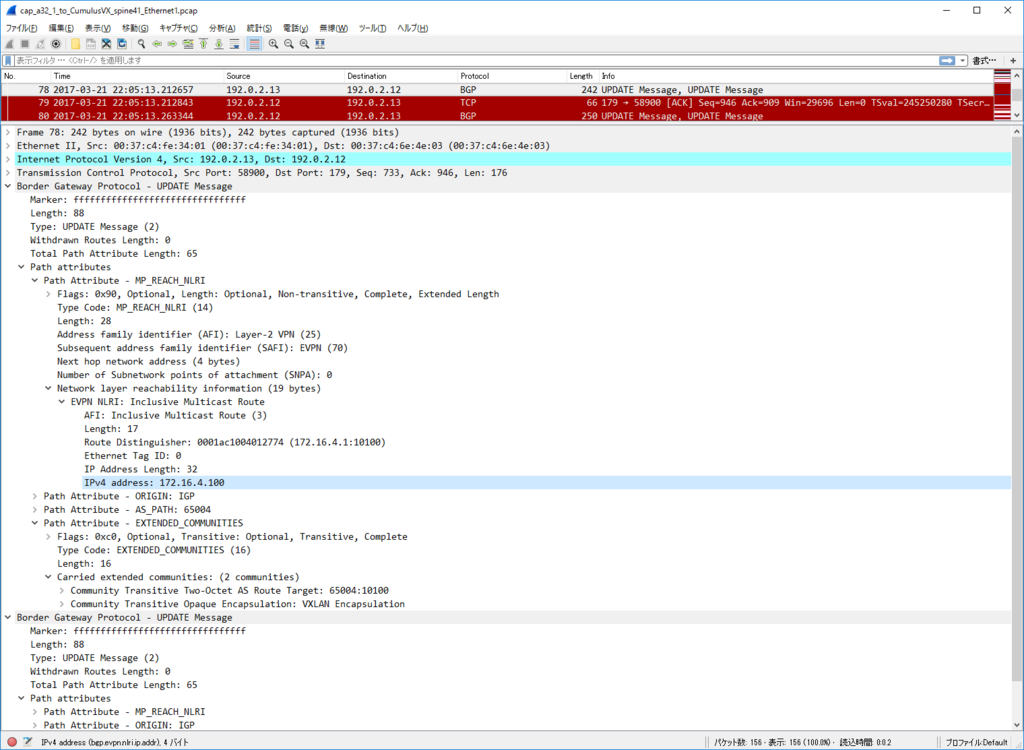
EVPN NLRI Type2(MAC/IP Advertisement route)
spine41 が bb03 に node41(at VLAN100:VNI10100) の MAC アドレスを広告する図です。
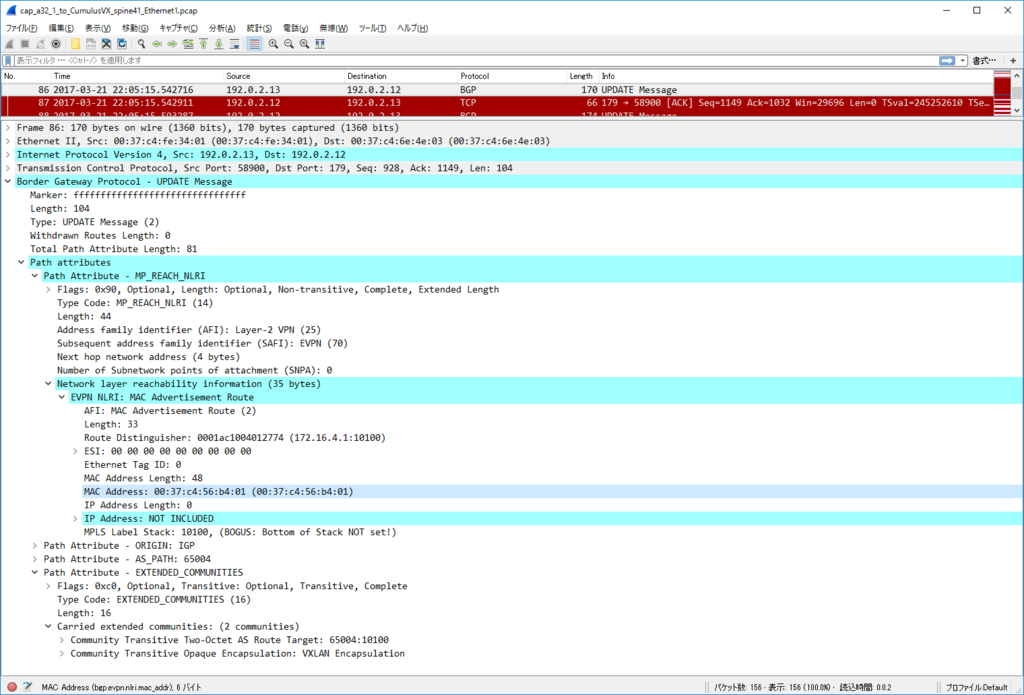
DataPlane
BUM
node31 からの ARP Request は spine31 から bb03 に送信されています。
VXLANカプセル外側の IP ヘッダを見ると、Src が 172.16.3.100 (spine3[12] の共有lo IPaddr) で Dst が 172.16.4.100(spine4[12] の共有loopback IPアドレス) になっており、各ペアが2台で共有?loopback IPアドレスを使った論理?VTEPを構成していることが分かります。
VXLAN 的には HER(Head End Replication) 動作。
なお、2017/03/21 時点で公式ページのHERに関する注意書きを読むと、HER で構成可能な VTEP 数は 128 だそうです。
Cumulus Linux verified support for up to 128 VTEPs with head end replication.
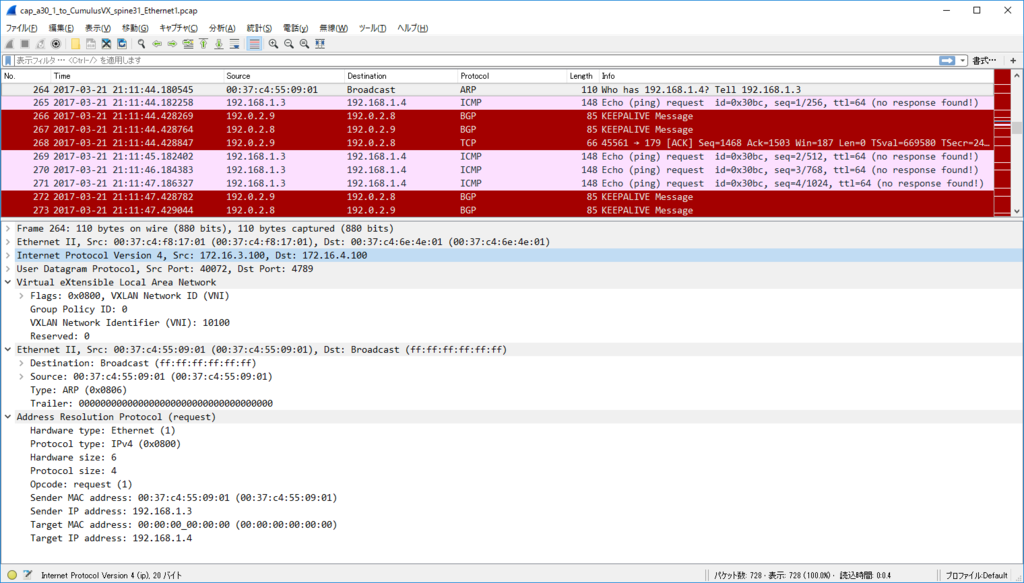
Unicast
spine41 から bb04 方面に送信される node41 から node31 への ICMP Echo Reply の様子。
ただのVXLANカプセル化されたパケットですが、外側のIPヘッダを見ると共有loopback同士での通信になっています。
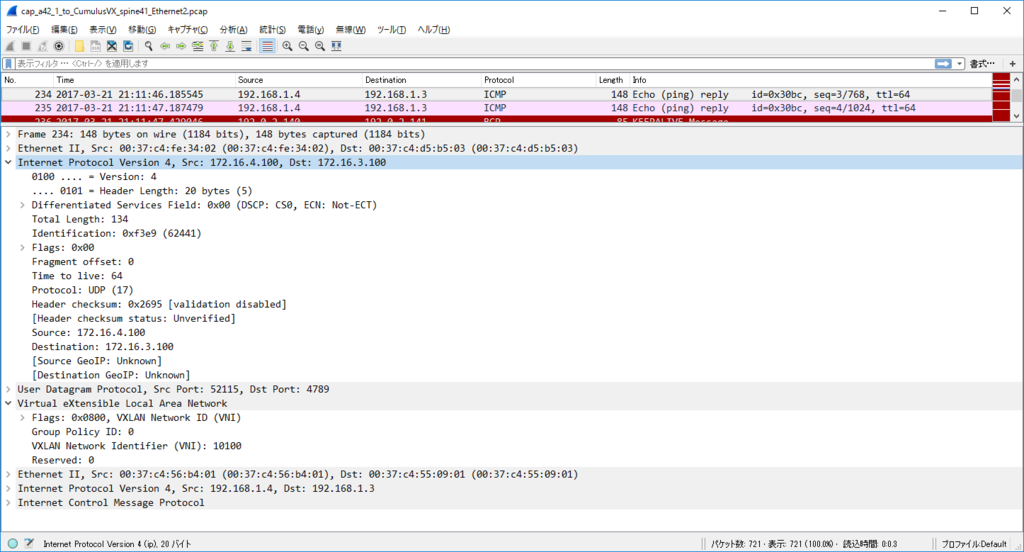
MLAG 動作
単なる MLAG の切り替わりでしかなく、仮想環境での障害試験なので、超簡単に...。
トラフィック が bb03 -> spine41 -> torSW401a -> node41 という経路で流れている状態で spine41 の downlink を sudo ifdown swp5 で down させると、即時
bb03 -> spine41 -> spine42 -> torSW401a -> node41 という経路に切り替わりました。
spine4[12] で torSW401a に組んでいる LAG や仮想loopbackは up したままなので、特に EVPN 的な WithDrawn なども発生せずです。
おしまい
以下、所感です。
- Cumulus Linux
- VX の軽さが良い
- Network Command Line Utility(NCLU) というラッパの使い勝手が良い
- ドキュメントがちゃんと揃っているのが良い (今回とりあげたのは EA 版機能なのに)
- だから僕の説明が雑なのは仕方ない
vQFX10000 で VXLAN+EVPN (Multihoming 編) (original : 2017/02/28)
この記事は某所で 2017/02/28 に書いたもののコピーです。
そのため 2017/05/13 時点ではやや古い情報も含まれています。
201705にGNS3 ver2.0 stableが出たので
.
- 最初に
- 構築~動作確認
- おしまい
最初に
本項でやること
以下をやります。
- 先日「vQFX10000 で VXLAN+EVPN (L2 over L3 編)」で動かした構成を冗長化する
- RFC7432(BGP MPLS-Based Ethernet VPN)に書かれた Multihoming を動かして様子を見る
- 構成図でいう spine 群(VTEP と EVI の役割を担う)の下側
- これがメイン
- マルチパスBGPもついでに組んでおく
- 構成図でいう spine 群(VTEP と EVI の役割を担う)の上側
- 単にマルチパスなBGP構成にしただけで、サラリと流す
- ここ数年、あちこちのデータセンタ事業者とかメーカとかが IP CLOS Network として提示しているアレ
- RFC7432(BGP MPLS-Based Ethernet VPN)に書かれた Multihoming を動かして様子を見る
個人的には、2014/12 時点で物理スイッチでの VXLAN 実装を確認した時 (VyOS と Arista で VXLAN 相互接続)に、VTEPの冗長化手法が分からなかった(配下のノードで bonding なり VRRP なりで制御せざるを得ないと考えていた)ので、それを標準化技術で実現する手法として期待を持っていたりします。
概要構成図 / 構成簡易解説 / 環境情報
下図のようなものを作っていきます。
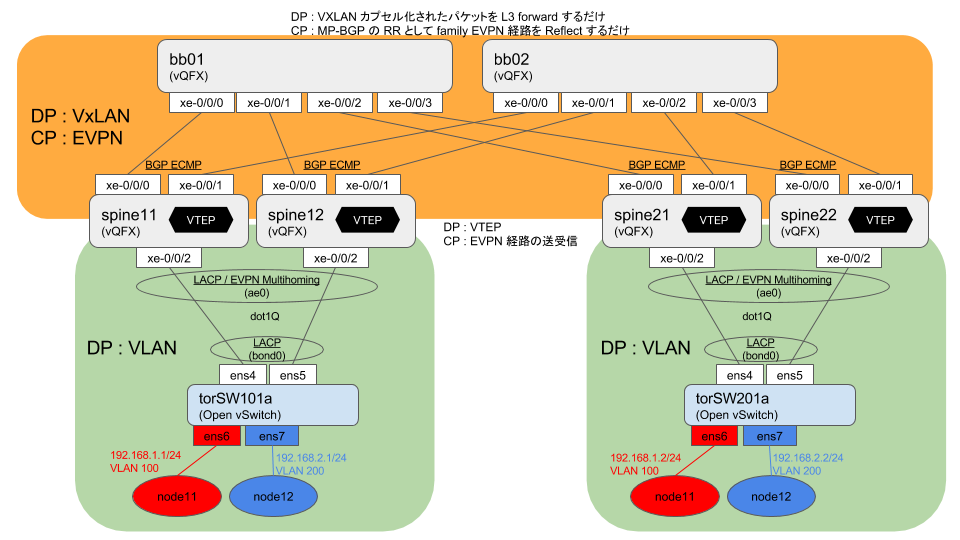
bb0[12]spien[12]{2}- DataPlane としては VTEP 動作
- ControlPlane としては EVPN の PE 動作
torSW[12]01a- VLAN tag 処理をする単純なL2SW
冗長化の方式としては、構成図の下線で書いた通りで、以下の感じ。
bb0[12]-spien[12]{2}- Underlay の eBGP では PerPacket の ECMP を動かす
- Overlay の iBGP では
bb0[12]が RouteReflector となる 1 クラスタにする
spine[12]{2}-torSW[12]01aspine[12]{2}は 2台1組でtorSW[12]01aに対して LAG を組むspine1[12]とtorSW101aspine2[12]とtorSW201a
spine[12]{2}の EVPN 動作としては- その LAG を EthernetSegment(ES) として扱う
- その LAG に EVPN 世界内で一意になるように EthernetSegmentID(ESI) を付与して識別する
- 今回の構成例だと、
spine1[12]のae0とspine2[12]のae0が重複してはいけない
- 今回の構成例だと、
- ESI を EVPN NLRI Type4(Ethernet Segment route) で広告しあうことで、相互に誰とLAGを組んでいるかを識別したり・誰が各 ES の Designated Forwarder(DF)になるかの Election をしたりできる
- 各 LAG で DF になっている PE だけが EVPN/VXLAN 側(=図中の上側)から来た BUM トラフィックを VLAN 側(=図中の下側)にフォワードする
torSW[12]01a- 対向が2台いるとか Multihoming してるとか一切気にする必要なく、単に LACP で LAG 組めば OK
そんなわけで、今までは VLAN Tag の処理だけしていれば良かった torSW[12]01a に新たに「LACP を使えること」という要件が出てきたので、今回は GNS3 の EthernetSwitch ではなく Open vSwitch を使います。
環境情報は最初から変わらずです。
今回新たに登場した torSW[12]01a は(詳細は後述しますが)、 Ubuntu16.04.1-server-amd64 + ovs_version: "2.5.0" です。
参考資料
- 前回の参考資料 全般
- Juniper での EVPN Multihoming 実装周り
- Juniper公式 / MC-LAG is dead, Long live EVPN Multi-homing
- タイトルは若干釣り気味だけど「MC-LAG と比べて EVPN Multihoming はこう凄いよ(MC-LAGだって十分すげーけどな!)」的な概念説明記事
- Juniper公式 / EVPN Multihoming Overview
- EVPN Multihoming マニュアル
- Juniper公式 / MC-LAG is dead, Long live EVPN Multi-homing
- Underlay の Clos Network 周り
- O'Reilly Juniper QFX10000 Series
- Juniper QFX10000 の独自プロセッサ開発経緯や特徴・Architecture(HW/SW) の結構詳しい説明・MPLS/VXLAN+EVPNの設計ポイント解説などが纏まった非常に良い本

Juniper QFX10000 Series: A Comprehensive Guide to Building Next-Generation Data Centers
- 作者: Douglas Richard, Jr. Hanks
- 出版社/メーカー: O'Reilly Media
- 発売日: 2016/08/11
- メディア: ペーパーバック
- この商品を含むブログを見る
- Juniper QFX10000 の独自プロセッサ開発経緯や特徴・Architecture(HW/SW) の結構詳しい説明・MPLS/VXLAN+EVPNの設計ポイント解説などが纏まった非常に良い本
構築~動作確認
GNS3 でデプロイ
前回の環境を引き続き使っていますが、ポチポチとvQFX のデプロイと、Open vSwitch を動かす Ubuntu のデプロイをしていきます。
以下の感じで。

例によって、GNS3 のバージョンは 1.5.2 を使っているので、パケットキャプチャ用に EthernetSwitch(図中の cap ではじまるやつら) を挟んでますよ。
余談。
最初、Open vSwitch は手軽に docker で動かしたんですよ。(以下、参考リンク)
- GNS3 公式フォーラム / New appliance supported: Open vSwitch
- github / Docker Open vSwitch for GNS3
- Docker 公式 / Install Docker on Ubuntu
そうしたら VLAN trunk port で VLAN tag が取り除かれて出てきたんですよ。つーわけで docker OVS は止め。諦めて各々の OVS 用に Ubuntu 仮想マシンを立てることにしましたとさ。
詳細は以下のリンク先を参照ください。例によって GNS 2.0 では、docker でもちゃんと VLAN tag 取り除かずに動くようになっていました(2017/05 確認済)。
- GNS3 github issue / Docker strips VLAN tag
- GNS3 公式forum / Open vSwitch docker appliance 802.1q not working
torSW[12]01a (Open vSwitch) 設定
Open vSwitch の導入なんかは、適当に公式ドキュメントを見て進めて頂くとして。(雑)
以下のような設定で。このスイッチは LACP と VLAN が動けばなんでもよいので、適当に各々が使いやすいやつを入れればよいかと。
torSW[12]01a共通
# ovs-vsctl --no-wait init
# ovs-vsctl add-br br0
# ovs-vsctl set bridge br0 datapath_type=netdev
# ovs-vsctl add-bond br0 bond0 ens4 ens5 lacp=active bond_mode=balance-slb other_config:lacp-time=fast
# ovs-vsctl add-port br0 ens6 tag=100
# ovs-vsctl add-port br0 ens7 tag=200
# ip link set dev br0 up
# ip link set dev ens4 up
# ip link set dev ens5 up
# ip link set dev ens6 up
# ip link set dev ens7 up
# ovs-vsctl show
79e38752-1ada-4e44-9da2-f457504b149a
Bridge "br0"
Port "ens7"
tag: 200
Interface "ens7"
Port "bond0"
Interface "ens5"
Interface "ens4"
Port "ens6"
tag: 100
Interface "ens6"
Port "br0"
Interface "br0"
type: internal
ovs_version: "2.5.0"
# ovs-vsctl list port bond0
_uuid : 8e767f1a-6a08-411f-9b86-407922a7565c
bond_active_slave : "00:37:c4:9e:d1:01"
bond_downdelay : 0
bond_fake_iface : false
bond_mode : balance-slb
bond_updelay : 0
external_ids : {}
fake_bridge : false
interfaces : [470f05cf-c3db-423d-abd5-4a6c45c9a581, 97fb2fa2-5074-455a-8b58-04ec746ea0a6]
lacp : active
mac : []
name : "bond0"
other_config : {lacp-time=fast}
qos : []
rstp_statistics : {}
rstp_status : {}
statistics : {}
status : {}
tag : []
trunks : []
vlan_mode : []
以下出力は spine1[12] の設定とかも終わった後で LAG が組めている状態のものですが...。
root@torSW101a:~# ovs-appctl bond/show bond0
---- bond0 ----
bond_mode: balance-slb
bond may use recirculation: no, Recirc-ID : -1
bond-hash-basis: 0
updelay: 0 ms
downdelay: 0 ms
next rebalance: 7123 ms
lacp_status: negotiated
active slave mac: 00:37:c4:9e:d1:01(ens4)
slave ens4: enabled
active slave
may_enable: true
slave ens5: enabled
may_enable: true
root@torSW101a:~# ovs-appctl lacp/show bond0
---- bond0 ----
status: active negotiated
sys_id: 00:37:c4:9e:d1:01
sys_priority: 65534
aggregation key: 1
lacp_time: fast
slave: ens4: current attached
port_id: 2
port_priority: 65535
may_enable: true
actor sys_id: 00:37:c4:9e:d1:01
actor sys_priority: 65534
actor port_id: 2
actor port_priority: 65535
actor key: 1
actor state: activity timeout aggregation synchronized collecting distributing
partner sys_id: 00:00:00:01:01:01
partner sys_priority: 127
partner port_id: 1
partner port_priority: 127
partner key: 1
partner state: activity timeout aggregation synchronized collecting distributing
slave: ens5: current attached
port_id: 1
port_priority: 65535
may_enable: true
actor sys_id: 00:37:c4:9e:d1:01
actor sys_priority: 65534
actor port_id: 1
actor port_priority: 65535
actor key: 1
actor state: activity timeout aggregation synchronized collecting distributing
partner sys_id: 00:00:00:01:01:01
partner sys_priority: 127
partner port_id: 1
partner port_priority: 127
partner key: 1
partner state: activity timeout aggregation synchronized collecting distributing
疎通確認用 node 設定
今まで通りなのですが、適当に node 群を用意しておきます。疎通確認にしか使わないので、何を使ってもいいです。
node11spine1[12]配下 VLAN 100
kotetsu@node11:~$ ip a show dev ens4
3: ens4: <BROADCAST,MULTICAST,UP,LOWER_UP> mtu 1500 qdisc pfifo_fast state UP group default qlen 1000
link/ether 00:37:c4:e2:60:01 brd ff:ff:ff:ff:ff:ff
inet 192.168.1.1/24 brd 192.168.1.255 scope global ens4
valid_lft forever preferred_lft forever
inet6 fe80::237:c4ff:fee2:6001/64 scope link
valid_lft forever preferred_lft forever
node21spine2[12]配下 VLAN 100
kotetsu@node21:~$ ip a show dev ens4
3: ens4: <BROADCAST,MULTICAST,UP,LOWER_UP> mtu 1500 qdisc pfifo_fast state UP group default qlen 1000
link/ether 00:37:c4:46:d8:01 brd ff:ff:ff:ff:ff:ff
inet 192.168.1.2/24 brd 192.168.1.255 scope global ens4
valid_lft forever preferred_lft forever
inet6 fe80::237:c4ff:fe46:d801/64 scope link
valid_lft forever preferred_lft forever
node12spine1[12]配下 VLAN 200
kotetsu@node12:~$ ip a show dev ens4
3: ens4: <BROADCAST,MULTICAST,UP,LOWER_UP> mtu 1500 qdisc pfifo_fast state UP group default qlen 1000
link/ether 00:37:c4:9c:dd:01 brd ff:ff:ff:ff:ff:ff
inet 192.168.2.1/24 brd 192.168.2.255 scope global ens4
valid_lft forever preferred_lft forever
inet6 fe80::237:c4ff:fe9c:dd01/64 scope link
valid_lft forever preferred_lft forever
node22spine2[12]配下 VLAN 200
kotetsu@node22:~$ ip a show dev ens4
3: ens4: <BROADCAST,MULTICAST,UP,LOWER_UP> mtu 1500 qdisc pfifo_fast state UP group default qlen 1000
link/ether 00:37:c4:3d:e0:01 brd ff:ff:ff:ff:ff:ff
inet 192.168.2.2/24 brd 192.168.2.255 scope global ens4
valid_lft forever preferred_lft forever
inet6 fe80::237:c4ff:fe3d:e001/64 scope link
valid_lft forever preferred_lft forever
vQFX 設定~確認
まずは Underlay の設定(物理IF~eBGP)を。長くなってしまいますが、下図のような感じで作っていきます。
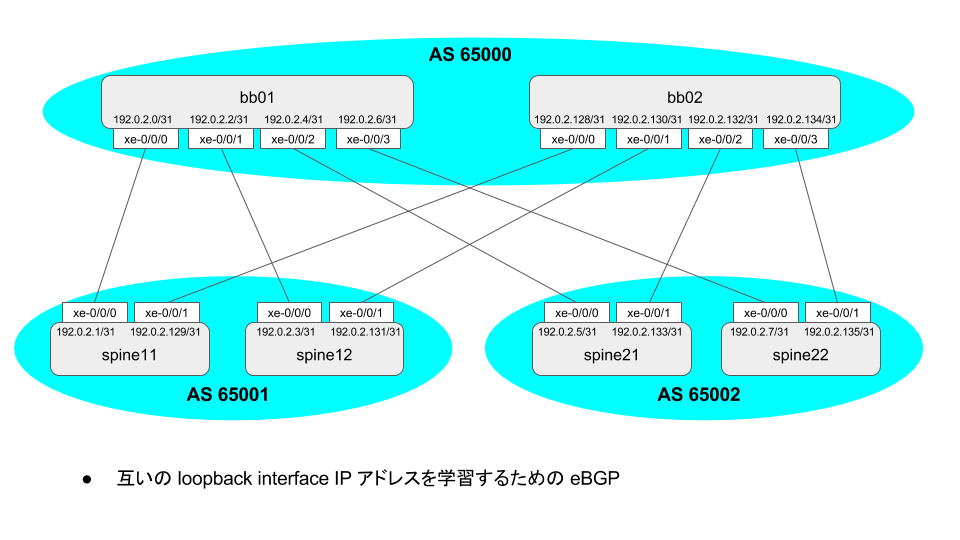
Underlay 物理IF設定
vQFX でも RFC3021 Using 31-Bit Prefixes on IPv4 Point-to-Point Links をサポートしているので、使っていくです。
6台分をペタペタ貼っていきますが、まあ物理インターフェース番号やIPアドレスのパラメータが個々に異なるくらい。
bb01
set interfaces xe-0/0/0 description "DEV=spine11 IF=xe-0/0/0" set interfaces xe-0/0/0 mtu 9192 set interfaces xe-0/0/0 unit 0 family inet address 192.0.2.0/31 set interfaces xe-0/0/0 unit 0 family inet mtu 9000 delete interfaces xe-0/0/1 unit 0 family inet dhcp set interfaces xe-0/0/1 description "DEV=spine12 IF=xe-0/0/0" set interfaces xe-0/0/1 mtu 9192 set interfaces xe-0/0/1 unit 0 family inet address 192.0.2.2/31 set interfaces xe-0/0/1 unit 0 family inet mtu 9000 delete interfaces xe-0/0/2 unit 0 family inet dhcp set interfaces xe-0/0/2 description "DEV=spine21 IF=xe-0/0/0" set interfaces xe-0/0/2 mtu 9192 set interfaces xe-0/0/2 unit 0 family inet address 192.0.2.4/31 set interfaces xe-0/0/2 unit 0 family inet mtu 9000 delete interfaces xe-0/0/3 unit 0 family inet dhcp set interfaces xe-0/0/3 description "DEV=spine22 IF=xe-0/0/0" set interfaces xe-0/0/3 mtu 9192 set interfaces xe-0/0/3 unit 0 family inet address 192.0.2.6/31 set interfaces xe-0/0/3 unit 0 family inet mtu 9000 set protocols lldp port-id-subtype interface-name set protocols lldp interface xe-0/0/0 set protocols lldp interface xe-0/0/1 set protocols lldp interface xe-0/0/2 set protocols lldp interface xe-0/0/3
bb02
delete interfaces xe-0/0/0 unit 0 family inet dhcp set interfaces xe-0/0/0 description "DEV=spine11 IF=xe-0/0/1" set interfaces xe-0/0/0 mtu 9192 set interfaces xe-0/0/0 unit 0 family inet address 192.0.2.128/31 set interfaces xe-0/0/0 unit 0 family inet mtu 9000 delete interfaces xe-0/0/1 unit 0 family inet dhcp set interfaces xe-0/0/1 description "DEV=spine12 IF=xe-0/0/1" set interfaces xe-0/0/1 mtu 9192 set interfaces xe-0/0/1 unit 0 family inet address 192.0.2.130/31 set interfaces xe-0/0/1 unit 0 family inet mtu 9000 delete interfaces xe-0/0/2 unit 0 family inet dhcp set interfaces xe-0/0/2 description "DEV=spine21 IF=xe-0/0/1" set interfaces xe-0/0/2 mtu 9192 set interfaces xe-0/0/2 unit 0 family inet address 192.0.2.132/31 set interfaces xe-0/0/2 unit 0 family inet mtu 9000 delete interfaces xe-0/0/3 unit 0 family inet dhcp set interfaces xe-0/0/3 description "DEV=spine22 IF=xe-0/0/1" set interfaces xe-0/0/3 mtu 9192 set interfaces xe-0/0/3 unit 0 family inet address 192.0.2.134/31 set interfaces xe-0/0/3 unit 0 family inet mtu 9000 set protocols lldp port-id-subtype interface-name set protocols lldp interface xe-0/0/0 set protocols lldp interface xe-0/0/1 set protocols lldp interface xe-0/0/2 set protocols lldp interface xe-0/0/3
spine11
delete interfaces xe-0/0/0 unit 0 family inet dhcp set interfaces xe-0/0/0 description "DEV=bb01 IF=xe-0/0/0" set interfaces xe-0/0/0 mtu 9192 set interfaces xe-0/0/0 unit 0 family inet address 192.0.2.1/31 set interfaces xe-0/0/0 unit 0 family inet mtu 9000 delete interfaces xe-0/0/1 unit 0 family inet dhcp set interfaces xe-0/0/1 description "DEV=bb02 IF=xe-0/0/0" set interfaces xe-0/0/1 mtu 9192 set interfaces xe-0/0/1 unit 0 family inet address 192.0.2.129/31 set interfaces xe-0/0/1 unit 0 family inet mtu 9000 delete interfaces xe-0/0/2 unit 0 family inet dhcp set interfaces xe-0/0/2 description "DEV=torSW101a IF=eth0" set protocols lldp port-id-subtype interface-name set protocols lldp interface xe-0/0/0 set protocols lldp interface xe-0/0/1
spine12
delete interfaces xe-0/0/0 unit 0 family inet dhcp set interfaces xe-0/0/0 description "DEV=bb01 IF=xe-0/0/1" set interfaces xe-0/0/0 mtu 9192 set interfaces xe-0/0/0 unit 0 family inet address 192.0.2.3/31 set interfaces xe-0/0/0 unit 0 family inet mtu 9000 delete interfaces xe-0/0/1 unit 0 family inet dhcp set interfaces xe-0/0/1 description "DEV=bb02 IF=xe-0/0/1" set interfaces xe-0/0/1 mtu 9192 set interfaces xe-0/0/1 unit 0 family inet address 192.0.2.131/31 set interfaces xe-0/0/1 unit 0 family inet mtu 9000 delete interfaces xe-0/0/2 unit 0 family inet dhcp set interfaces xe-0/0/2 description "DEV=torSW101a IF=eth1" set protocols lldp port-id-subtype interface-name set protocols lldp interface xe-0/0/0 set protocols lldp interface xe-0/0/1
spine21
delete interfaces xe-0/0/0 unit 0 family inet dhcp set interfaces xe-0/0/0 description "DEV=bb01 IF=xe-0/0/2" set interfaces xe-0/0/0 mtu 9192 set interfaces xe-0/0/0 unit 0 family inet address 192.0.2.5/31 set interfaces xe-0/0/0 unit 0 family inet mtu 9000 delete interfaces xe-0/0/1 unit 0 family inet dhcp set interfaces xe-0/0/1 description "DEV=bb02 IF=xe-0/0/2" set interfaces xe-0/0/1 mtu 9192 set interfaces xe-0/0/1 unit 0 family inet address 192.0.2.133/31 set interfaces xe-0/0/1 unit 0 family inet mtu 9000 delete interfaces xe-0/0/2 unit 0 family inet dhcp set interfaces xe-0/0/2 description "DEV=torSW201a IF=eth0" set protocols lldp port-id-subtype interface-name set protocols lldp interface xe-0/0/0 set protocols lldp interface xe-0/0/1
spine22
delete interfaces xe-0/0/0 unit 0 family inet dhcp set interfaces xe-0/0/0 description "DEV=bb01 IF=xe-0/0/3" set interfaces xe-0/0/0 mtu 9192 set interfaces xe-0/0/0 unit 0 family inet address 192.0.2.7/31 set interfaces xe-0/0/0 unit 0 family inet mtu 9000 delete interfaces xe-0/0/1 unit 0 family inet dhcp set interfaces xe-0/0/1 description "DEV=bb02 IF=xe-0/0/3" set interfaces xe-0/0/1 mtu 9192 set interfaces xe-0/0/1 unit 0 family inet address 192.0.2.135/31 set interfaces xe-0/0/1 unit 0 family inet mtu 9000 delete interfaces xe-0/0/2 unit 0 family inet dhcp set interfaces xe-0/0/2 description "DEV=torSW201a IF=eth1" set protocols lldp port-id-subtype interface-name set protocols lldp interface xe-0/0/0 set protocols lldp interface xe-0/0/1
Underlay eBGP 設定~簡易動作確認
これを設定すれば eBGP で各々の lo0 IPアドレスを相互学習できるようになる筈。
全台共通設定
ここでは6台の vQFX 全台共通の設定を。
ともあれまずは eBGP を動かします。
set protocols bgp group BGP_UNDERLAY type external set protocols bgp group BGP_UNDERLAY mtu-discovery
広告対象は自身の lo0 のみとします。共通のポリシを全台で流用しました。この辺は今まで通りです。
set policy-options policy-statement POLICY_EXPORT_LO0 from family inet set policy-options policy-statement POLICY_EXPORT_LO0 from protocol direct set policy-options policy-statement POLICY_EXPORT_LO0 from route-filter 0.0.0.0/0 prefix-length-range /32-/32 set policy-options policy-statement POLICY_EXPORT_LO0 then accept set protocols bgp group BGP_UNDERLAY export POLICY_EXPORT_LO0
このあたりは Underlay 設計にもよるのですが...。
今回は IGP を一切使わずに、eBGP のみで組んでいます。(今回のような環境を作るのに、モノの本には IGP が推奨されていたりもしますが。)
また、2台をペアとして同じ AS に所属させています。(6台を各々別 AS に所属させる選択肢もあって、システムの拡張性と利用可能な AS 番号の数、2byte ASN か 4byte ASN か...など考慮して、選択すればよいのでは。)
なので、spine 4 台の lo0 同士でフルメッシュに到達性を持たせるためには、以下を実現する必要があります。
AS 65000のbb0[12]は、AS 65001のspine11から受信した経路(spine11のlo0IP アドレス)を、AS 65001のspine12に広告する必要があるAS 65002から来る経路に関しても同様
AS 65001のspine11は、AS PATH が65000 65001となるspine12への経路を学習しないといけない
というわけで、以下の設定を入れておきます。
set protocols bgp group BGP_UNDERLAY advertise-peer-as set protocols bgp group BGP_UNDERLAY family inet unicast loops 2
今回冗長化しますので spine 同士の通信が Per Packet で ECMP されるポリシを適用して、マルチパスを動かします。
VXLANカプセル化したパケットの通信は全て SrcIP も DstIP も spine (の lo0)の通信になるわけで、spine[12]{2} にさえ入れておけば良い設定の筈ですが。
set policy-options policy-statement POLICY_ECMP then load-balance per-packet set routing-options forwarding-table export POLICY_ECMP set routing-options forwarding-table ecmp-fast-reroute set protocols bgp group BGP_UNDERLAY multipath
折角だから BFD も動かしてみようと欲張ったのですが、別に必須ではないし環境が弱いと邪魔になりかねないので、お好みでどうぞ。
set protocols bgp group BGP_UNDERLAY bfd-liveness-detection minimum-interval 350 set protocols bgp group BGP_UNDERLAY bfd-liveness-detection multiplier 3 set protocols bgp group BGP_UNDERLAY bfd-liveness-detection session-mode automatic
ログファイルを /var/log/bgp.log に仕分けたりの細々した設定なのでお好みでどうぞ。
set protocols bgp traceoptions file bgp.log set protocols bgp traceoptions file size 10k set protocols bgp traceoptions file files 30 set protocols bgp traceoptions flag normal set protocols bgp log-updown
仮想環境でどんだけ意味があるかっつーと...ですけど、あーコマンドは入るのねーくらいの感じで投入しただけです。まー今回の箱庭検証では不要でしょう。
set protocols bgp graceful-restart
個別設定
ここから先は個別パラメータの設定です。
lo0 の IPアドレス、AS番号、neighbor 設定くらいすね。
bb01
set interfaces lo0 unit 0 family inet address 172.31.0.1/32 set routing-options router-id 172.31.0.1 set routing-options autonomous-system 65000 set protocols bgp group BGP_UNDERLAY neighbor 192.0.2.1 description spine11 set protocols bgp group BGP_UNDERLAY neighbor 192.0.2.1 peer-as 65001 set protocols bgp group BGP_UNDERLAY neighbor 192.0.2.3 description spine12 set protocols bgp group BGP_UNDERLAY neighbor 192.0.2.3 peer-as 65001 set protocols bgp group BGP_UNDERLAY neighbor 192.0.2.5 description spine21 set protocols bgp group BGP_UNDERLAY neighbor 192.0.2.5 peer-as 65002 set protocols bgp group BGP_UNDERLAY neighbor 192.0.2.7 description spine22 set protocols bgp group BGP_UNDERLAY neighbor 192.0.2.7 peer-as 65002
bb02
set interfaces lo0 unit 0 family inet address 172.31.0.2/32 set routing-options router-id 172.31.0.2 set routing-options autonomous-system 65000 set protocols bgp group BGP_UNDERLAY neighbor 192.0.2.129 description spine11 set protocols bgp group BGP_UNDERLAY neighbor 192.0.2.129 peer-as 65001 set protocols bgp group BGP_UNDERLAY neighbor 192.0.2.131 description spine12 set protocols bgp group BGP_UNDERLAY neighbor 192.0.2.131 peer-as 65001 set protocols bgp group BGP_UNDERLAY neighbor 192.0.2.133 description spine21 set protocols bgp group BGP_UNDERLAY neighbor 192.0.2.133 peer-as 65002 set protocols bgp group BGP_UNDERLAY neighbor 192.0.2.135 description spine22 set protocols bgp group BGP_UNDERLAY neighbor 192.0.2.135 peer-as 65002
spine11
set interfaces lo0 unit 0 family inet address 172.16.1.1/32 set routing-options router-id 172.16.1.1 set routing-options autonomous-system 65001 set protocols bgp group BGP_UNDERLAY neighbor 192.0.2.0 description bb01 set protocols bgp group BGP_UNDERLAY neighbor 192.0.2.0 peer-as 65000 set protocols bgp group BGP_UNDERLAY neighbor 192.0.2.128 description bb02 set protocols bgp group BGP_UNDERLAY neighbor 192.0.2.128 peer-as 65000
spine12
set interfaces lo0 unit 0 family inet address 172.16.1.2/32 set routing-options router-id 172.16.1.2 set routing-options autonomous-system 65001 set protocols bgp group BGP_UNDERLAY neighbor 192.0.2.2 description bb01 set protocols bgp group BGP_UNDERLAY neighbor 192.0.2.2 peer-as 65000 set protocols bgp group BGP_UNDERLAY neighbor 192.0.2.130 description bb02 set protocols bgp group BGP_UNDERLAY neighbor 192.0.2.130 peer-as 65000
spine21
set interfaces lo0 unit 0 family inet address 172.16.2.1/32 set routing-options router-id 172.16.2.1 set routing-options autonomous-system 65002 set protocols bgp group BGP_UNDERLAY neighbor 192.0.2.4 description bb01 set protocols bgp group BGP_UNDERLAY neighbor 192.0.2.4 peer-as 65000 set protocols bgp group BGP_UNDERLAY neighbor 192.0.2.132 description bb02 set protocols bgp group BGP_UNDERLAY neighbor 192.0.2.132 peer-as 65000
spine22
set interfaces lo0 unit 0 family inet address 172.16.2.2/32 set routing-options router-id 172.16.2.2 set routing-options autonomous-system 65002 set protocols bgp group BGP_UNDERLAY neighbor 192.0.2.6 description bb01 set protocols bgp group BGP_UNDERLAY neighbor 192.0.2.6 peer-as 65000 set protocols bgp group BGP_UNDERLAY neighbor 192.0.2.134 description bb02 set protocols bgp group BGP_UNDERLAY neighbor 192.0.2.134 peer-as 65000
Underlay eBGP ECMP 動作確認
これで BGP ステータスやテーブルを確認・フルメッシュでの lo0 間疎通ができるようになります。
では ECMP の挙動を軽く確認しておきます。
例えば spine11 と spine21 は互いに相手の lo0 への経路を 2 パス(bb01 経由と bb02 経由)持っています。
{master:0}
kotetsu@spine11> show route 172.16.2.1
inet.0: 14 destinations, 17 routes (14 active, 0 holddown, 0 hidden)
+ = Active Route, - = Last Active, * = Both
172.16.2.1/32 *[BGP/170] 00:20:02, localpref 100
AS path: 65000 65002 I, validation-state: unverified
to 192.0.2.0 via xe-0/0/0.0
> to 192.0.2.128 via xe-0/0/1.0
[BGP/170] 00:02:45, localpref 100
AS path: 65000 65002 I, validation-state: unverified
> to 192.0.2.0 via xe-0/0/0.0
{master:0}
kotetsu@spine21> show route 172.16.1.1
inet.0: 14 destinations, 19 routes (14 active, 0 holddown, 0 hidden)
+ = Active Route, - = Last Active, * = Both
172.16.1.1/32 *[BGP/170] 00:19:54, localpref 100
AS path: 65000 65001 I, validation-state: unverified
to 192.0.2.4 via xe-0/0/0.0
> to 192.0.2.132 via xe-0/0/1.0
[BGP/170] 00:03:23, localpref 100
AS path: 65000 65001 I, validation-state: unverified
> to 192.0.2.4 via xe-0/0/0.0
ここで spine11 から spine21 に対して(双方 lo0) ping を実行しつつ
{master:0}
kotetsu@spine11> ping source 172.16.1.1 172.16.2.1
PING 172.16.2.1 (172.16.2.1): 56 data bytes
64 bytes from 172.16.2.1: icmp_seq=0 ttl=63 time=28.369 ms
64 bytes from 172.16.2.1: icmp_seq=1 ttl=63 time=37.308 ms
...
--- 172.16.2.1 ping statistics ---
21 packets transmitted, 21 packets received, 0% packet loss
round-trip min/avg/max/stddev = 18.653/29.917/45.982/7.670 ms
spine11 と spine21 から bb01 と bb02 へのリンクをパケットキャプチャすると、分散していることが分かります。
あと一応、AS65001 に所属している spine12 へのパスが AS65001 に所属している spine11 で AS-PATH 65000 65001 で学習できていることも確認しておきます。
各 spine の unicast loops 設定と、各 bb の advertise-peer-as 設定が働いて、狙い通り学習できています。
{master:0}
kotetsu@spine11> show route 172.16.1.2
inet.0: 14 destinations, 17 routes (14 active, 0 holddown, 0 hidden)
+ = Active Route, - = Last Active, * = Both
172.16.1.2/32 *[BGP/170] 00:29:19, localpref 100
AS path: 65000 65001 I, validation-state: unverified
> to 192.0.2.0 via xe-0/0/0.0
to 192.0.2.128 via xe-0/0/1.0
[BGP/170] 00:29:15, localpref 100
AS path: 65000 65001 I, validation-state: unverified
> to 192.0.2.128 via xe-0/0/1.0
Overlay 設定(MP-BGP)
Underlay eBGP で経路交換した各 lo0 同士で iBGP を組みます。
これで EVPN NLRI をやりとりする MP-BGP が組める筈。
設定は長々となってしまいますが、絵にすると単純で以下のような感じです。
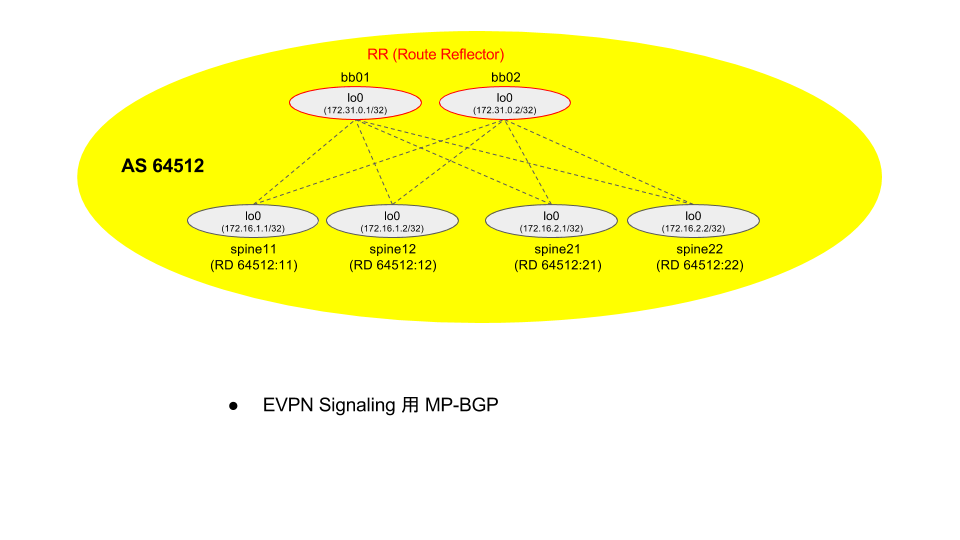
全台共通設定
前回と同様の設定です。
set protocols bgp group BGP_OVERLAY type internal set protocols bgp group BGP_OVERLAY family evpn signaling set protocols bgp group BGP_OVERLAY local-as 64512
個別設定
bb0[12] が共に RouteReflector になる構成をとるので、同じクラスタIDを設定します。
場合によっては RouteReflector 使わずにフルメッシュにするなり、お好きなようにどうぞ。(なんか、今回こればっかり言ってる気がする...。)
bb01
set protocols bgp group BGP_OVERLAY local-address 172.31.0.1 set protocols bgp group BGP_OVERLAY cluster 172.31.0.0 set protocols bgp group BGP_OVERLAY neighbor 172.16.1.1 description spine11 set protocols bgp group BGP_OVERLAY neighbor 172.16.1.2 description spine12 set protocols bgp group BGP_OVERLAY neighbor 172.16.2.1 description spine21 set protocols bgp group BGP_OVERLAY neighbor 172.16.2.2 description spine22
bb02
set protocols bgp group BGP_OVERLAY local-address 172.31.0.2 set protocols bgp group BGP_OVERLAY cluster 172.31.0.0 set protocols bgp group BGP_OVERLAY neighbor 172.16.1.1 description spine11 set protocols bgp group BGP_OVERLAY neighbor 172.16.1.2 description spine12 set protocols bgp group BGP_OVERLAY neighbor 172.16.2.1 description spine21 set protocols bgp group BGP_OVERLAY neighbor 172.16.2.2 description spine22
spine11
set protocols bgp group BGP_OVERLAY local-address 172.16.1.1 set protocols bgp group BGP_OVERLAY neighbor 172.31.0.1 description bb01 set protocols bgp group BGP_OVERLAY neighbor 172.31.0.2 description bb02
spine12
set protocols bgp group BGP_OVERLAY local-address 172.16.1.2 set protocols bgp group BGP_OVERLAY neighbor 172.31.0.1 description bb01 set protocols bgp group BGP_OVERLAY neighbor 172.31.0.2 description bb02
spine21
set protocols bgp group BGP_OVERLAY local-address 172.16.2.1 set protocols bgp group BGP_OVERLAY neighbor 172.31.0.1 description bb01 set protocols bgp group BGP_OVERLAY neighbor 172.31.0.2 description bb02
spine22
set protocols bgp group BGP_OVERLAY local-address 172.16.2.2 set protocols bgp group BGP_OVERLAY neighbor 172.31.0.1 description bb01 set protocols bgp group BGP_OVERLAY neighbor 172.31.0.2 description bb02
Overlay設定~確認(EVPN+VXLAN)
EVPN の設定と、その Dataplane として使う VXLAN 周りの設定をしていきます。前回のシングル構成版と全く一緒です。
bb0[12] はこの辺の挙動に関しては土管に徹しているので登場しません。
spine[12]{2} 4台共通設定
set vlans VLAN0100 vlan-id 100 set vlans VLAN0100 vxlan vni 10100 set vlans VLAN0200 vlan-id 200 set vlans VLAN0200 vxlan vni 10200 set protocols evpn encapsulation vxlan set protocols evpn extended-vni-list all set protocols evpn multicast-mode ingress-replication set protocols evpn vni-options vni 10100 vrf-target export target:1:10100 set protocols evpn vni-options vni 10200 vrf-target export target:1:10200 set policy-options community COM_10100 members target:1:10100 set policy-options community COM_10200 members target:1:10200 set policy-options community COM_LEAF_ESI members target:9999:9999 set policy-options policy-statement POLICY_VRF_IMPORT term T_10100 from community COM_10100 set policy-options policy-statement POLICY_VRF_IMPORT term T_10100 then accept set policy-options policy-statement POLICY_VRF_IMPORT term T_10200 from community COM_10200 set policy-options policy-statement POLICY_VRF_IMPORT term T_10200 then accept set policy-options policy-statement POLICY_VRF_IMPORT term T_99900 from community COM_LEAF_ESI set policy-options policy-statement POLICY_VRF_IMPORT term T_99900 then accept set policy-options policy-statement POLICY_VRF_IMPORT term T_99999 then reject set switch-options vtep-source-interface lo0.0 set switch-options vrf-import POLICY_VRF_IMPORT set switch-options vrf-target target:9999:9999 set switch-options vrf-target auto
個別設定
つっても RD だけですね。
spine11
set switch-options route-distinguisher 64512:11
spine12
set switch-options route-distinguisher 64512:12
spine21
set switch-options route-distinguisher 64512:21
spine22
set switch-options route-distinguisher 64512:22
EVPN Multihoming 設定
ようやく本題ですね!(息切れ)
spine1[12] は torSW101a に、spine2[12] は torSW201a に、それぞれペアで ae0 を提供し、それを EVPN 的には Ethernet Segmeent(ES) として扱い、その識別子として Ethernet Segment Identifier(ESI) を付与します。
spine[12]{2} 4台共通設定
まずは普通の AE 設定です。
ethernet device-countを 448 なんて値にしているのは、単に?で出てきたヘルプに書いてあった最大値を入れただけ。足りないより良かろうガハハ!くらいのノリです。torSW[12]01a向けの物理インターフェース(4台共にxe-0/0/2)をae0に所属させae0はvlan trunkで(自身の DB にある)全 VLAN 食うようにしておき- LACP は
- default の
interval fast(1s間隔)で良いので特に設定せず spine[12]{2}の別筐体にまたがる LAG をtorSW[12]01a側では同じものと見做せる必要があるので、各ペアで同じsystem-idを付与- それぞれ 3 台(spine 2 台と torSW 1 台)で閉じる部分だし、
spine[12]{2}で同じ値を使ってしまっているが、本来は一意になるようにしておいた方が無難かと
- それぞれ 3 台(spine 2 台と torSW 1 台)で閉じる部分だし、
system-priority値はデフォルトの 127 のまま
- default の
EVPN Multihoming Modeとしてはactive-activeを使う
set chassis aggregated-devices ethernet device-count 448 set interfaces xe-0/0/2 ether-options 802.3ad ae0 delete interfaces xe-0/0/2 unit 0 set interfaces ae0 unit 0 family ethernet-switching interface-mode trunk set interfaces ae0 unit 0 family ethernet-switching vlan members all set interfaces ae0 aggregated-ether-options lacp active set interfaces ae0 aggregated-ether-options lacp system-id 00:00:00:01:01:01 set interfaces ae0 esi all-active
個別設定
ペア単位で個別な設定を見ていきましょうか。って、ESI だけですが。
2017/02/26 時点で Juniper公式 / Supported EVPN Standardsを見ると
RFC 7432, BGP MPLS-Based Ethernet VPN The following features are not supported: - Automatic derivation of Ethernet segment (ES) values. Only static ES configurations are supported.
となっていますので、巧いこと EVPN の世界で一意になるように手動で付与してやりましょう。
RFC74322 / Ethernet Segment あたりを参照して、1octet 目は ESI Type を 0x00 とし、あとは適当に。
今回は 9octet 目で spine のペアを、10octet 目で ae 番号を、それぞれ識別できるように付与しました。
spine1[12]
set interfaces ae0 esi 00:01:01:01:01:01:01:01:01:00
spine2[12]
set interfaces ae0 esi 00:01:01:01:01:01:01:01:02:00
ちなみにですが、自分の環境起因か手順の不備か仕様か分かりませんが、この ESI 値を変更した時、古い ESI が(巧いこと WithDrawn されなかったのかも知れないですが)残ってしまうことがありました。
spine1[12] ae0 用の ESI を変更したら、spine2[12] 側に新旧両方の経路が残ってしまったんですよね。
何でかは追ってません。もし、そんな状況が再現できた & 原因が分かったりしたら & それが公開可能な情報なら、教えてください。
動作確認
node間の疎通確認
node11 と node21 で $ sudo ip n flush dev ens4 して node11 から ping 192.168.1.2 で L2 over L3 通信できることを確認できます。
kotetsu@node11:~$ ping 192.168.1.2 PING 192.168.1.2 (192.168.1.2) 56(84) bytes of data. 64 bytes from 192.168.1.2: icmp_seq=1 ttl=64 time=181 ms 64 bytes from 192.168.1.2: icmp_seq=2 ttl=64 time=61.4 ms 64 bytes from 192.168.1.2: icmp_seq=3 ttl=64 time=35.1 ms 64 bytes from 192.168.1.2: icmp_seq=4 ttl=64 time=42.7 ms 64 bytes from 192.168.1.2: icmp_seq=5 ttl=64 time=53.8 ms 64 bytes from 192.168.1.2: icmp_seq=6 ttl=64 time=78.2 ms 64 bytes from 192.168.1.2: icmp_seq=7 ttl=64 time=33.6 ms 64 bytes from 192.168.1.2: icmp_seq=8 ttl=64 time=35.1 ms 64 bytes from 192.168.1.2: icmp_seq=9 ttl=64 time=33.4 ms 64 bytes from 192.168.1.2: icmp_seq=10 ttl=64 time=61.7 ms ^C --- 192.168.1.2 ping statistics --- 10 packets transmitted, 10 received, 0% packet loss, time 9013ms rtt min/avg/max/mdev = 33.471/61.687/181.628/42.518 ms
ここで気になったのは EVPN Multihoming の aliasing 動作に沿うならば、Request パケットは spine21 宛と spine22 宛にロードバランスされて、Reply パケットは spine11 と spine12 にロードバランスされる、って動きになる筈なんですが、そうはならなかった(どちらもその時点での Type2 のみに従って、寄っていた)です。
何らかの環境起因(サポートされないHW or SW)なのか、設定不足なのか...。何かわかったら追記しておきます(2017/02/27)。
vQFX のテーブル確認
EVPN Multihoming の Designated Forwarder 状態
spine1[12] で組んでいる ae0 ESI= 00:01:01:01:01:01:01:01:01:00 においては 172.16.1.1 = spine11 が DF として選出されていることが見えます。
一方で、自身が関与していない spine2[12] で組んでいる ae0 ESI= 00:01:01:01:01:01:01:01:02:00 においては No local attachment to ethernet segment として何も情報出さないようです。
{master:0}
kotetsu@spine11> show evpn instance designated-forwarder
Instance: default-switch
Number of ethernet segments: 2
ESI: 00:01:01:01:01:01:01:01:01:00
Designated forwarder: 172.16.1.1
ESI: 00:01:01:01:01:01:01:01:02:00
Designated forwarder: No local attachment to ethernet segment
{master:0}
kotetsu@spine12> show evpn instance designated-forwarder
Instance: default-switch
Number of ethernet segments: 2
ESI: 00:01:01:01:01:01:01:01:01:00
Designated forwarder: 172.16.1.1
ESI: 00:01:01:01:01:01:01:01:02:00
Designated forwarder: No local attachment to ethernet segment
spine2[12] で組んでいる ae0 ESI= 00:01:01:01:01:01:01:01:02:00 においては 172.16.2.1 = spine21 が DF として選出されていることが見えます。
一方で、自身が関与していない spine1[12] で組んでいる ae0 ESI= 00:01:01:01:01:01:01:01:01:00 においては No local attachment to ethernet segment として何も情報出さないようです。
{master:0}
kotetsu@spine21> show evpn instance designated-forwarder
Instance: default-switch
Number of ethernet segments: 2
ESI: 00:01:01:01:01:01:01:01:01:00
Designated forwarder: No local attachment to ethernet segment
ESI: 00:01:01:01:01:01:01:01:02:00
Designated forwarder: 172.16.2.1
kotetsu@spine22> show evpn instance designated-forwarder
Instance: default-switch
Number of ethernet segments: 2
ESI: 00:01:01:01:01:01:01:01:01:00
Designated forwarder: No local attachment to ethernet segment
ESI: 00:01:01:01:01:01:01:01:02:00
Designated forwarder: 172.16.2.1
なお、選出の流れは Juniper公式 / Designated Forwarder Election あたりに書いてあります。
本環境では単純にIPアドレスが小さいやつがそれぞれ DF に選出されたっぽいです。
以下のコマンドで、下の方 Number of ethernet segments でやや詳しい情報が見られるようです。
{master:0}
kotetsu@spine11> show evpn instance extensive
Instance: __default_evpn__
Route Distinguisher: 172.16.1.1:0
Number of bridge domains: 0
Number of neighbors: 1
172.16.1.2
Received routes
Ethernet Segment: 1
Instance: default-switch
Route Distinguisher: 64512:11
Encapsulation type: VXLAN
MAC database status Local Remote
MAC advertisements: 1 1
MAC+IP advertisements: 0 0
Default gateway MAC advertisements: 0 0
Number of local interfaces: 1 (1 up)
Interface name ESI Mode Status
ae0.0 00:01:01:01:01:01:01:01:01:00 all-active Up
Number of IRB interfaces: 0 (0 up)
Number of bridge domains: 3
VLAN VNI Intfs / up IRB intf Mode MAC sync IM route label
100 10100 1 1 Extended Enabled 10100
200 10200 1 1 Extended Enabled 10200
300 10300 1 1 Extended Enabled 10300
Number of neighbors: 3
172.16.1.2
Received routes
MAC address advertisement: 0
MAC+IP address advertisement: 0
Inclusive multicast: 2
Ethernet auto-discovery: 2
172.16.2.1
Received routes
MAC address advertisement: 0
MAC+IP address advertisement: 0
Inclusive multicast: 2
Ethernet auto-discovery: 2
172.16.2.2
Received routes
MAC address advertisement: 1
MAC+IP address advertisement: 0
Inclusive multicast: 2
Ethernet auto-discovery: 2
Number of ethernet segments: 2
ESI: 00:01:01:01:01:01:01:01:01:00
Status: Resolved by IFL ae0.0
Local interface: ae0.0, Status: Up/Forwarding
Number of remote PEs connected: 1
Remote PE MAC label Aliasing label Mode
172.16.1.2 0 0 all-active
Designated forwarder: 172.16.1.1
Backup forwarder: 172.16.1.2
ESI: 00:01:01:01:01:01:01:01:02:00
Status: Resolved
Number of remote PEs connected: 2
Remote PE MAC label Aliasing label Mode
172.16.2.1 0 0 all-active
172.16.2.2 10100 0 all-active
Router-ID: 172.16.1.1
Source VTEP interface IP: 172.16.1.1
{master:0}
kotetsu@spine12> show evpn instance extensive
Instance: __default_evpn__
Route Distinguisher: 172.16.1.2:0
Number of bridge domains: 0
Number of neighbors: 1
172.16.1.1
Received routes
Ethernet Segment: 1
Instance: default-switch
Route Distinguisher: 64512:12
Encapsulation type: VXLAN
MAC database status Local Remote
MAC advertisements: 0 2
MAC+IP advertisements: 0 0
Default gateway MAC advertisements: 0 0
Number of local interfaces: 1 (1 up)
Interface name ESI Mode Status
ae0.0 00:01:01:01:01:01:01:01:01:00 all-active Up
Number of IRB interfaces: 0 (0 up)
Number of bridge domains: 2
VLAN VNI Intfs / up IRB intf Mode MAC sync IM route label
100 10100 1 1 Extended Enabled 10100
200 10200 1 1 Extended Enabled 10200
Number of neighbors: 3
172.16.1.1
Received routes
MAC address advertisement: 1
MAC+IP address advertisement: 0
Inclusive multicast: 2
Ethernet auto-discovery: 2
172.16.2.1
Received routes
MAC address advertisement: 0
MAC+IP address advertisement: 0
Inclusive multicast: 2
Ethernet auto-discovery: 2
172.16.2.2
Received routes
MAC address advertisement: 1
MAC+IP address advertisement: 0
Inclusive multicast: 2
Ethernet auto-discovery: 2
Number of ethernet segments: 2
ESI: 00:01:01:01:01:01:01:01:01:00
Status: Resolved by IFL ae0.0
Local interface: ae0.0, Status: Up/Forwarding
Number of remote PEs connected: 1
Remote PE MAC label Aliasing label Mode
172.16.1.1 10100 0 all-active
Designated forwarder: 172.16.1.1
Backup forwarder: 172.16.1.2
ESI: 00:01:01:01:01:01:01:01:02:00
Status: Resolved
Number of remote PEs connected: 2
Remote PE MAC label Aliasing label Mode
172.16.2.2 10100 0 all-active
172.16.2.1 0 0 all-active
Router-ID: 172.16.1.2
Source VTEP interface IP: 172.16.1.2
{master:0}
kotetsu@spine21> show evpn instance extensive
Instance: __default_evpn__
Route Distinguisher: 172.16.2.1:0
Number of bridge domains: 0
Number of neighbors: 1
172.16.2.2
Received routes
Ethernet Segment: 1
Instance: default-switch
Route Distinguisher: 64512:21
Encapsulation type: VXLAN
MAC database status Local Remote
MAC advertisements: 0 2
MAC+IP advertisements: 0 0
Default gateway MAC advertisements: 0 0
Number of local interfaces: 1 (1 up)
Interface name ESI Mode Status
ae0.0 00:01:01:01:01:01:01:01:02:00 all-active Up
Number of IRB interfaces: 0 (0 up)
Number of bridge domains: 2
VLAN VNI Intfs / up IRB intf Mode MAC sync IM route label
100 10100 1 1 Extended Enabled 10100
200 10200 1 1 Extended Enabled 10200
Number of neighbors: 3
172.16.1.1
Received routes
MAC address advertisement: 1
MAC+IP address advertisement: 0
Inclusive multicast: 2
Ethernet auto-discovery: 2
172.16.1.2
Received routes
MAC address advertisement: 0
MAC+IP address advertisement: 0
Inclusive multicast: 2
Ethernet auto-discovery: 2
172.16.2.2
Received routes
MAC address advertisement: 1
MAC+IP address advertisement: 0
Inclusive multicast: 2
Ethernet auto-discovery: 2
Number of ethernet segments: 2
ESI: 00:01:01:01:01:01:01:01:01:00
Status: Resolved
Number of remote PEs connected: 2
Remote PE MAC label Aliasing label Mode
172.16.1.1 10100 0 all-active
172.16.1.2 0 0 all-active
ESI: 00:01:01:01:01:01:01:01:02:00
Status: Resolved by IFL ae0.0
Local interface: ae0.0, Status: Up/Forwarding
Number of remote PEs connected: 1
Remote PE MAC label Aliasing label Mode
172.16.2.2 10100 0 all-active
Designated forwarder: 172.16.2.1
Backup forwarder: 172.16.2.2
Router-ID: 172.16.2.1
Source VTEP interface IP: 172.16.2.1
{master:0}
kotetsu@spine22> show evpn instance extensive
Instance: __default_evpn__
Route Distinguisher: 172.16.2.2:0
Number of bridge domains: 0
Number of neighbors: 1
172.16.2.1
Received routes
Ethernet Segment: 1
Instance: default-switch
Route Distinguisher: 64512:22
Encapsulation type: VXLAN
MAC database status Local Remote
MAC advertisements: 1 1
MAC+IP advertisements: 0 0
Default gateway MAC advertisements: 0 0
Number of local interfaces: 1 (1 up)
Interface name ESI Mode Status
ae0.0 00:01:01:01:01:01:01:01:02:00 all-active Up
Number of IRB interfaces: 0 (0 up)
Number of bridge domains: 2
VLAN VNI Intfs / up IRB intf Mode MAC sync IM route label
100 10100 1 1 Extended Enabled 10100
200 10200 1 1 Extended Enabled 10200
Number of neighbors: 3
172.16.1.1
Received routes
MAC address advertisement: 1
MAC+IP address advertisement: 0
Inclusive multicast: 2
Ethernet auto-discovery: 2
172.16.1.2
Received routes
MAC address advertisement: 0
MAC+IP address advertisement: 0
Inclusive multicast: 2
Ethernet auto-discovery: 2
172.16.2.1
Received routes
MAC address advertisement: 0
MAC+IP address advertisement: 0
Inclusive multicast: 2
Ethernet auto-discovery: 2
Number of ethernet segments: 2
ESI: 00:01:01:01:01:01:01:01:01:00
Status: Resolved
Number of remote PEs connected: 2
Remote PE MAC label Aliasing label Mode
172.16.1.1 10100 0 all-active
172.16.1.2 0 0 all-active
ESI: 00:01:01:01:01:01:01:01:02:00
Status: Resolved by IFL ae0.0
Local interface: ae0.0, Status: Up/Forwarding
Number of remote PEs connected: 1
Remote PE MAC label Aliasing label Mode
172.16.2.1 0 0 all-active
Designated forwarder: 172.16.2.1
Backup forwarder: 172.16.2.2
Router-ID: 172.16.2.2
Source VTEP interface IP: 172.16.2.2
MACアドレステーブル
EVPN Multihoming を設定したことで
MAC flagsの項目にL - locally learnedやR - remote PE MACが現れたLogical interfaceの項目は- 自身・Multihomingペアで学習したものは local の AE インターフェース名
- Remote の Multihoming ペアで学習したものは
ESIインターフェース名
Active sourceとして Remote VTEP の IPアドレスの代わりにESIが表示されるようになった
例えば spine1[12] の Multihoming ペアを起点として見た時、以下のようになっています。
node11の MAC アドレス00:37:c4:e2:60:01はspine11側が学習したのでspine11ではLFlag がたったspine12ではRFlag がたった
node21の MAC アドレス00:37:c4:46:d8:01はspine2[12]が持つ ESI00:01:01:01:01:01:01:01:02:00から学習したのでspine1[12]共にRFlag がたった -spine1[12]共にActive sourceとしてspine2[12]で設定した ESI00:01:01:01:01:01:01:01:02:00が見える
{master:0}
kotetsu@spine11> show ethernet-switching table
MAC flags (S - static MAC, D - dynamic MAC, L - locally learned, P - Persistent static
SE - statistics enabled, NM - non configured MAC, R - remote PE MAC, O - ovsdb MAC)
Ethernet switching table : 2 entries, 2 learned
Routing instance : default-switch
Vlan MAC MAC Logical Active
name address flags interface source
VLAN0100 00:37:c4:46:d8:01 DR esi.1739 00:01:01:01:01:01:01:01:02:00
VLAN0100 00:37:c4:e2:60:01 DL ae0.0
{master:0}
kotetsu@spine12> show ethernet-switching table
MAC flags (S - static MAC, D - dynamic MAC, L - locally learned, P - Persistent static
SE - statistics enabled, NM - non configured MAC, R - remote PE MAC, O - ovsdb MAC)
Ethernet switching table : 2 entries, 2 learned
Routing instance : default-switch
Vlan MAC MAC Logical Active
name address flags interface source
VLAN0100 00:37:c4:46:d8:01 DR esi.1736 00:01:01:01:01:01:01:01:02:00
VLAN0100 00:37:c4:e2:60:01 DR ae0.0
spine2[12] の Multihoming ペアを起点として見た時も同様。
{master:0}
kotetsu@spine21> show ethernet-switching table
MAC flags (S - static MAC, D - dynamic MAC, L - locally learned, P - Persistent static
SE - statistics enabled, NM - non configured MAC, R - remote PE MAC, O - ovsdb MAC)
Ethernet switching table : 2 entries, 2 learned
Routing instance : default-switch
Vlan MAC MAC Logical Active
name address flags interface source
VLAN0100 00:37:c4:46:d8:01 DR ae0.0
VLAN0100 00:37:c4:e2:60:01 DR esi.1742 00:01:01:01:01:01:01:01:01:00
{master:0}
kotetsu@spine22> show ethernet-switching table
MAC flags (S - static MAC, D - dynamic MAC, L - locally learned, P - Persistent static
SE - statistics enabled, NM - non configured MAC, R - remote PE MAC, O - ovsdb MAC)
Ethernet switching table : 2 entries, 2 learned
Routing instance : default-switch
Vlan MAC MAC Logical Active
name address flags interface source
VLAN0100 00:37:c4:46:d8:01 DL ae0.0
VLAN0100 00:37:c4:e2:60:01 DR esi.1742 00:01:01:01:01:01:01:01:01:00
Multihoming で使われる EVPN NLRI
4台全部のテーブルを並べても見難い & そこまで有意な差もないので、代表として spine11 で見ていきます。
Juniper公式 / EVPN Multihoming Overview - New BGP NLRIs あたりと見比べながらテーブルを眺めるのが良いでしょう。
まずシングル構成の時には登場しなかった Type 1(Ethernet Auto-Discovery (A-D) route) が登場します。
まずは Autodiscovery route per EVPN instance (EVI) を各 PE から学習している状況。こいつはどうも active-active モードでのみ登場するやつ。
{master:0}
kotetsu@spine11> show route table default-switch.evpn.0
default-switch.evpn.0: 18 destinations, 32 routes (18 active, 0 holddown, 0 hidden)
+ = Active Route, - = Last Active, * = Both
1:64512:11::010101010101010100::0/304
*[EVPN/170] 6d 13:23:27
Indirect
1:64512:12::010101010101010100::0/304
*[BGP/170] 12:29:57, localpref 100, from 172.31.0.1
AS path: I, validation-state: unverified
to 192.0.2.0 via xe-0/0/0.0
> to 192.0.2.128 via xe-0/0/1.0
[BGP/170] 03:36:07, localpref 100, from 172.31.0.2
AS path: I, validation-state: unverified
to 192.0.2.0 via xe-0/0/0.0
> to 192.0.2.128 via xe-0/0/1.0
1:64512:21::010101010101010200::0/304
*[BGP/170] 2d 17:29:38, localpref 100, from 172.31.0.1
AS path: I, validation-state: unverified
> to 192.0.2.0 via xe-0/0/0.0
to 192.0.2.128 via xe-0/0/1.0
[BGP/170] 22:46:20, localpref 100, from 172.31.0.2
AS path: I, validation-state: unverified
> to 192.0.2.0 via xe-0/0/0.0
to 192.0.2.128 via xe-0/0/1.0
1:64512:22::010101010101010200::0/304
*[BGP/170] 05:04:07, localpref 100, from 172.31.0.1
AS path: I, validation-state: unverified
> to 192.0.2.0 via xe-0/0/0.0
to 192.0.2.128 via xe-0/0/1.0
[BGP/170] 1d 00:56:03, localpref 100, from 172.31.0.2
AS path: I, validation-state: unverified
> to 192.0.2.0 via xe-0/0/0.0
to 192.0.2.128 via xe-0/0/1.0
同様に Type 1(Ethernet Auto-Discovery (A-D) route) で今度は Autodiscovery route per Ethernet segment なやつ。
{master:0}
kotetsu@spine11> show route table default-switch.evpn.0
default-switch.evpn.0: 18 destinations, 32 routes (18 active, 0 holddown, 0 hidden)
+ = Active Route, - = Last Active, * = Both
...
1:172.16.1.2:0::010101010101010100::FFFF:FFFF/304
*[BGP/170] 12:29:57, localpref 100, from 172.31.0.1
AS path: I, validation-state: unverified
> to 192.0.2.0 via xe-0/0/0.0
to 192.0.2.128 via xe-0/0/1.0
[BGP/170] 03:36:07, localpref 100, from 172.31.0.2
AS path: I, validation-state: unverified
> to 192.0.2.0 via xe-0/0/0.0
to 192.0.2.128 via xe-0/0/1.0
1:172.16.2.1:0::010101010101010200::FFFF:FFFF/304
*[BGP/170] 2d 17:29:38, localpref 100, from 172.31.0.1
AS path: I, validation-state: unverified
> to 192.0.2.0 via xe-0/0/0.0
to 192.0.2.128 via xe-0/0/1.0
[BGP/170] 22:46:20, localpref 100, from 172.31.0.2
AS path: I, validation-state: unverified
> to 192.0.2.0 via xe-0/0/0.0
to 192.0.2.128 via xe-0/0/1.0
1:172.16.2.2:0::010101010101010200::FFFF:FFFF/304
*[BGP/170] 05:04:05, localpref 100, from 172.31.0.1
AS path: I, validation-state: unverified
> to 192.0.2.0 via xe-0/0/0.0
to 192.0.2.128 via xe-0/0/1.0
[BGP/170] 1d 00:56:03, localpref 100, from 172.31.0.2
AS path: I, validation-state: unverified
> to 192.0.2.0 via xe-0/0/0.0
to 192.0.2.128 via xe-0/0/1.0
次、Type 4(Ethernet Segment route) で、こいつを使って同じ ESI を持つ PE を識別するそうですよ。
{master:0}
kotetsu@spine11> show route table __default_evpn__.evpn.0
__default_evpn__.evpn.0: 5 destinations, 8 routes (5 active, 0 holddown, 0 hidden)
+ = Active Route, - = Last Active, * = Both
1:172.16.1.1:0::010101010101010100::FFFF:FFFF/304
*[EVPN/170] 6d 13:58:52
Indirect
4:172.16.1.1:0::010101010101010100:172.16.1.1/304
*[EVPN/170] 6d 13:58:52
Indirect
4:172.16.1.2:0::010101010101010100:172.16.1.2/304
*[BGP/170] 13:05:22, localpref 100, from 172.31.0.1
AS path: I, validation-state: unverified
> to 192.0.2.0 via xe-0/0/0.0
to 192.0.2.128 via xe-0/0/1.0
[BGP/170] 04:11:32, localpref 100, from 172.31.0.2
AS path: I, validation-state: unverified
> to 192.0.2.0 via xe-0/0/0.0
to 192.0.2.128 via xe-0/0/1.0
4:172.16.2.1:0::010101010101010200:172.16.2.1/304
*[BGP/170] 2d 18:05:03, localpref 100, from 172.31.0.1
AS path: I, validation-state: unverified
> to 192.0.2.0 via xe-0/0/0.0
to 192.0.2.128 via xe-0/0/1.0
[BGP/170] 23:21:45, localpref 100, from 172.31.0.2
AS path: I, validation-state: unverified
> to 192.0.2.0 via xe-0/0/0.0
to 192.0.2.128 via xe-0/0/1.0
4:172.16.2.2:0::010101010101010200:172.16.2.2/304
*[BGP/170] 05:39:30, localpref 100, from 172.31.0.1
AS path: I, validation-state: unverified
> to 192.0.2.0 via xe-0/0/0.0
to 192.0.2.128 via xe-0/0/1.0
[BGP/170] 1d 01:31:28, localpref 100, from 172.31.0.2
AS path: I, validation-state: unverified
> to 192.0.2.0 via xe-0/0/0.0
to 192.0.2.128 via xe-0/0/1.0
BUM トラフィックフロー確認
Ethernet Segment(ES) で選出された Designated Forwarder(DF) のみが BUM トラフィックを CE 方面に転送する、という動きをパケットキャプチャしてみました。
つって、ここで各リンクのパケットキャプチャを並べてもアレなので、キャプチャから動作を纏めた簡易図のみを...。
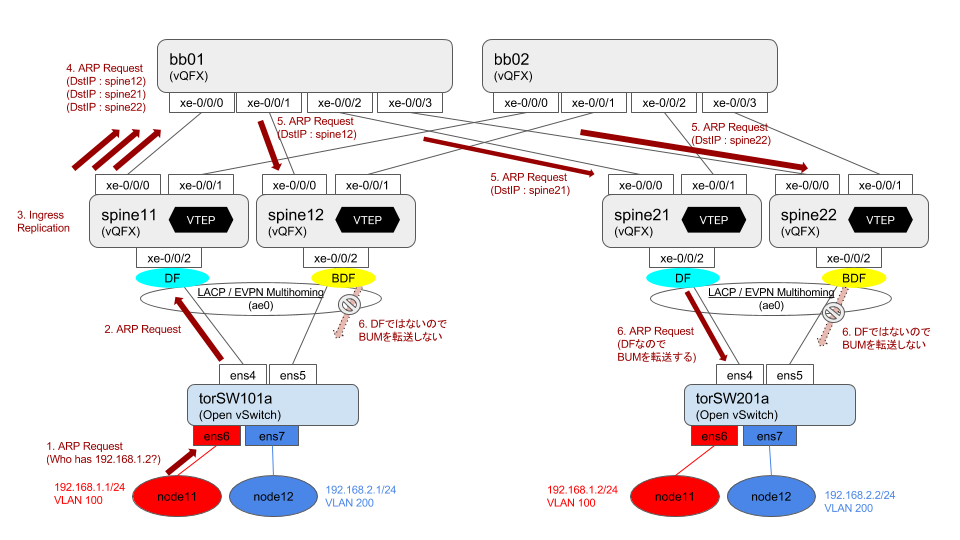
EthernetSegment リンク障害時動作確認(簡易)
仮想環境で真面目に障害試験をやるつもりはサラサラないので、何となく「あー Multihoming を組んでいる単一リンクを落としても経路が切り替わるね」とか「あー、想定通りの経路広告がされるね」くらいの緩いやつです。
今回の環境だと spine と torSW の間に全部パケットキャプチャ用の Ethernet Switch を挟んでいて、対向のリンクダウン検知なんてできず、単に torSW 側では LACP で検知して切り替わっているだけですし...。
node11 から node21 に ping 撃ちながら spine11 の xe-0/0/2 (to torSW101a) を disable
{master:0}[edit]
kotetsu@spine11# show | compare
[edit interfaces xe-0/0/2]
+ disable;
切り替わり時間とかは、環境に左右されるので参考にしないでください。あくまで「ホントに切り替わったね」を見ただけですので。
kotetsu@node11:~$ ping 192.168.1.2 PING 192.168.1.2 (192.168.1.2) 56(84) bytes of data. 64 bytes from 192.168.1.2: icmp_seq=1 ttl=64 time=49.3 ms 64 bytes from 192.168.1.2: icmp_seq=2 ttl=64 time=60.0 ms ... 64 bytes from 192.168.1.2: icmp_seq=59 ttl=64 time=58.4 ms 64 bytes from 192.168.1.2: icmp_seq=60 ttl=64 time=75.0 ms 64 bytes from 192.168.1.2: icmp_seq=64 ttl=64 time=64.3 ms 64 bytes from 192.168.1.2: icmp_seq=65 ttl=64 time=70.8 ms 64 bytes from 192.168.1.2: icmp_seq=66 ttl=64 time=44.2 ms ... --- 192.168.1.2 ping statistics --- 68 packets transmitted, 65 received, 4% packet loss, time 67123ms rtt min/avg/max/mdev = 27.724/44.214/92.524/13.438 ms
リンク復旧
--- 192.168.1.2 ping statistics --- 60 packets transmitted, 60 received, 0% packet loss, time 59093ms rtt min/avg/max/mdev = 28.324/45.522/79.932/12.499 ms
この一連の障害で spine11 からの UPDATE/Withdrawn も拾ったので貼っておきます。
まずリンク disabled 時の WithDrawn
Type1~4~3と2が順次 WithDrawn されていく様です。(リンク障害時に Type 2,3 が全部 WithDrawn される前に、まずはザクッと ES 死んだことを別 PE に広告することで、少しでも早く自分宛に送ってこなくなるようにする = 高速な切り替えを促すために Type1 を最初に...という動き)
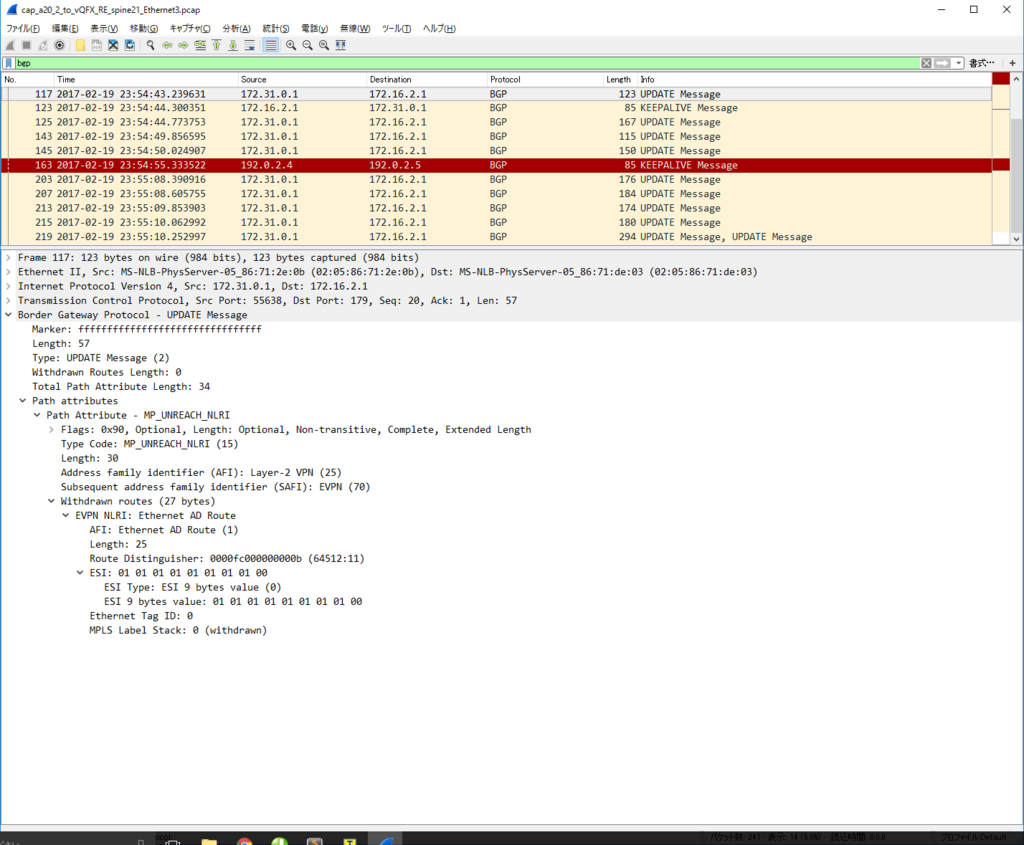
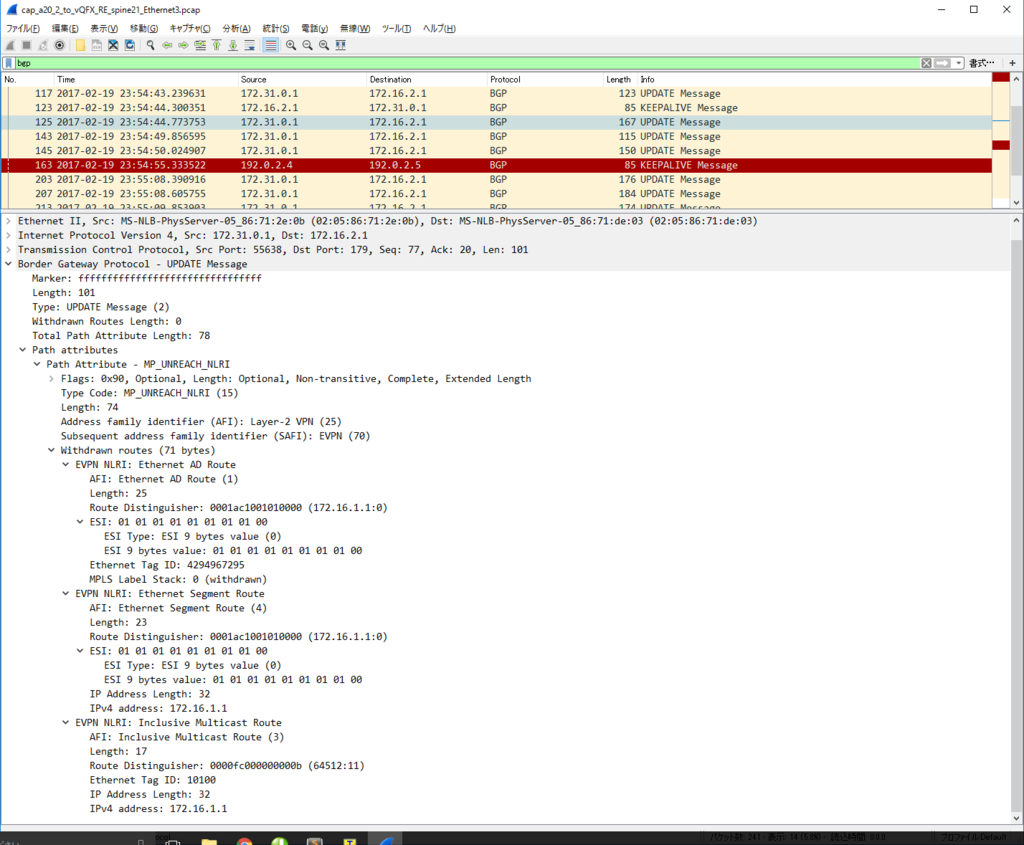
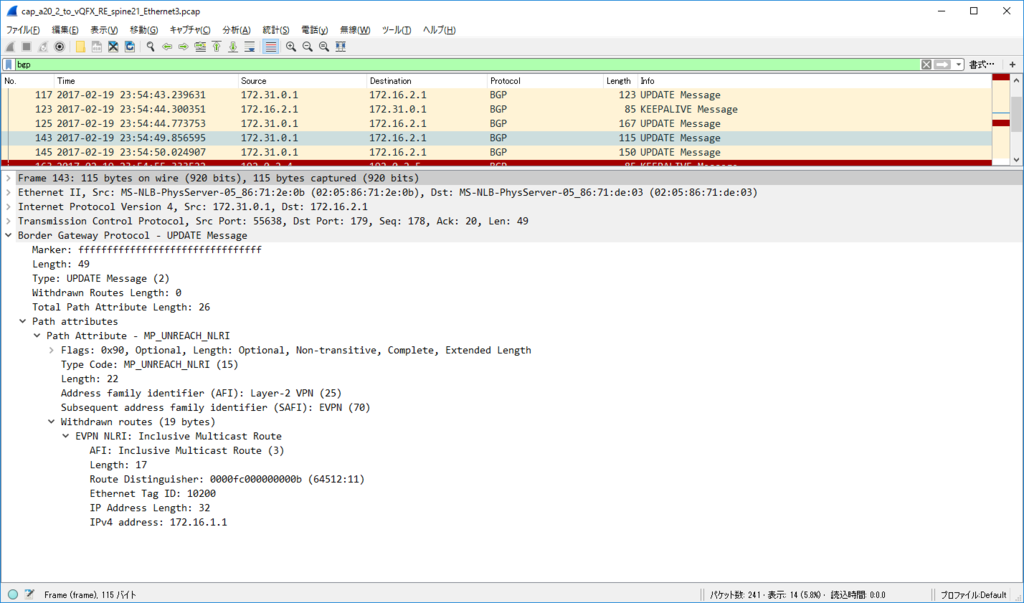
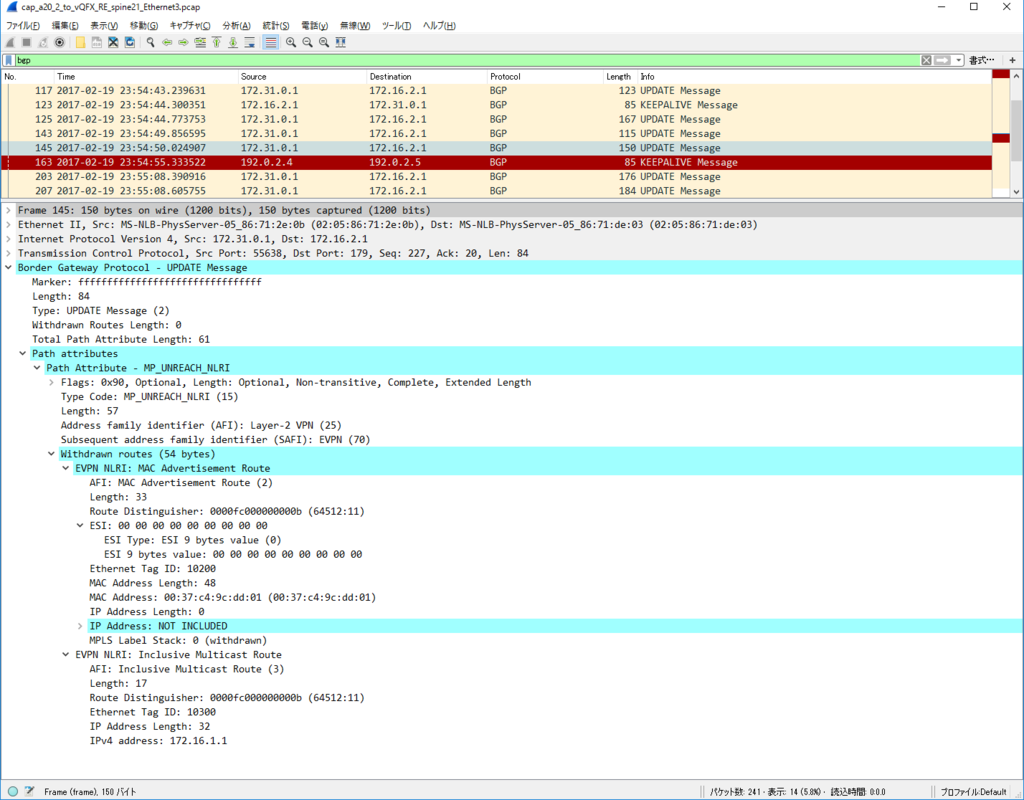
次にリンク復旧時の UPDATE
Type1~4~3が順次 UPDATE される様です。
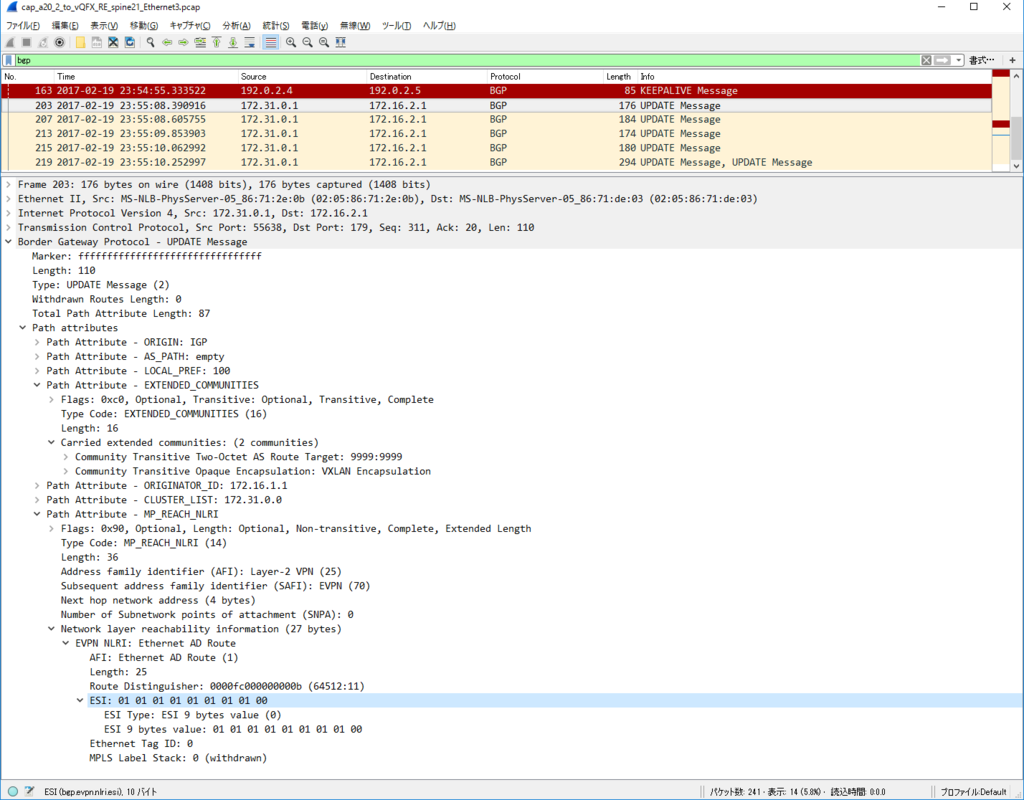
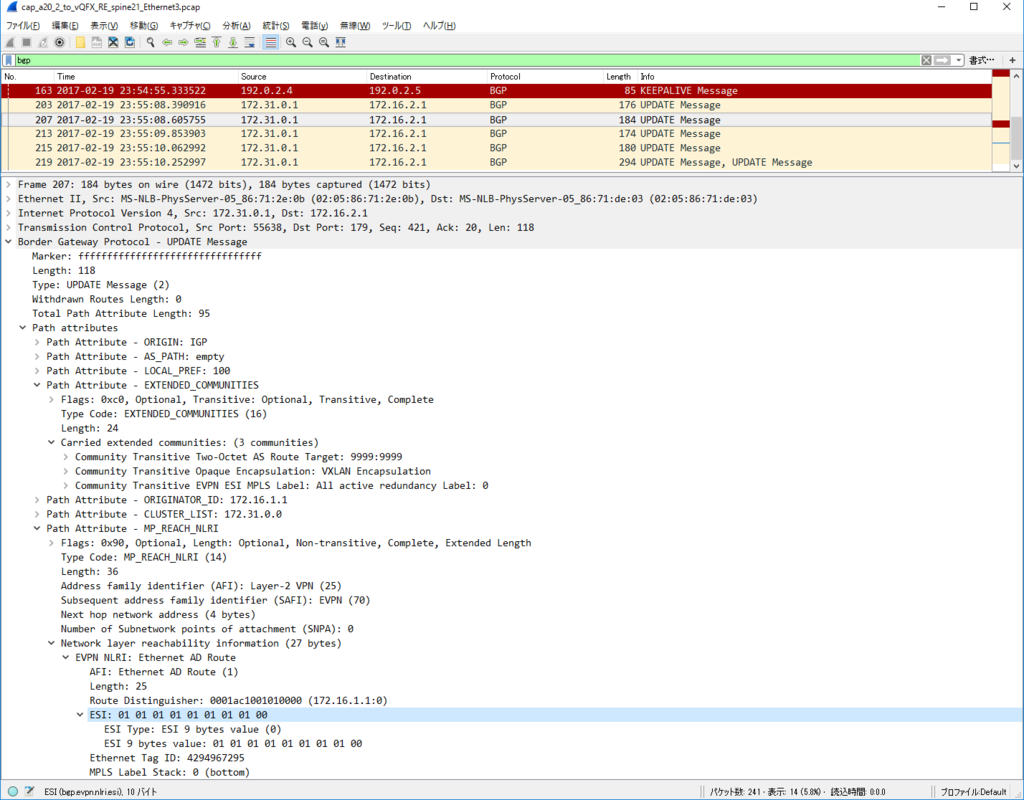
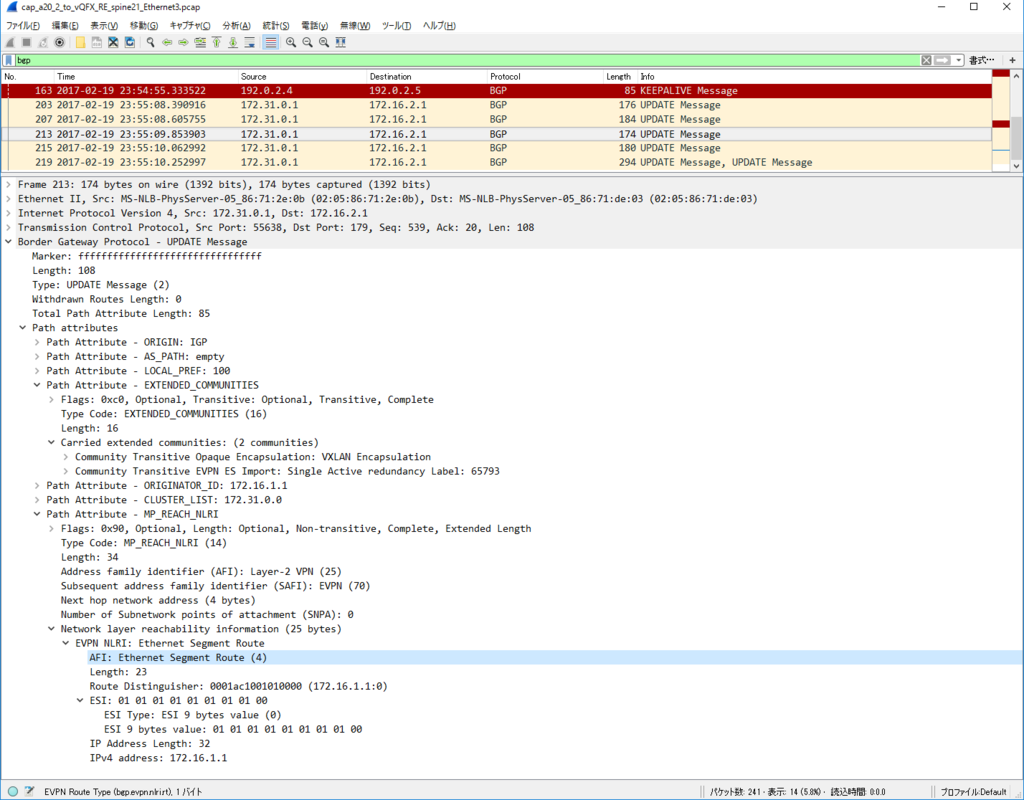
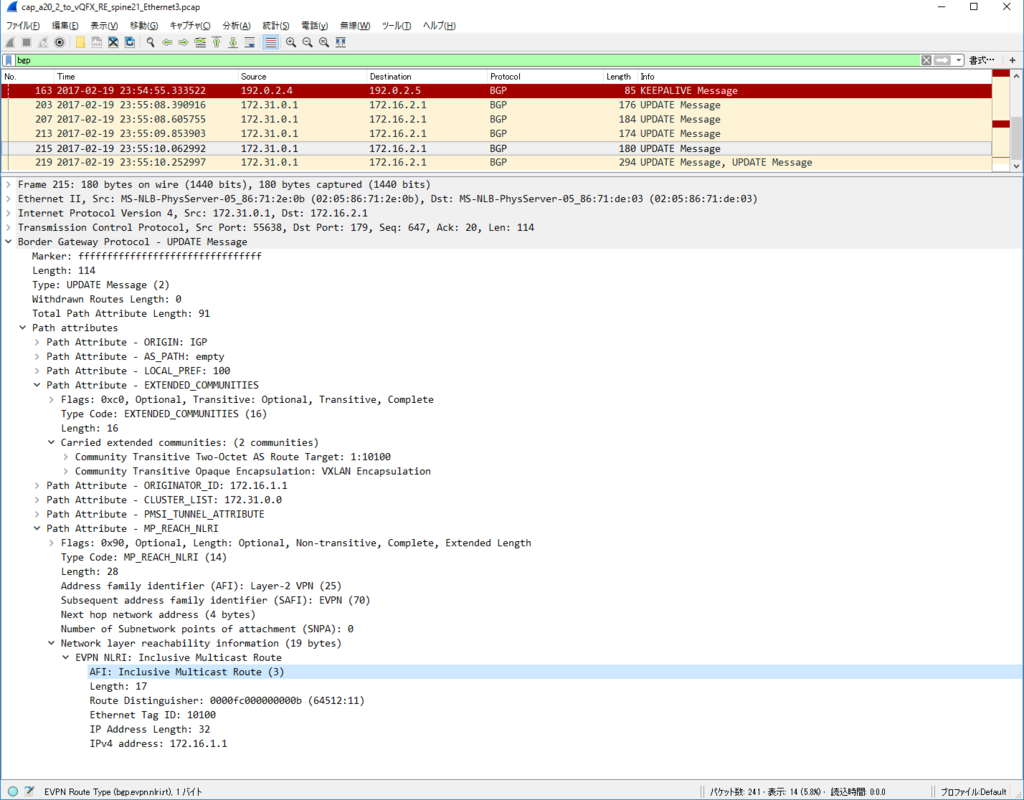
動作確認(トラフィック バイバイ~ン 問題~~~(ドラ声で))
4台の spine で clear ethernet-switching table して、node[12]1 は双方の MAC アドレスが ARP テーブルに載っている状態で
kotetsu@node11:~$ ip n show 10.0.0.254 dev ens3 lladdr 00:a0:de:c0:55:80 REACHABLE 192.168.1.2 dev ens4 lladdr 00:37:c4:46:d8:01 STALE 10.0.0.65 dev ens3 lladdr 52:54:00:07:30:c0 DELAY
kotetsu@node21:~$ ip n show 192.168.1.1 dev ens4 lladdr 00:37:c4:e2:60:01 STALE 10.0.0.254 dev ens3 lladdr 00:a0:de:c0:55:80 STALE 10.0.0.65 dev ens3 lladdr 52:54:00:07:30:c0 DELAY
DUP る。
kotetsu@node11:~$ ping 192.168.1.2 PING 192.168.1.2 (192.168.1.2) 56(84) bytes of data. 64 bytes from 192.168.1.2: icmp_seq=1 ttl=64 time=85.3 ms 64 bytes from 192.168.1.2: icmp_seq=2 ttl=64 time=88.3 ms 64 bytes from 192.168.1.2: icmp_seq=2 ttl=64 time=101 ms (DUP!) 64 bytes from 192.168.1.2: icmp_seq=2 ttl=64 time=103 ms (DUP!) 64 bytes from 192.168.1.2: icmp_seq=2 ttl=64 time=130 ms (DUP!) 64 bytes from 192.168.1.2: icmp_seq=3 ttl=64 time=78.4 ms 64 bytes from 192.168.1.2: icmp_seq=3 ttl=64 time=81.7 ms (DUP!) 64 bytes from 192.168.1.2: icmp_seq=3 ttl=64 time=128 ms (DUP!) 64 bytes from 192.168.1.2: icmp_seq=4 ttl=64 time=43.2 ms 64 bytes from 192.168.1.2: icmp_seq=5 ttl=64 time=51.9 ms 64 bytes from 192.168.1.2: icmp_seq=6 ttl=64 time=46.1 ms 64 bytes from 192.168.1.2: icmp_seq=7 ttl=64 time=37.7 ms ^C --- 192.168.1.2 ping statistics --- 7 packets transmitted, 7 received, +5 duplicates, 0% packet loss, time 6009ms rtt min/avg/max/mdev = 37.764/81.372/130.159/30.336 ms
パケットを拾って、一番酷い ICMP Echo (Request|Reply) Sequence No.2 の状況を追ってみると
node21- Sequence No.2 の ICMP Echo Request を2個受信している
node11- Sequence No.2 の ICMP Echo Request を1個しか送信していない
- Sequence No.2 の ICMP Echo Reply を4個受信している
torSW101a- Sequence No.2 の ICMP Echo Request を
spine12に転送している
- Sequence No.2 の ICMP Echo Request を
spine12bb01- Sequence No.2 の ICMP Echo Request をそのまま
spine11,spine21,spine22に転送
- Sequence No.2 の ICMP Echo Request をそのまま
spine21,spine22- Sequence No.2 の ICMP Echo Request のカプセルの中身は DstMAC が
node21で、自分の ES 配下にいるやつへの Unicast Traffic なので、そのままtorSw201aに転送(もしかしたら、spine21はこの時点でnode21の MACアドレスを学習しておらず、Unknown Unicast として Multihoming の DF 動作を果たした、という可能性も) - EVPN Multihoming の挙動としては正しい
- Sequence No.2 の ICMP Echo Request のカプセルの中身は DstMAC が
という感じでして。
現状の実装だと仕方ない挙動と言わざるをえない...でしょうかね。そもそもあまり起こりえないシナリオですかね。僕はノリで clear ethernet-switching table とかよく叩くんすが(そりゃ検証環境だからだ)。
EVPN Multihoming Mode を active-standby にしても、前述の spine2[12] の挙動は変わらず、Remote VTEP 側(spine12)が DF にのみ送信してくることを期待しているように見えますし...。
なんかこの辺の問題提起やら解決案やらが RFC, draft であったりするんでしょうか。もしくは各メーカの実装で何か回避できているんでしょうか。追っている人がいたら是非教えてください...。
一応、以下は spine12 と bb01 間のパケットキャプチャですが、Sequence No.2 の ICMP Echo Request を Ingress Replication した直後に spine21 から EVPN NLRI Type2 で node21 の MAC アドレス advertise を受けているの図です。
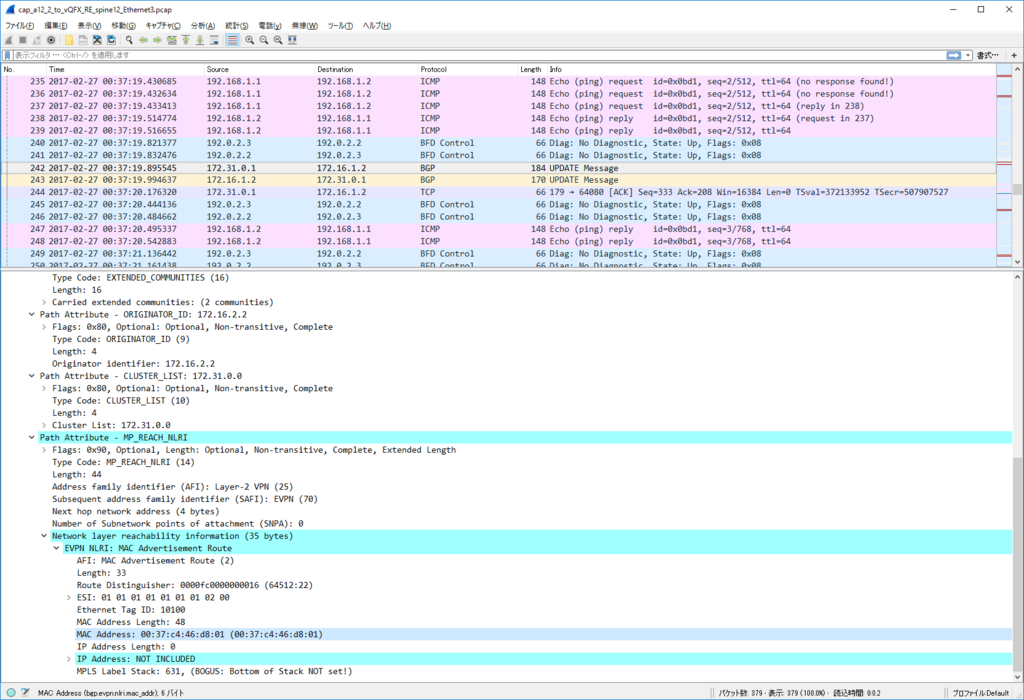
おしまい
まとめ
EVPN Multihomingの触りを試して、最低限の正常動作が確認できました- RFC7432(BGP MPLS-Based Ethernet VPN) Multihoming に書かれている内容(で実装されているもの)は、今回試した範囲には収まりきらんので色々やってみましょう
所感
- VTEP を冗長化する手法として考えると、EVPN Multihoming は各 PE がそれなりに独立して動いてくれるのが嬉しいです。変に独自機構を使うと「その冗長化プロトコルを形成できるバージョンの組み合わせ」でバージョンアップとかが苦しくなりそうなので...。
- 偏見かも知らんけど L2, L4 の世界はその辺で結構苦しむような...。
- 例えば、同じ Juniper でいうと
MC-LAGとかはどうなんでしょうね。組めるバージョンの組み合わせとか気にして運用するもんでしょうか。
vQFXいいすね...100万回言ってますけど、この辺の調査/検証をお家で好きにできると、色々と敷居が下がるので。- こうなってくると、本記事の
torSW[12]01aにあたるところに、QFX5110とかQFX5200とかの仮想版も欲しくなってきますね
- こうなってくると、本記事の
- この辺のニッチな話に興味がある人、冒頭で紹介した oreilly の「Juniper QFX10000 Series」もオススメですよ!
- 独自プロセッサ開発経緯や特徴・Architecture(HW/SW) の結構詳しい説明・MPLS/VXLAN+EVPNの設計ポイント とか、箱を持っていなくても読んでいて楽しいです
- Juniper QFX10000 最高!みんな買おうぜ!!(買えない)
vQFX10000 で VXLAN+EVPN (evpn-inter-subnet-forwarding(Symmetric) 編) (original : 2017/01/09)
この記事は某所で 2017/01/09 に書いたもののコピーです。
そのため 2017/05/13 時点ではやや古い情報も含まれています。(以下一例)
- 201705 に
GNS3 ver2.0 stableが出た
.
最初に
先日(vQFX10000 を KVM+GNS3 で動かす)、Juniper vQFX10000(以降 vQFX) の DL 権限を個人で得て GNS3 で軽く動作確認をとり、前回(vQFX10000 で VXLAN+EVPN (L2 over L3 編))、仮想版でも L2VPN 機能が動くことを確認しました。
QFX10000系では EVPN NLRI Type5 Route (参考資料の draft 参照)で Symmetric な evpn-inter-subnet-forwarding ができるようなので、今回は vQFX でそれを試します。(あらすじが長い...)
本項でやること
- vQFX で VXLAN の Control Plane として EVPN を動かす
- EVPN NLRI Type5(EVPN Prefix Advertisement) を使って evpn-inter-subnet-forwarding (Symmetric)を動かす
- 前回の NLRI Type2+3 を使った L2 over L3 も併用できるか確認する
- 下図の赤い点線部分
- Type5 を使って VRFtoVRF しているドキュメントでは「セグメントが単一サイト(/部屋)に閉じる場合には」という文言があったりするけれど
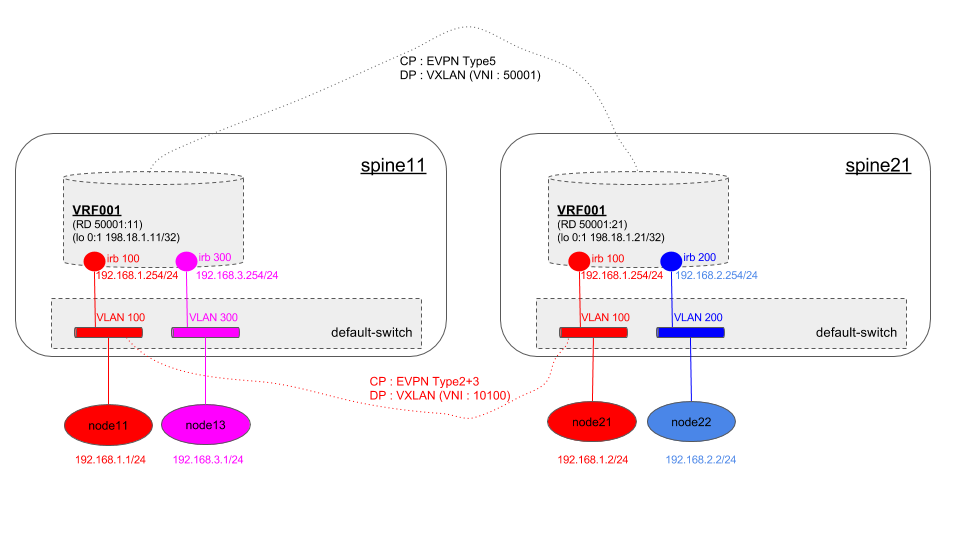
概要構成図
前回に引き続き、下図の感じで。
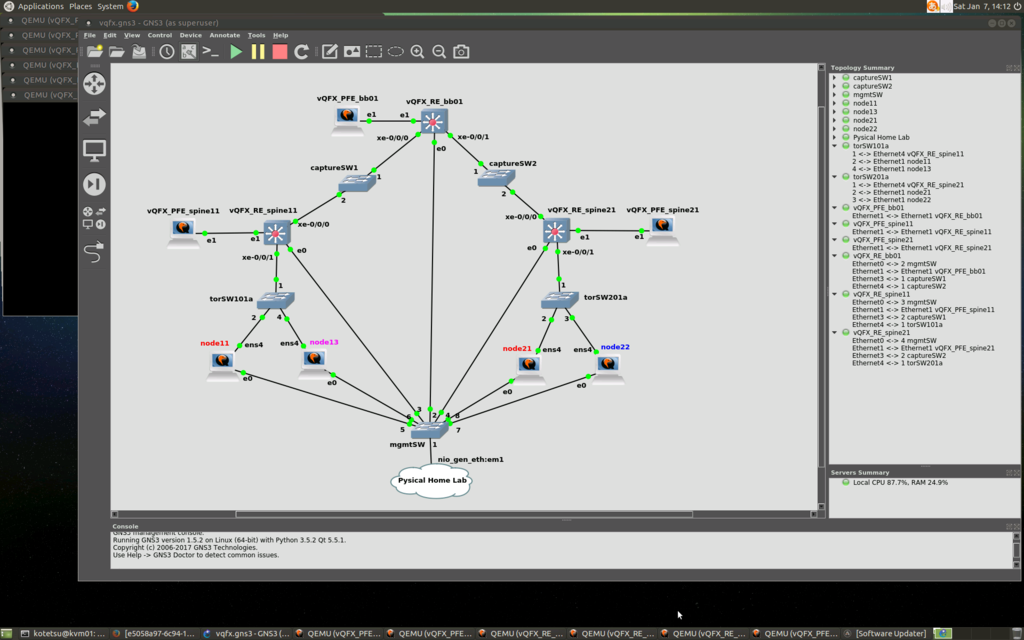
余談。
本環境の GNS3 1.5.2 でパケットキャプチャするために、qemu 同士を直結せずに、間に GNS3 の Ethernet Switch を挟む構成にしてます。が、「pelican@ainoniwa.net / GNS3 2.0からはKVM間のパケットキャプチャも取れるようになるぞい」のように GNS3 2.0(2017/01/04 時点では beta 版, 2017/05/13時点ではstable版公開済)を使えば、これが不要になります。やったぜ!
参考資料
- 前回の参考資料 全般
- EVPN 標準
- draft-ietf-bess-evpn-prefix-advertisement-03 (IP Prefix Advertisement in EVPN)
- EVPN NLRI Type5 を使って IP-VRF to IP-VRF で IP Prefix Advertise しようというお話
- draft-ietf-bess-evpn-inter-subnet-forwarding-01 (Integrated Routing and Bridging in EVPN)
- L3 全般
AsymmetricとSymmetricに関する話はこれを読むとわかる
- draft-ietf-bess-evpn-prefix-advertisement-03 (IP Prefix Advertisement in EVPN)
- JUNOS での VXLAN+EVPN inter-subnet-forwarding 実装・設定周り
- Juniper公式 / ip-prefix-routes コマンド at JUNOS15.1
Statement introduced in Junos OS Release 15.1x53-D60 for QFX10000 Series switches.だそうな- んで vQFX(
15.1X53-D60.4)でも設定可能
- 少し前の実装
- Juniper公式 / ip-prefix-support コマンド at JUNOS15.1
Statement introduced in Junos OS Release 15.1x53-D30 on QFX10002 switches.だそうでThis statement is deprecated starting with Junos OS Release 15.1x53-D60 and has been replaced with ip-prefix-routes.ってことらしく、バージョンをあげると自動的にip-prefix-routesになるらしいので- vQFX(
15.1X53-D60.4)では設定不可
- Juniper公式 / Configuring EVPN Type 5 for QFX10000 Series Switches / Configuration Example
- 上記を用いた分かりやすいサンプル
- Juniper公式 / ip-prefix-support コマンド at JUNOS15.1
- NetOne コラム / EVPN で変わる・変えられるデータセンターネットワーク1
- Juniper MX を使った L2 + L3 の具体的な例(2016/03 時点のものみたい)
- 多分これは
Asymmetricなやつ - 日本語で嚙み砕いた説明
- Juniper公式 / ip-prefix-routes コマンド at JUNOS15.1
- その他
- Cisco 発表資料(20160120) / VXLANチュートリアル
- スライド 16-25 に
AsymmetricとSymmetricの噛み砕いだ日本語図解あり - この時点では「Juniper のは
Asymmetric実装・Cisco のはSymmetric実装」と紹介されているが - 2017/01現在は Juniper にも
Symmetric実装があるよ、というのを本項で扱う
- スライド 16-25 に
- Cisco 発表資料(20160120) / VXLANチュートリアル
- O'Reilly Juniper QFX10000 Series
- Juniper QFX10000 の独自プロセッサ開発経緯や特徴・Architecture(HW/SW) の結構詳しい説明・MPLS/VXLAN+EVPNの設計ポイント解説などが纏まった非常に良い本

Juniper QFX10000 Series: A Comprehensive Guide to Building Next-Generation Data Centers
- 作者: Douglas Richard, Jr. Hanks
- 出版社/メーカー: O'Reilly Media
- 発売日: 2016/08/11
- メディア: ペーパーバック
- この商品を含むブログを見る
- Juniper QFX10000 の独自プロセッサ開発経緯や特徴・Architecture(HW/SW) の結構詳しい説明・MPLS/VXLAN+EVPNの設計ポイント解説などが纏まった非常に良い本
構築~動作確認
GNS3 でデプロイ
前回の環境を引き続き使います。先にあげた概要構成図の通り。
疎通確認用 node 設定
以下のような感じで
kotetsu@node11:~$ ip a show dev ens4
3: ens4: <BROADCAST,MULTICAST,UP,LOWER_UP> mtu 1500 qdisc pfifo_fast state UP group default qlen 1000
link/ether 00:37:c4:e2:60:01 brd ff:ff:ff:ff:ff:ff
inet 192.168.1.1/24 brd 192.168.1.255 scope global ens4
valid_lft forever preferred_lft forever
inet6 fe80::237:c4ff:fee2:6001/64 scope link
valid_lft forever preferred_lft forever
kotetsu@node11:~$ ip route show dev ens4
192.168.0.0/16 via 192.168.1.254
192.168.1.0/24 proto kernel scope link src 192.168.1.1
kotetsu@node21:~$ ip a show dev ens4
3: ens4: <BROADCAST,MULTICAST,UP,LOWER_UP> mtu 1500 qdisc pfifo_fast state UP group default qlen 1000
link/ether 00:37:c4:46:d8:01 brd ff:ff:ff:ff:ff:ff
inet 192.168.1.2/24 brd 192.168.1.255 scope global ens4
valid_lft forever preferred_lft forever
inet6 fe80::237:c4ff:fe46:d801/64 scope link
valid_lft forever preferred_lft forever
kotetsu@node21:~$ ip route show dev ens4
192.168.0.0/16 via 192.168.1.254
192.168.1.0/24 proto kernel scope link src 192.168.1.2
kotetsu@node22:~$ ip a show dev ens4
3: ens4: <BROADCAST,MULTICAST,UP,LOWER_UP> mtu 1500 qdisc pfifo_fast state UP group default qlen 1000
link/ether 00:37:c4:3d:e0:01 brd ff:ff:ff:ff:ff:ff
inet 192.168.2.2/24 brd 192.168.2.255 scope global ens4
valid_lft forever preferred_lft forever
inet6 fe80::237:c4ff:fe3d:e001/64 scope link
valid_lft forever preferred_lft forever
kotetsu@node22:~$ ip route show dev ens4
192.168.0.0/16 via 192.168.2.254
192.168.2.0/24 proto kernel scope link src 192.168.2.2
kotetsu@node13:~$ ip a show dev ens4
3: ens4: <BROADCAST,MULTICAST,UP,LOWER_UP> mtu 1500 qdisc pfifo_fast state UP group default qlen 1000
link/ether 00:37:c4:0d:a8:01 brd ff:ff:ff:ff:ff:ff
inet 192.168.3.1/24 brd 192.168.3.255 scope global ens4
valid_lft forever preferred_lft forever
inet6 fe80::237:c4ff:fe0d:a801/64 scope link
valid_lft forever preferred_lft forever
kotetsu@node13:~$ ip route show dev ens4
192.168.0.0/16 via 192.168.3.254
192.168.3.0/24 proto kernel scope link src 192.168.3.1
vQFX 基本設定ちょいたし
EVPN にこんな設定をして /var/log/evpn.log で追えるようにしときました。flag all にしたらちょっと追いきれない情報量になったので、そこはお好みで...。
set protocols evpn traceoptions file evpn.log set protocols evpn traceoptions file size 10k set protocols evpn traceoptions file files 30 set protocols evpn traceoptions flag all
vQFX Inter Subnet Forwarding 設定~確認
Inter Subnet Forwarding 設定
spine11
前回こんな感じの設定を入れてあったので
{master:0}[edit]
kotetsu@spine11# show vlans | display set
set vlans VLAN0100 vlan-id 100
set vlans VLAN0100 vxlan vni 10100
set vlans VLAN0100 vxlan ingress-node-replication
set vlans VLAN0300 vlan-id 300
set vlans VLAN0300 vxlan vni 10300
set vlans VLAN0300 vxlan ingress-node-replication
set vlans default vlan-id 1
以下で IRB 作成 ~ VRF 作成
set interfaces irb unit 100 family inet address 192.168.1.254/24 set interfaces irb unit 100 proxy-macip-advertisement set interfaces irb unit 300 family inet address 192.168.3.254/24 set interfaces irb unit 300 proxy-macip-advertisement set vlans VLAN0100 l3-interface irb.100 set vlans VLAN0300 l3-interface irb.300 set interfaces lo0 unit 1 family inet address 198.18.1.11/32 set routing-instances VRF001 instance-type vrf set routing-instances VRF001 interface irb.100 set routing-instances VRF001 interface irb.300 set routing-instances VRF001 interface lo0.1 set routing-instances VRF001 route-distinguisher 50001:11 set routing-instances VRF001 vrf-target target:64512:50001 set routing-instances VRF001 protocols evpn ip-prefix-routes advertise direct-nexthop set routing-instances VRF001 protocols evpn ip-prefix-routes encapsulation vxlan set routing-instances VRF001 protocols evpn ip-prefix-routes vni 50001
ポイントは protocols evpn ip-prefix-routes 周りの設定ですね。
これで VRF to VRF で EVPN NLRI Type5 で IP Prefix や自分の MAC アドレス(Router's MAC) を送信できるようになるはず。
Juniper公式 / ReleaseNotes Junos 15.1X53-D60 for QFX10000 Switches の 19 ページによると
Best practice for EVPN-VXLAN configuration (QFX10000 switches)—Starting with Junos OS Release 15.1X53-D60, in an EVPN-VXLAN configuration on QFX10000 switches, you no longer need to configure vxlan ingress-node-replication.
だそうな。なんでだろ。とにかく Best Practice なら従っておくのがよかろうということで。
delete vlans VLAN0100 vxlan ingress-node-replication delete vlans VLAN0300 vxlan ingress-node-replication
これを消さずにテストしていた時、なんか EVPN NLRI Type3 を送ってきていない Remote VTEP と VNI の組み合わせに対して BUM を ingress replication 転送してたんだよな...ということで消すのが正解と思います。
あと自分の環境起因かもですが、この辺の設定追加・変更して commit した時に、bb01 と spine[12]1 の間で LLDP や BGP がフラッピングし始めることがありました。ちゃんと追ってないですが、そんな時にはおとなしく request system reboot して落ち着かせました。(雑)
spine21
spine11 とほとんど一緒です。
前回こんな感じの設定を入れてあったので
{master:0}[edit]
kotetsu@spine21# show vlans | display set
set vlans VLAN0100 vlan-id 100
set vlans VLAN0100 vxlan vni 10100
set vlans VLAN0100 vxlan ingress-node-replication
set vlans VLAN0200 vlan-id 200
set vlans VLAN0200 vxlan vni 10200
set vlans VLAN0200 vxlan ingress-node-replication
set vlans default vlan-id 1
以下で IRB 作成 ~ VRF 作成
set interfaces irb unit 100 family inet address 192.168.1.254/24 set interfaces irb unit 100 proxy-macip-advertisement set interfaces irb unit 200 family inet address 192.168.2.254/24 set interfaces irb unit 200 proxy-macip-advertisement set vlans VLAN0100 l3-interface irb.100 set vlans VLAN0200 l3-interface irb.200 set interfaces lo0 unit 1 family inet address 198.18.1.21/32 set routing-instances VRF001 instance-type vrf set routing-instances VRF001 interface irb.100 set routing-instances VRF001 interface irb.200 set routing-instances VRF001 interface lo0.1 set routing-instances VRF001 route-distinguisher 50001:21 set routing-instances VRF001 vrf-target target:64512:50001 set routing-instances VRF001 protocols evpn ip-prefix-routes advertise direct-nexthop set routing-instances VRF001 protocols evpn ip-prefix-routes encapsulation vxlan set routing-instances VRF001 protocols evpn ip-prefix-routes vni 50001
前述の通り Best Practice に従っておく。
delete vlans VLAN0100 vxlan ingress-node-replication delete vlans VLAN0200 vxlan ingress-node-replication
動作確認
IPアドレス・MACアドレス情報 整理
ちょっとノード数が増えてきたので、まとめときます。
| VLAN | IPアドレス | MACアドレス | ノード | インターフェース | 備考 |
|---|---|---|---|---|---|
| 100 | 192.168.1.1/24 |
00:37:c4:e2:60:01 |
node11 |
ens4 |
spine11 配下 |
| 100 | 192.168.1.2/24 |
00:37:c4:46:d8:01 |
node21 |
ens4 |
spine21 配下 |
| 100 | 192.168.1.254/24 |
02:05:86:71:3c:00 |
spine11 |
irb |
|
| 100 | 192.168.1.254/24 |
02:05:86:71:d8:00 |
spine21 |
irb |
|
| 200 | 192.168.2.2/24 |
00:37:c4:3d:e0:01 |
node22 |
ens4 |
spine21 配下 |
| 200 | 192.168.2.254/24 |
02:05:86:71:d8:00 |
spine21 |
irb |
|
| 300 | 192.168.3.1/24 |
00:37:c4:0d:a8:01 |
node13 |
ens4 |
spine11 配下 |
| 300 | 192.168.3.254/24 |
02:05:86:71:3c:00 |
spine11 |
irb |
|
| - | 192.0.2.1/30 |
02:05:86:71:21:03 |
bb01 |
xe-0/0/0 |
spine21 側 |
| - | 192.0.2.2/30 |
02:05:86:71:3c:03 |
spine11 |
xe-0/0/0 |
bb01 側 |
| - | 192.0.2.5/30 |
02:05:86:71:21:07 |
bb01 |
xe-0/0/1 |
spine21 側 |
| - | 192.0.2.6/30 |
02:05:86:71:d8:03 |
spine21 |
xe-0/0/0 |
bb01 側 |
spine11 と spine21 の IRB MAC アドレス at VLAN100 は各物理のものになっていて、共有用の仮想 MAC を設定したりはしていないです。
spine11 配下の node11 は spine11 の IRB MACアドレスをゲートウェイとして使い、spine21 配下の node21 は spine21 の IRB MACアドレスをゲートウェイとして使う...ってな動きになるのか、を見ようという主旨。
node間疎通確認~ARPテーブル確認
4 台の node 間をフルメッシュに ping 簡易疎通確認、とりあえず疎通オールおっけー。
直後 ARP テーブル確認
- node11(192.168.1.1/24)
kotetsu@node11:~$ ip n show dev ens4 192.168.1.254 lladdr 02:05:86:71:3c:00 REACHABLE ## spine11 IRB の MACaddr 192.168.1.2 lladdr 00:37:c4:46:d8:01 STALE
- node21(192.168.1.2/24)
kotetsu@node21:~$ ip n show dev ens4 192.168.1.254 lladdr 02:05:86:71:d8:00 REACHABLE ## spine21 IRB の MACaddr 192.168.1.1 lladdr 00:37:c4:e2:60:01 REACHABLE
- node13(192.168.3.1/24)
kotetsu@node13:~$ ip n show dev ens4 192.168.3.254 lladdr 02:05:86:71:3c:00 STALE ## spine11 IRB の MACaddr
- node22(192.168.2.2/24)
kotetsu@node22:~$ ip n show dev ens4 192.168.2.254 lladdr 02:05:86:71:d8:00 REACHABLE ## spine21 IRB の MACaddr
ちなみに spine11 や spine12 から ping を実行しようとしたら、自発パケットを EVPN 方面には流られないっぽいです。そりゃあそうか。
{master:0}
kotetsu@spine21> ping routing-instance VRF001 192.168.1.2
PING 192.168.1.2 (192.168.1.2): 56 data bytes
64 bytes from 192.168.1.2: icmp_seq=0 ttl=64 time=6.448 ms
64 bytes from 192.168.1.2: icmp_seq=1 ttl=64 time=5.700 ms
{master:0}
kotetsu@spine21> ping routing-instance VRF001 192.168.3.1
PING 192.168.3.1 (192.168.3.1): 56 data bytes
ping: sendto: Operation not supported
ping: sendto: Operation not supported
{master:0}
kotetsu@spine21> show route table VRF001.inet.0 192.168.3.0/24
VRF001.inet.0: 8 destinations, 9 routes (8 active, 0 holddown, 0 hidden)
+ = Active Route, - = Last Active, * = Both
192.168.3.0/24 *[EVPN/170] 20:55:03
> to 192.0.2.5 via xe-0/0/0.0
パッと見は巧いこと通信できているようですが...ちょっと中身を追っていきます。
vQFXテーブル確認
EVPN
両方の spine につくっている VLAN100(VNI 10100)の MAC 情報だけが Remote から学習したものに含まれ...ってやはり Router's MAC として 192.168.1.254 の実 MAC 2 台分を学習している。
{master:0}
kotetsu@spine11> show evpn database
Instance: default-switch
VLAN VNI MAC address Active source Timestamp IP address
10100 00:37:c4:46:d8:01 172.16.2.1 Jan 08 21:35:56
10100 00:37:c4:e2:60:01 xe-0/0/1.0 Jan 08 01:30:42 192.168.1.1
10100 02:05:86:71:3c:00 irb.100 Jan 08 12:50:23 192.168.1.254
10100 02:05:86:71:d8:00 172.16.2.1 Jan 08 12:50:38 192.168.1.254
10300 00:37:c4:0d:a8:01 xe-0/0/1.0 Jan 08 01:30:41 192.168.3.1
10300 02:05:86:71:3c:00 irb.300 Jan 08 01:27:27 192.168.3.254
{master:0}
kotetsu@spine21> show evpn database
Instance: default-switch
VLAN VNI MAC address Active source Timestamp IP address
10100 00:37:c4:46:d8:01 xe-0/0/1.0 Jan 08 01:30:41 192.168.1.2
10100 00:37:c4:e2:60:01 172.16.1.1 Jan 08 21:42:10 192.168.1.1
10100 02:05:86:71:3c:00 172.16.1.1 Jan 08 12:53:48 192.168.1.254
10100 02:05:86:71:d8:00 irb.100 Jan 08 12:54:02 192.168.1.254
10200 00:37:c4:3d:e0:01 xe-0/0/1.0 Jan 08 01:30:41 192.168.2.2
10200 02:05:86:71:d8:00 irb.200 Jan 08 01:16:21 192.168.2.254
自分が吐いている Type5 情報サマリ
{master:0}
kotetsu@spine11> show evpn l3-context
L3 context Type Adv Encap VNI/Label Router MAC/GW intf
VRF001 Cfg Direct VXLAN 50001 02:05:86:71:3c:00
{master:0}
kotetsu@spine21> show evpn l3-context
L3 context Type Adv Encap VNI/Label Router MAC/GW intf
VRF001 Cfg Direct VXLAN 50001 02:05:86:71:d8:00
Remote から Type 5 で学習した Router's MAC を確認して
{master:0}
kotetsu@spine11> show evpn ip-prefix-database
L3 context: VRF001
IPv4->EVPN Exported Prefixes
Prefix EVPN route status
192.168.1.0/24 Created
192.168.3.0/24 Created
EVPN->IPv4 Imported Prefixes
Prefix Etag IP route status
192.168.1.0/24 0 Created
Route distinguisher St VNI/Label Router MAC Nexthop/Overlay GW/ESI
50001:21 A 50001 02:05:86:71:d8:00 172.16.2.1
192.168.2.0/24 0 Created
Route distinguisher St VNI/Label Router MAC Nexthop/Overlay GW/ESI
50001:21 A 50001 02:05:86:71:d8:00 172.16.2.1
{master:0}
kotetsu@spine21> show evpn ip-prefix-database
L3 context: VRF001
IPv4->EVPN Exported Prefixes
Prefix EVPN route status
192.168.1.0/24 Created
192.168.2.0/24 Created
EVPN->IPv4 Imported Prefixes
Prefix Etag IP route status
192.168.1.0/24 0 Created
Route distinguisher St VNI/Label Router MAC Nexthop/Overlay GW/ESI
50001:11 A 50001 02:05:86:71:3c:00 172.16.1.1
192.168.3.0/24 0 Created
Route distinguisher St VNI/Label Router MAC Nexthop/Overlay GW/ESI
50001:11 A 50001 02:05:86:71:3c:00 172.16.1.1
Routing Table
当該 VRF の Routing Table サマリーを見て
{master:0}
kotetsu@spine11> show route instance VRF001 extensive
VRF001:
Router ID: 198.18.1.11
Type: vrf State: Active
Interfaces:
irb.100
irb.300
lo0.1
Route-distinguisher: 50001:11
Vrf-import: [ __vrf-import-VRF001-internal__ ]
Vrf-export: [ __vrf-export-VRF001-internal__ ]
Vrf-import-target: [ target:64512:50001 ]
Vrf-export-target: [ target:64512:50001 ]
Fast-reroute-priority: low
Tables:
VRF001.inet.0 : 9 routes (8 active, 0 holddown, 0 hidden)
VRF001.inet.3 : 0 routes (0 active, 0 holddown, 0 hidden)
VRF001.iso.0 : 0 routes (0 active, 0 holddown, 0 hidden)
VRF001.inet6.0 : 0 routes (0 active, 0 holddown, 0 hidden)
VRF001.inet6.3 : 0 routes (0 active, 0 holddown, 0 hidden)
VRF001.mdt.0 : 0 routes (0 active, 0 holddown, 0 hidden)
VRF001.evpn.0 : 4 routes (4 active, 0 holddown, 0 hidden)
{master:0}
kotetsu@spine21> show route instance VRF001 extensive
VRF001:
Router ID: 198.18.1.21
Type: vrf State: Active
Interfaces:
irb.100
irb.200
lo0.1
Route-distinguisher: 50001:21
Vrf-import: [ __vrf-import-VRF001-internal__ ]
Vrf-export: [ __vrf-export-VRF001-internal__ ]
Vrf-import-target: [ target:64512:50001 ]
Vrf-export-target: [ target:64512:50001 ]
Fast-reroute-priority: low
Tables:
VRF001.inet.0 : 9 routes (8 active, 0 holddown, 0 hidden)
VRF001.inet.3 : 0 routes (0 active, 0 holddown, 0 hidden)
VRF001.iso.0 : 0 routes (0 active, 0 holddown, 0 hidden)
VRF001.inet6.0 : 0 routes (0 active, 0 holddown, 0 hidden)
VRF001.inet6.3 : 0 routes (0 active, 0 holddown, 0 hidden)
VRF001.mdt.0 : 0 routes (0 active, 0 holddown, 0 hidden)
VRF001.evpn.0 : 4 routes (4 active, 0 holddown, 0 hidden)
中身のサマリをみる。まずは「bgp.evpn.0 = Junos OS ルーティング プロトコル プロセス(RPD)内のグローバル EVPN ルーティング テーブル」を
{master:0}
kotetsu@spine11> show route table bgp.evpn.0
bgp.evpn.0: 9 destinations, 9 routes (9 active, 0 holddown, 0 hidden)
+ = Active Route, - = Last Active, * = Both
1:172.16.2.1:0::050000fdea0000277400::FFFF:FFFF/304
*[BGP/170] 21:18:16, localpref 100, from 172.31.0.1
AS path: I, validation-state: unverified
> to 192.0.2.1 via xe-0/0/0.0
1:172.16.2.1:0::050000fdea000027d800::FFFF:FFFF/304
*[BGP/170] 21:18:16, localpref 100, from 172.31.0.1
AS path: I, validation-state: unverified
> to 192.0.2.1 via xe-0/0/0.0
2:64512:21::10100::00:37:c4:46:d8:01/304
*[BGP/170] 19:24:02, localpref 100, from 172.31.0.1
AS path: I, validation-state: unverified
> to 192.0.2.1 via xe-0/0/0.0
2:64512:21::10100::02:05:86:71:d8:00/304
*[BGP/170] 09:57:37, localpref 100, from 172.31.0.1
AS path: I, validation-state: unverified
> to 192.0.2.1 via xe-0/0/0.0
2:64512:21::10100::00:37:c4:46:d8:01::192.168.1.2/304
*[BGP/170] 09:36:35, localpref 100, from 172.31.0.1
AS path: I, validation-state: unverified
> to 192.0.2.1 via xe-0/0/0.0
2:64512:21::10100::00:37:c4:46:d8:01::192.168.1.2/304
*[BGP/170] 09:36:35, localpref 100, from 172.31.0.1
AS path: I, validation-state: unverified
> to 192.0.2.1 via xe-0/0/0.0
2:64512:21::10100::02:05:86:71:d8:00::192.168.1.254/304
*[BGP/170] 09:57:37, localpref 100, from 172.31.0.1
AS path: I, validation-state: unverified
> to 192.0.2.1 via xe-0/0/0.0
3:64512:21::10100::172.16.2.1/304
*[BGP/170] 19:24:02, localpref 100, from 172.31.0.1
AS path: I, validation-state: unverified
> to 192.0.2.1 via xe-0/0/0.0
5:50001:21::0::192.168.1.0::24/304
*[BGP/170] 21:18:16, localpref 100, from 172.31.0.1
AS path: I, validation-state: unverified
> to 192.0.2.1 via xe-0/0/0.0
5:50001:21::0::192.168.2.0::24/304
*[BGP/170] 21:18:16, localpref 100, from 172.31.0.1
AS path: I, validation-state: unverified
> to 192.0.2.1 via xe-0/0/0.0
{master:0}
kotetsu@spine21> show route table bgp.evpn.0
bgp.evpn.0: 9 destinations, 9 routes (9 active, 0 holddown, 0 hidden)
+ = Active Route, - = Last Active, * = Both
1:172.16.1.1:0::050000fde90000277400::FFFF:FFFF/304
*[BGP/170] 10:02:28, localpref 100, from 172.31.0.1
AS path: I, validation-state: unverified
> to 192.0.2.5 via xe-0/0/0.0
1:172.16.1.1:0::050000fde90000283c00::FFFF:FFFF/304
*[BGP/170] 21:26:18, localpref 100, from 172.31.0.1
AS path: I, validation-state: unverified
> to 192.0.2.5 via xe-0/0/0.0
2:64512:11::10100::00:37:c4:e2:60:01/304
*[BGP/170] 19:32:22, localpref 100, from 172.31.0.1
AS path: I, validation-state: unverified
> to 192.0.2.5 via xe-0/0/0.0
2:64512:11::10100::02:05:86:71:3c:00/304
*[BGP/170] 10:02:28, localpref 100, from 172.31.0.1
AS path: I, validation-state: unverified
> to 192.0.2.5 via xe-0/0/0.0
2:64512:11::10100::00:37:c4:e2:60:01::192.168.1.1/304
*[BGP/170] 10:01:04, localpref 100, from 172.31.0.1
AS path: I, validation-state: unverified
> to 192.0.2.5 via xe-0/0/0.0
2:64512:11::10100::02:05:86:71:3c:00::192.168.1.254/304
*[BGP/170] 10:02:28, localpref 100, from 172.31.0.1
AS path: I, validation-state: unverified
> to 192.0.2.5 via xe-0/0/0.0
3:64512:11::10100::172.16.1.1/304
*[BGP/170] 19:32:21, localpref 100, from 172.31.0.1
AS path: I, validation-state: unverified
> to 192.0.2.5 via xe-0/0/0.0
5:50001:11::0::192.168.1.0::24/304
*[BGP/170] 10:02:29, localpref 100, from 172.31.0.1
AS path: I, validation-state: unverified
> to 192.0.2.5 via xe-0/0/0.0
5:50001:11::0::192.168.3.0::24/304
*[BGP/170] 21:26:18, localpref 100, from 172.31.0.1
AS path: I, validation-state: unverified
> to 192.0.2.5 via xe-0/0/0.0
次に当該 VRF のさまりー
{master:0}
kotetsu@spine11> show route table VRF001.evpn.0
VRF001.evpn.0: 4 destinations, 4 routes (4 active, 0 holddown, 0 hidden)
+ = Active Route, - = Last Active, * = Both
5:50001:11::0::192.168.1.0::24/304
*[EVPN/170] 10:15:34
Indirect
5:50001:11::0::192.168.3.0::24/304
*[EVPN/170] 21:36:19
Indirect
5:50001:21::0::192.168.1.0::24/304
*[BGP/170] 21:35:58, localpref 100, from 172.31.0.1
AS path: I, validation-state: unverified
> to 192.0.2.1 via xe-0/0/0.0
5:50001:21::0::192.168.2.0::24/304
*[BGP/170] 21:35:58, localpref 100, from 172.31.0.1
AS path: I, validation-state: unverified
> to 192.0.2.1 via xe-0/0/0.0
{master:0}
kotetsu@spine11> show route table VRF001.inet.0
VRF001.inet.0: 8 destinations, 9 routes (8 active, 0 holddown, 0 hidden)
+ = Active Route, - = Last Active, * = Both
192.168.1.0/24 *[Direct/0] 10:11:26
> via irb.100
[EVPN/170] 21:31:50
> to 192.0.2.1 via xe-0/0/0.0
192.168.1.1/32 *[EVPN/7] 10:10:01
> via irb.100
192.168.1.254/32 *[Local/0] 10:11:27
Local via irb.100
192.168.2.0/24 *[EVPN/170] 21:31:50
> to 192.0.2.1 via xe-0/0/0.0
192.168.3.0/24 *[Direct/0] 21:32:11
> via irb.300
192.168.3.1/32 *[EVPN/7] 21:31:06
> via irb.300
192.168.3.254/32 *[Local/0] 21:34:23
Local via irb.300
198.18.1.11/32 *[Direct/0] 21:34:23
> via lo0.1
{master:0}
kotetsu@spine21> show route table VRF001.evpn.0
VRF001.evpn.0: 4 destinations, 4 routes (4 active, 0 holddown, 0 hidden)
+ = Active Route, - = Last Active, * = Both
5:50001:11::0::192.168.1.0::24/304
*[BGP/170] 10:19:12, localpref 100, from 172.31.0.1
AS path: I, validation-state: unverified
> to 192.0.2.5 via xe-0/0/0.0
5:50001:11::0::192.168.3.0::24/304
*[BGP/170] 21:43:01, localpref 100, from 172.31.0.1
AS path: I, validation-state: unverified
> to 192.0.2.5 via xe-0/0/0.0
5:50001:21::0::192.168.1.0::24/304
*[EVPN/170] 10:18:58
Indirect
5:50001:21::0::192.168.2.0::24/304
*[EVPN/170] 21:54:15
Indirect
{master:0}
kotetsu@spine21> show route table VRF001.inet.0
VRF001.inet.0: 8 destinations, 9 routes (8 active, 0 holddown, 0 hidden)
+ = Active Route, - = Last Active, * = Both
192.168.1.0/24 *[Direct/0] 10:16:27
> via irb.100
[EVPN/170] 10:16:41
> to 192.0.2.5 via xe-0/0/0.0
192.168.1.2/32 *[EVPN/7] 10:16:10
> via irb.100
192.168.1.254/32 *[Local/0] 10:16:27
Local via irb.100
192.168.2.0/24 *[Direct/0] 21:51:44
> via irb.200
192.168.2.2/32 *[EVPN/7] 21:39:37
> via irb.200
192.168.2.254/32 *[Local/0] 21:54:08
Local via irb.200
192.168.3.0/24 *[EVPN/170] 21:40:30
> to 192.0.2.5 via xe-0/0/0.0
198.18.1.21/32 *[Direct/0] 21:54:08
> via lo0.1
最後に Type 5 route の詳細を見ておく。こいつらは VRF001.evpn.0 にもロードされている。
{master:0}
kotetsu@spine11> show route table bgp.evpn.0 extensive
...
5:50001:21::0::192.168.1.0::24/304 (1 entry, 0 announced)
*BGP Preference: 170/-101
Route Distinguisher: 50001:21
Next hop type: Indirect, Next hop index: 0
Address: 0xaa605f0
Next-hop reference count: 18
Source: 172.31.0.1
Protocol next hop: 172.16.2.1
Indirect next hop: 0x2 no-forward INH Session ID: 0x0
State: <Active Int Ext>
Local AS: 65001 Peer AS: 64512
Age: 21:25:33 Metric2: 0
Validation State: unverified
Task: BGP_64512_64512.172.31.0.1
AS path: I (Originator)
Cluster list: 172.31.0.1
Originator ID: 172.16.2.1
Communities: target:64512:50001 encapsulation0:0:0:0:vxlan router-mac:02:05:86:71:d8:00
Import Accepted
Route Label: 50001
Overlay gateway address: 0.0.0.0
ESI 00:00:00:00:00:00:00:00:00:00
Localpref: 100
Router ID: 172.31.0.1
Secondary Tables: VRF001.evpn.0
Indirect next hops: 1
Protocol next hop: 172.16.2.1
Indirect next hop: 0x2 no-forward INH Session ID: 0x0
Indirect path forwarding next hops: 1
Next hop type: Router
Next hop: 192.0.2.1 via xe-0/0/0.0
Session Id: 0x0
172.16.2.1/32 Originating RIB: inet.0
Node path count: 1
Forwarding nexthops: 1
Nexthop: 192.0.2.1 via xe-0/0/0.0
5:50001:21::0::192.168.2.0::24/304 (1 entry, 0 announced)
*BGP Preference: 170/-101
Route Distinguisher: 50001:21
Next hop type: Indirect, Next hop index: 0
Address: 0xaa605f0
Next-hop reference count: 18
Source: 172.31.0.1
Protocol next hop: 172.16.2.1
Indirect next hop: 0x2 no-forward INH Session ID: 0x0
State: <Active Int Ext>
Local AS: 65001 Peer AS: 64512
Age: 21:25:33 Metric2: 0
Validation State: unverified
Task: BGP_64512_64512.172.31.0.1
AS path: I (Originator)
Cluster list: 172.31.0.1
Originator ID: 172.16.2.1
Communities: target:64512:50001 encapsulation0:0:0:0:vxlan router-mac:02:05:86:71:d8:00
Import Accepted
Route Label: 50001
Overlay gateway address: 0.0.0.0
ESI 00:00:00:00:00:00:00:00:00:00
Localpref: 100
Router ID: 172.31.0.1
Secondary Tables: VRF001.evpn.0
Indirect next hops: 1
Protocol next hop: 172.16.2.1
Indirect next hop: 0x2 no-forward INH Session ID: 0x0
Indirect path forwarding next hops: 1
Next hop type: Router
Next hop: 192.0.2.1 via xe-0/0/0.0
Session Id: 0x0
172.16.2.1/32 Originating RIB: inet.0
Node path count: 1
Forwarding nexthops: 1
Nexthop: 192.0.2.1 via xe-0/0/0.0
{master:0}
kotetsu@spine21> show route table bgp.evpn.0 extensive
...
5:50001:11::0::192.168.1.0::24/304 (1 entry, 0 announced)
*BGP Preference: 170/-101
Route Distinguisher: 50001:11
Next hop type: Indirect, Next hop index: 0
Address: 0xaa60170
Next-hop reference count: 18
Source: 172.31.0.1
Protocol next hop: 172.16.1.1
Indirect next hop: 0x2 no-forward INH Session ID: 0x0
State: <Active Int Ext>
Local AS: 65002 Peer AS: 64512
Age: 10:04:02 Metric2: 0
Validation State: unverified
Task: BGP_64512_64512.172.31.0.1
AS path: I (Originator)
Cluster list: 172.31.0.1
Originator ID: 172.16.1.1
Communities: target:64512:50001 encapsulation0:0:0:0:vxlan router-mac:02:05:86:71:3c:00
Import Accepted
Route Label: 50001
Overlay gateway address: 0.0.0.0
ESI 00:00:00:00:00:00:00:00:00:00
Localpref: 100
Router ID: 172.31.0.1
Secondary Tables: VRF001.evpn.0
Indirect next hops: 1
Protocol next hop: 172.16.1.1
Indirect next hop: 0x2 no-forward INH Session ID: 0x0
Indirect path forwarding next hops: 1
Next hop type: Router
Next hop: 192.0.2.5 via xe-0/0/0.0
Session Id: 0x0
172.16.1.1/32 Originating RIB: inet.0
Node path count: 1
Forwarding nexthops: 1
Nexthop: 192.0.2.5 via xe-0/0/0.0
5:50001:11::0::192.168.3.0::24/304 (1 entry, 0 announced)
*BGP Preference: 170/-101
Route Distinguisher: 50001:11
Next hop type: Indirect, Next hop index: 0
Address: 0xaa60170
Next-hop reference count: 18
Source: 172.31.0.1
Protocol next hop: 172.16.1.1
Indirect next hop: 0x2 no-forward INH Session ID: 0x0
State: <Active Int Ext>
Local AS: 65002 Peer AS: 64512
Age: 21:27:51 Metric2: 0
Validation State: unverified
Task: BGP_64512_64512.172.31.0.1
AS path: I (Originator)
Cluster list: 172.31.0.1
Originator ID: 172.16.1.1
Communities: target:64512:50001 encapsulation0:0:0:0:vxlan router-mac:02:05:86:71:3c:00
Import Accepted
Route Label: 50001
Overlay gateway address: 0.0.0.0
ESI 00:00:00:00:00:00:00:00:00:00
Localpref: 100
Router ID: 172.31.0.1
Secondary Tables: VRF001.evpn.0
Indirect next hops: 1
Protocol next hop: 172.16.1.1
Indirect next hop: 0x2 no-forward INH Session ID: 0x0
Indirect path forwarding next hops: 1
Next hop type: Router
Next hop: 192.0.2.5 via xe-0/0/0.0
Session Id: 0x0
172.16.1.1/32 Originating RIB: inet.0
Node path count: 1
Forwarding nexthops: 1
Nexthop: 192.0.2.5 via xe-0/0/0.0
MAC アドレステーブル
Type 2 から学習しているのは、両方の VTEP にくっつけている VLAN 100 = VNI 10100 のみ
{master:0}
kotetsu@spine11> show ethernet-switching table
MAC flags (S - static MAC, D - dynamic MAC, L - locally learned, P - Persistent static
SE - statistics enabled, NM - non configured MAC, R - remote PE MAC, O - ovsdb MAC)
Ethernet switching table : 4 entries, 4 learned
Routing instance : default-switch
Vlan MAC MAC Logical Active
name address flags interface source
VLAN0100 00:37:c4:46:d8:01 D vtep.32769 172.16.2.1
VLAN0100 00:37:c4:e2:60:01 D xe-0/0/1.0
VLAN0100 02:05:86:71:d8:00 D vtep.32769 172.16.2.1
VLAN0300 00:37:c4:0d:a8:01 D xe-0/0/1.0
{master:0}
kotetsu@spine21> show ethernet-switching table
MAC flags (S - static MAC, D - dynamic MAC, L - locally learned, P - Persistent static
SE - statistics enabled, NM - non configured MAC, R - remote PE MAC, O - ovsdb MAC)
Ethernet switching table : 4 entries, 4 learned
Routing instance : default-switch
Vlan MAC MAC Logical Active
name address flags interface source
VLAN0100 00:37:c4:46:d8:01 D xe-0/0/1.0
VLAN0100 00:37:c4:e2:60:01 D vtep.32769 172.16.1.1
VLAN0100 02:05:86:71:3c:00 D vtep.32769 172.16.1.1
VLAN0200 00:37:c4:3d:e0:01 D xe-0/0/1.0
通信確認詳細(DataPlane)
各通信の様子を見ていきます。それぞれ、実行前に sudo ip n flush dev ens4 とかしてます。
L3 Symmetric
node22(192.168.2.2/24) から node13(192.168.3.1/24) へ ping
以下、ICMP Echo request を spine21 と bb01 間で拾ったもの。
VXLANカプセル内の Eth ヘッダを見ると、Type5で学習した spine11 の irb MAC アドレスを Dst に指定されています。
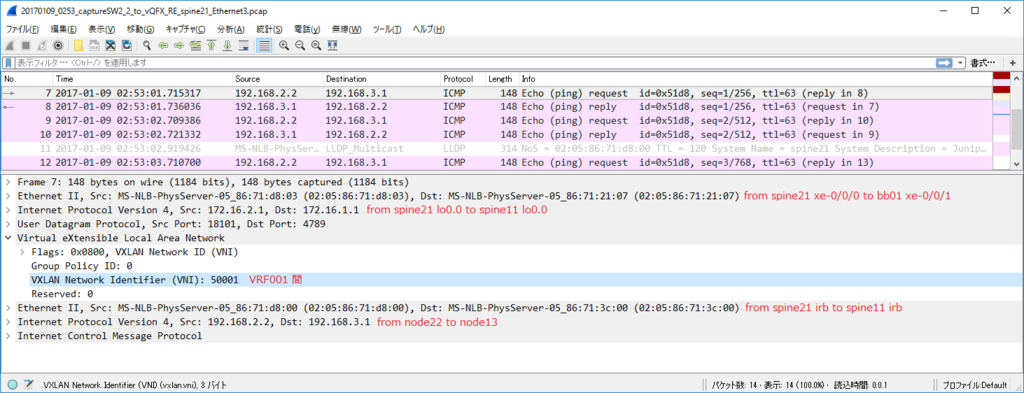
なお、ICMP Echo Reply も同じ感じです。
L2 over L3
node21(192.168.1.2/24) から node11(192.168.1.1/24) へ ping
これは前回と同様に、単純に VNI 10100 でカプセル化されて通信しているだけ。
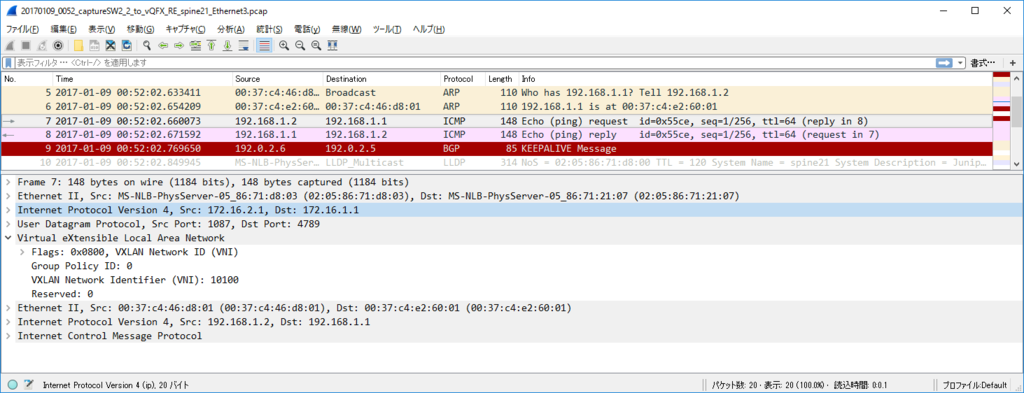
L3 往路 Symmetric 復路 Asymmetric
node11(192.168.1.1/24) から node22(192.168.2.2/24) へ ping
このケースが、どう動くのかイマイチ予測できなかったところです。
- 往路 node11 がゲートウェイIPアドレス(192.168.1.254) ARP 解決を試みる
- 往路 spine11 が node11 に 自身の irb MAC アドレスを答える (この時「自分が応答したので ARP request を VNI 10100 方面には転送しない」という動作になってくれるのか否かが予想できなかった & 確認したかった)
- 往路 spine11 は node11 からの Dst IP(192.168.2.2/24) な ICMP Echo request パケットを受信し、Type5 で得た情報に従い VNI 50001 でカプセル化して spine21 に投げる (Symmetric)
- 往路 spine21 は自分の irb direct 配下にいる node22 にフォワードするだけ
- 復路 node22 はゲートウェイIPアドレス(192.168.2.254)の ARP 解決をして、spine21 の irb MAC に ICMP Echo Reply 投げる
- 復路 spine21 は node22 からの Dst IP(192.168.1.1/24) な ICMP Echo Reply パケットを受信し、Type2 で得た情報に従い VNI 10100 でカプセル化して spine11 に投げる (Asymmetric)
- 復路 spine11 は自分の irb direct 配下にいる node11 にフォワードするだけ
という感じに予測して、行きと戻りの VNI が異なる論理的に非対称な通信でちゃんと成り立っているのか、っていうのと太字箇所を見ていきます。いやまあ疎通は確認済なんですが。
まず node11 で拾ったパケットを見ると...はい、上記の太字箇所は期待した動作になっていないですね。
spine11 と spine21 双方の irb から ARP Reply が来ていて(パケットNo.2と4)、たまたま node の仕様的に先に返ってきた spine11 側の MAC アドレスを使っていたに過ぎないようです。
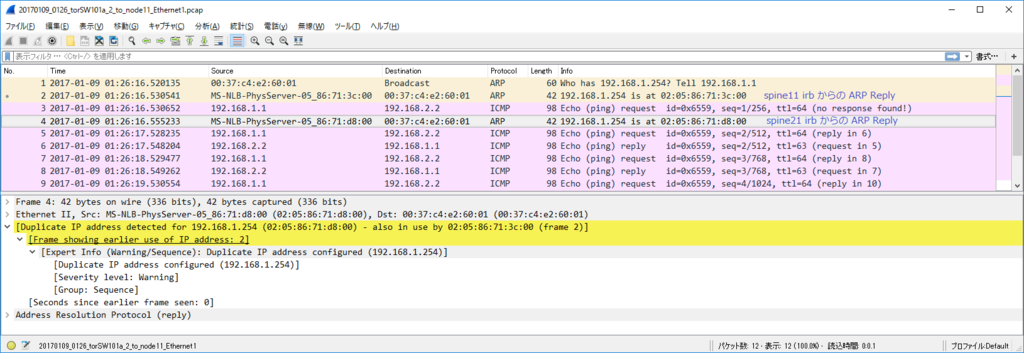
上記の動作を、今度は spine11 と bb01 間で拾ったパケットで追ってみます。
このパケットNo.16 が「自分が node11 に ARP Reply した直後、ARP Request を VNI 10100 で spine21 方面に Ingress Replication している」やつです。
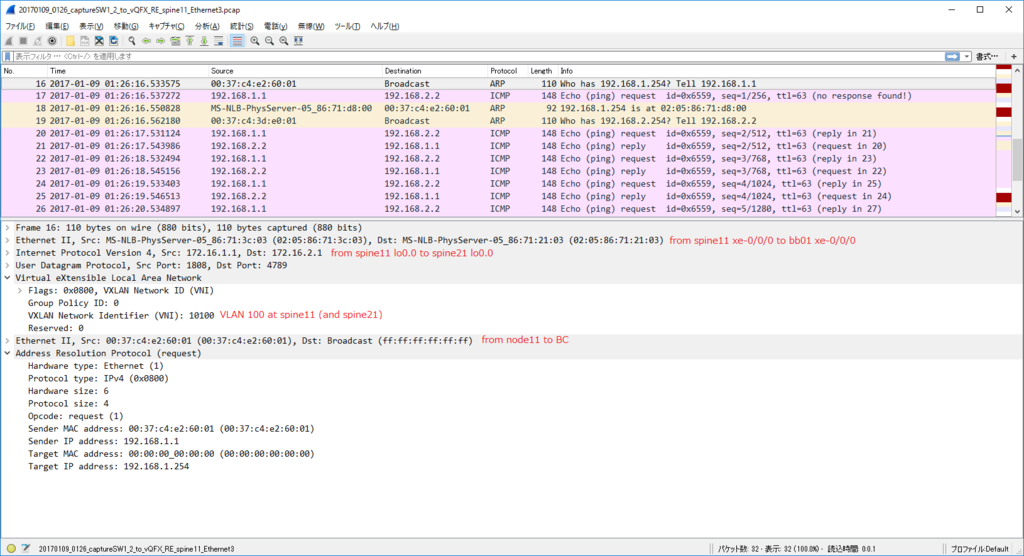
当然、spine21 側は通常通り ARP Reply を返してくれるし、それは先ほど node11 側で見た通り node11 にも伝搬されます。
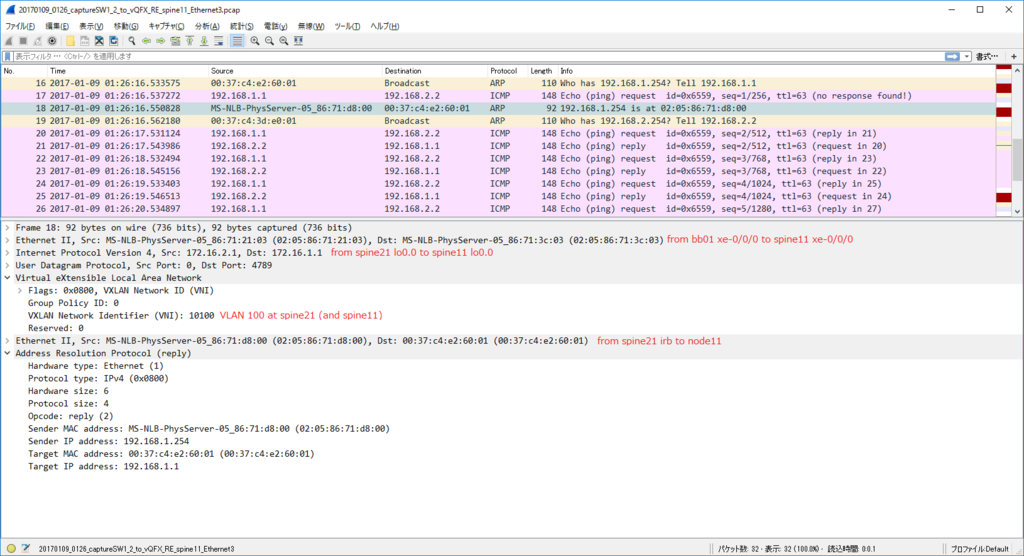
ということで、ARP Request に対する Reply の動作確認は、自分が期待していたのと違う動きのようです。
構成や設定でどうにか巧いことならないか...ってところは深追いしていません。
(試しに spine[12]1 双方で set interfaces irb unit 100 mac 00:00:5e:00:53:99 とか virtual-gateway-address とか設定して同じ MAC アドレスを持たせてみたりはしましたが...それでも通信は可能だけれど、特に代表動作とかをしないIP/MAC重複状態なので、健全な状態とは言えないかと。)
あ、往路 VNI 50001, 復路 VNI 10100 に関しては、想定通りの動きでした。
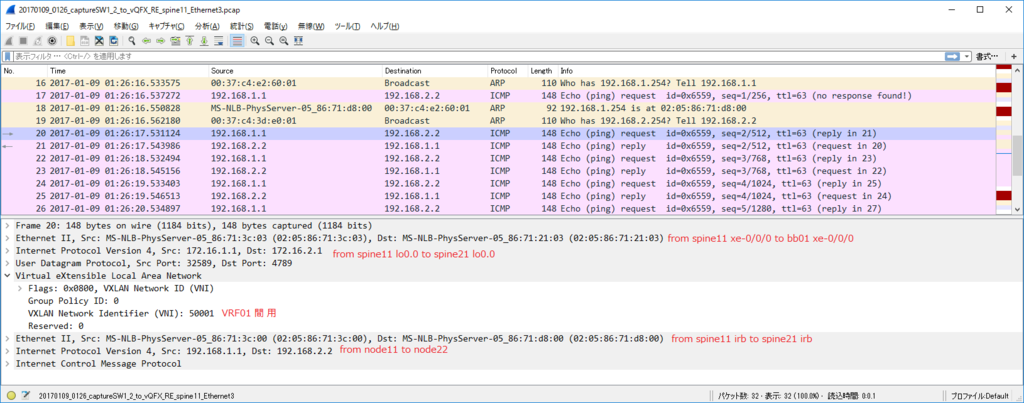
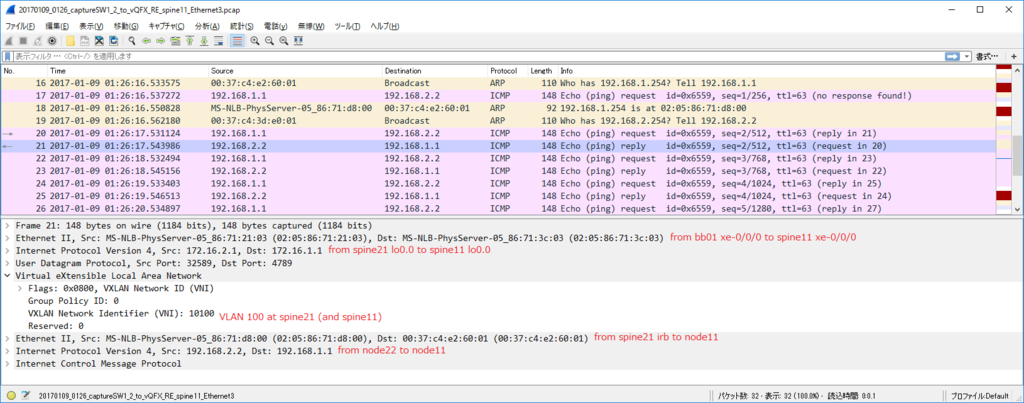
パケットキャプチャ(ControlPlane)
EVPN NLRI Type5 の UPDATE と WithDrawn を軽く見ておきます。
まずは WithDrawn を spine21 から吐かせた時(雑に deactivate routing-instance VRF001 とかで)
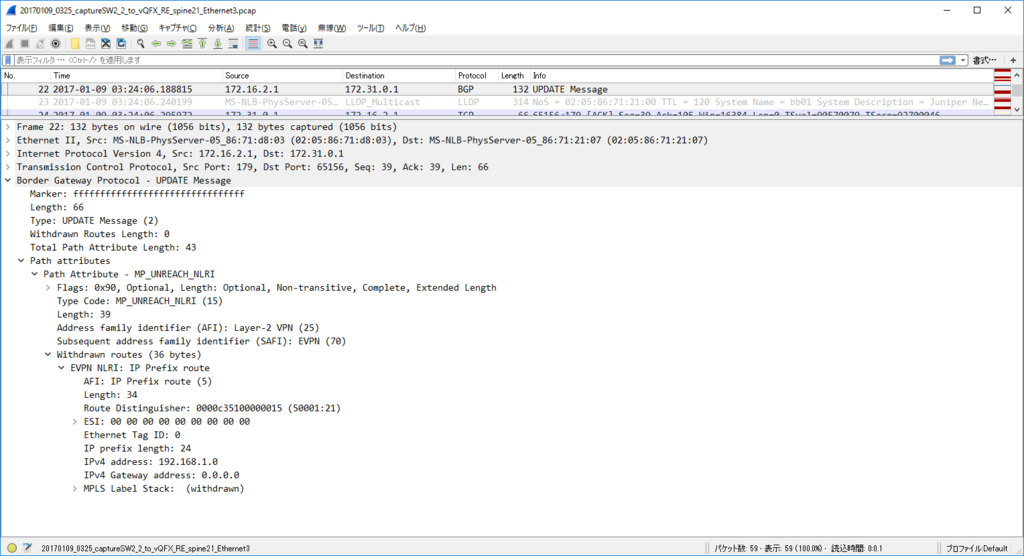
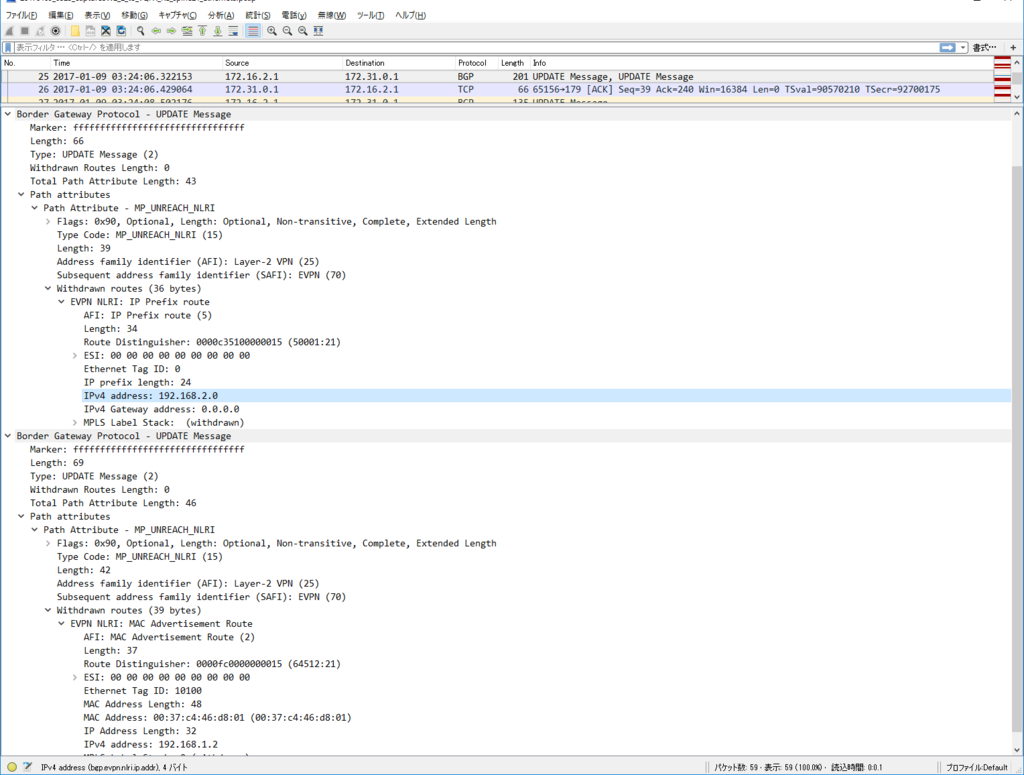
UPDATE を spine21 から吐かせた時(雑に rollback 1 とかで)
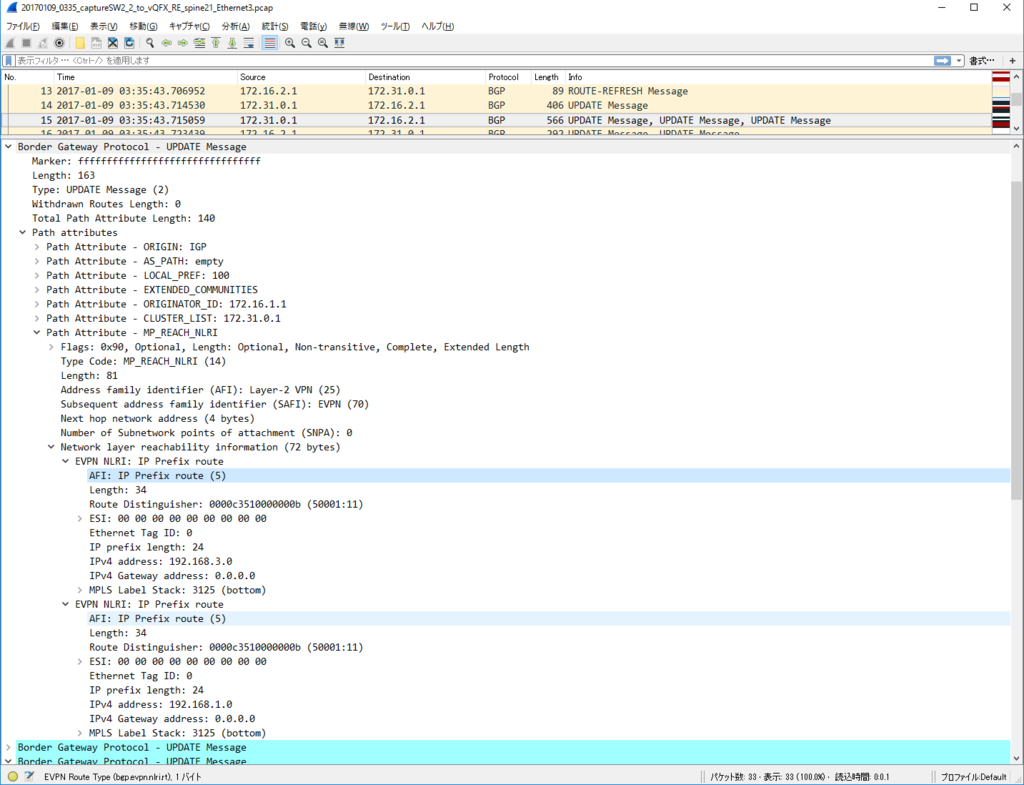
おしまい
- Juniper vQFX10000 でも EVPN NLRI Type5 が動くことを確認できました
- VRF to VRF 動作と L2VPN を併用する場合、何らかの工夫が必要そうだということは分かりました
- 「L3 往路 Symmetric 復路 Asymmetric」の項でウダウダ書いた通り
- そもそも MX を使って MAC VRF 使う、のが常道なのかもしれませんが